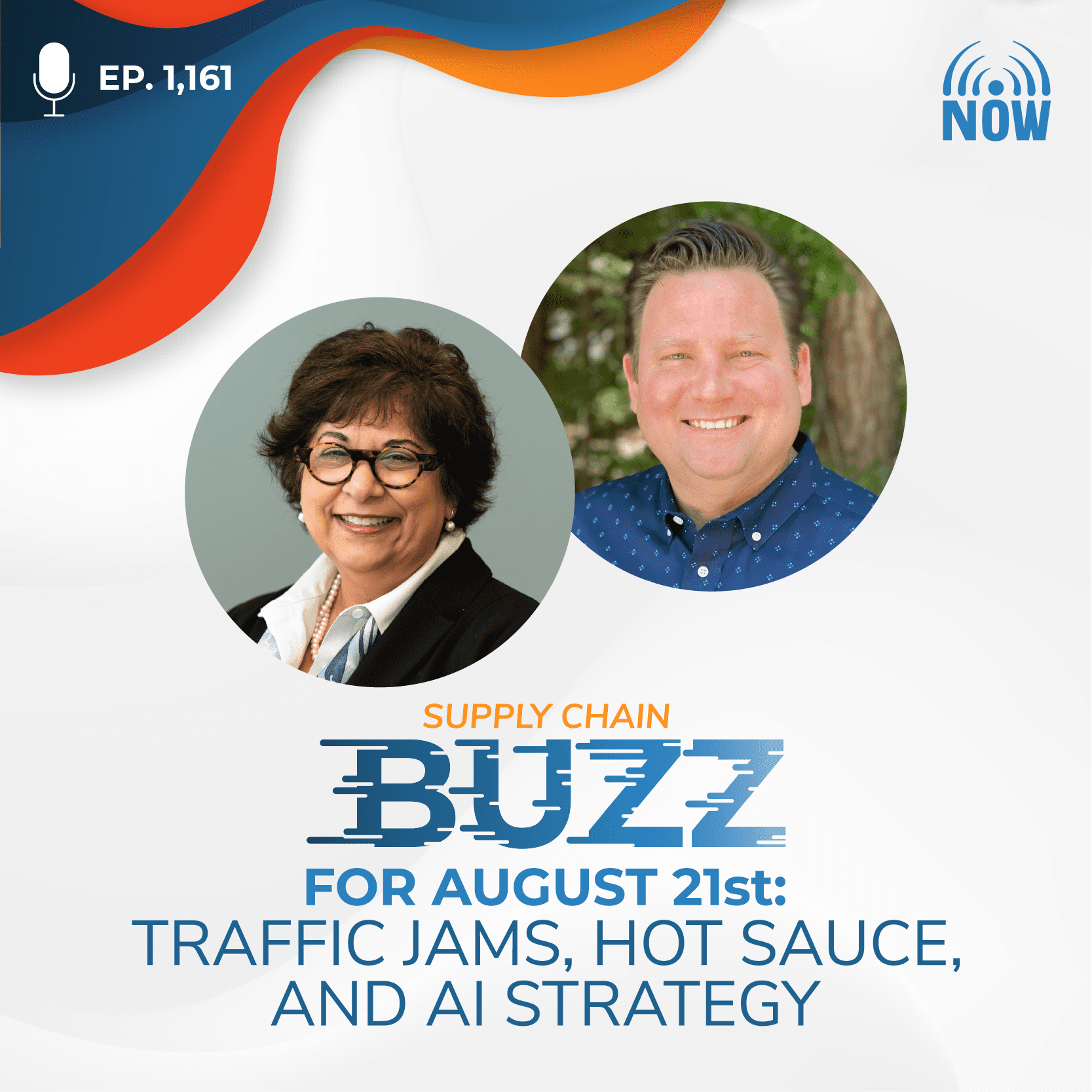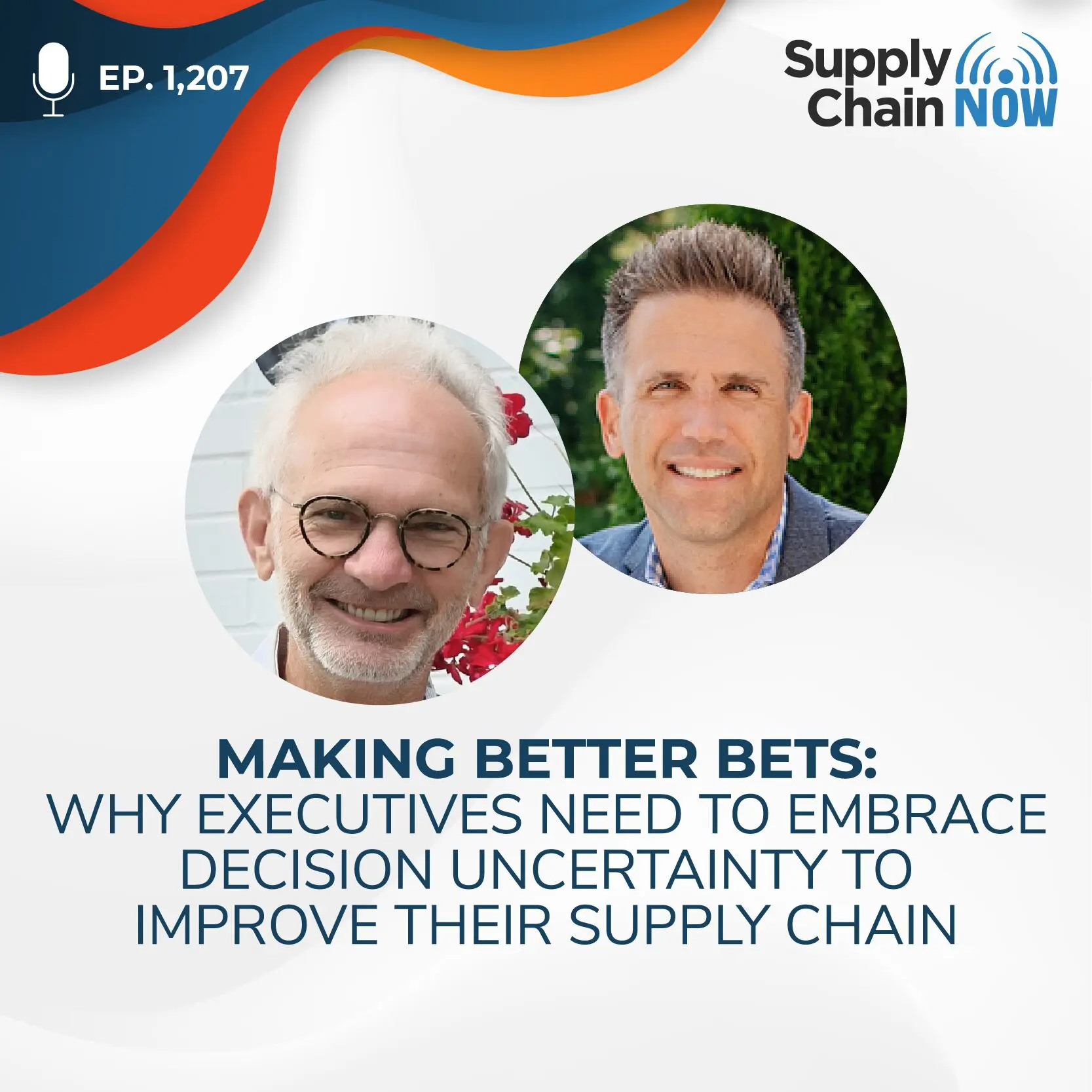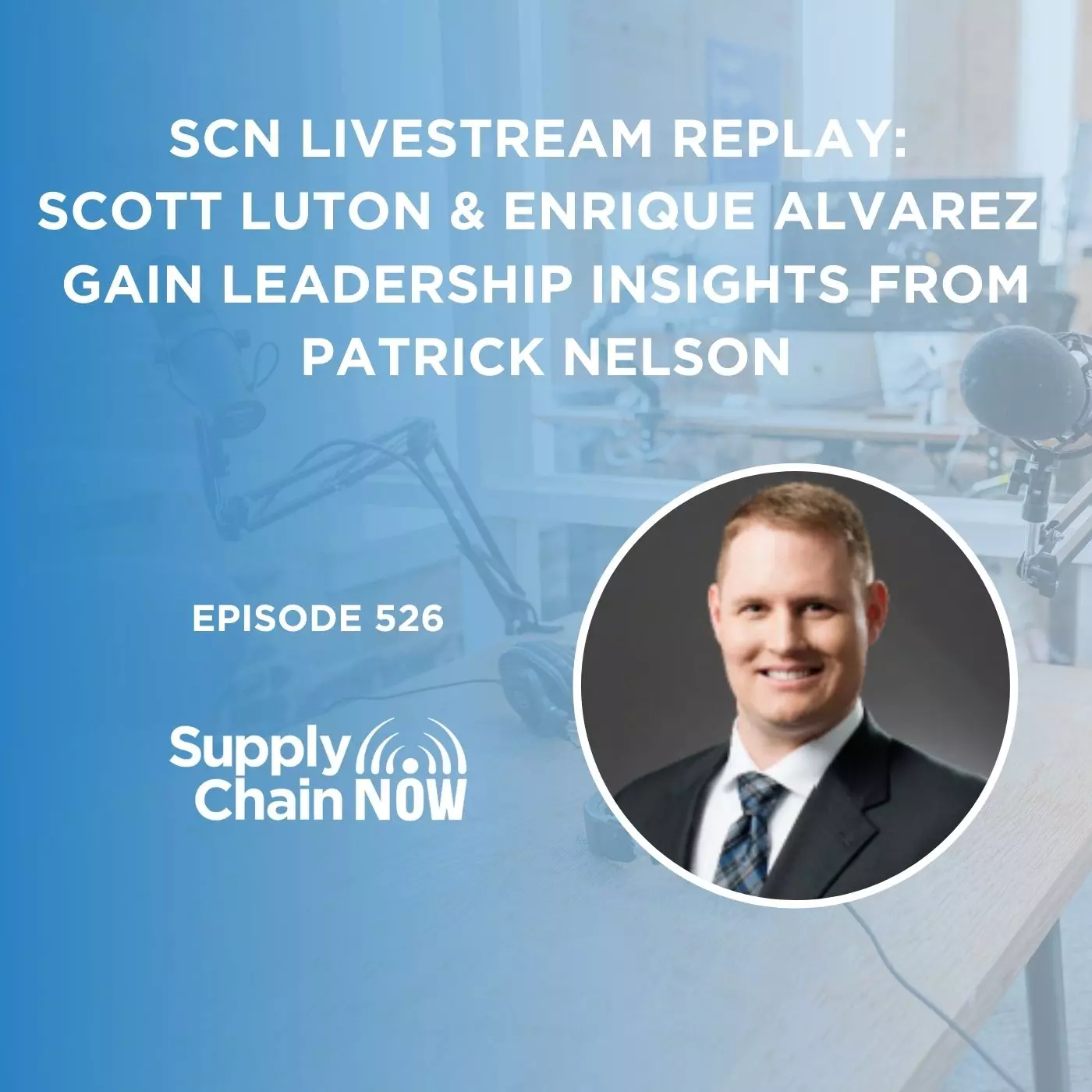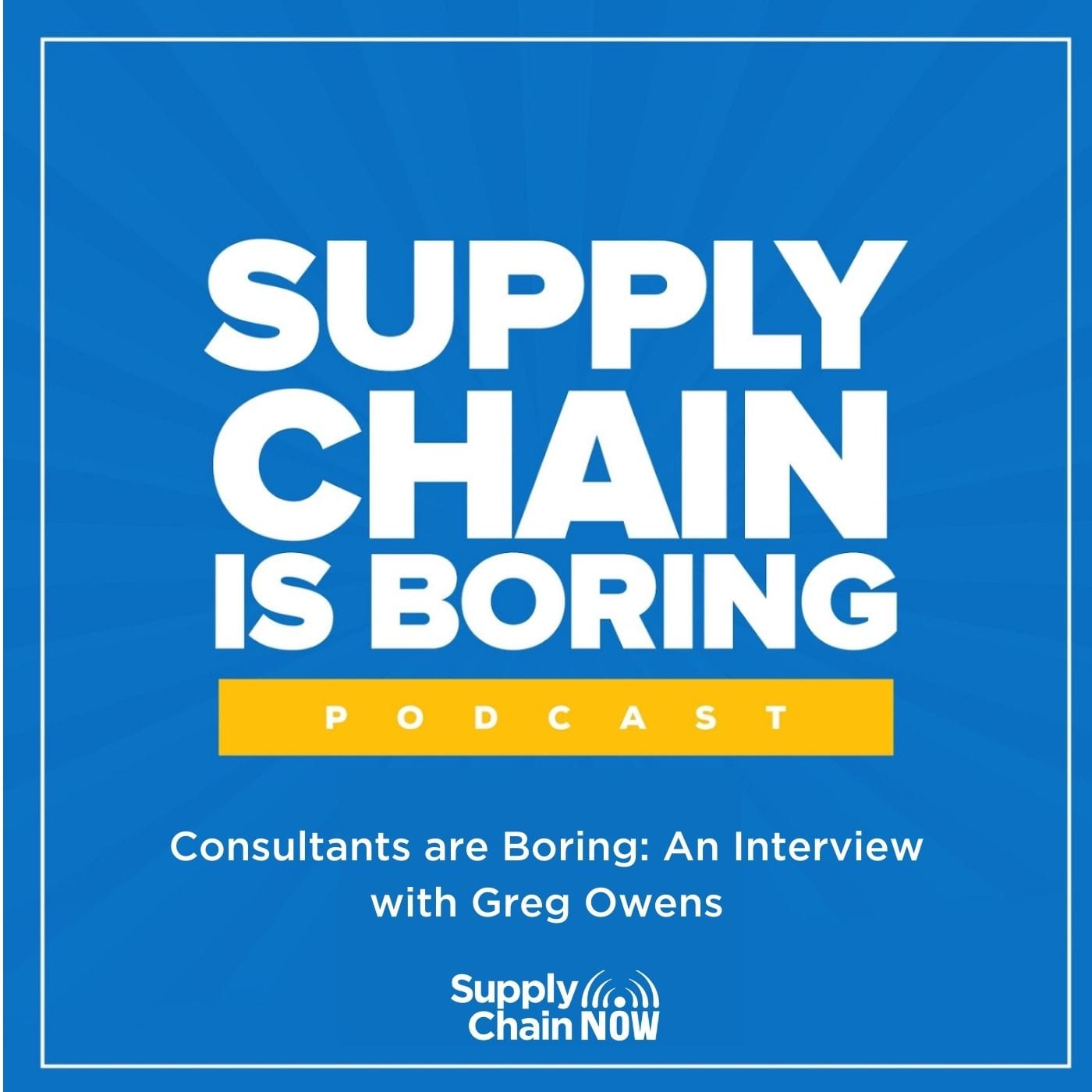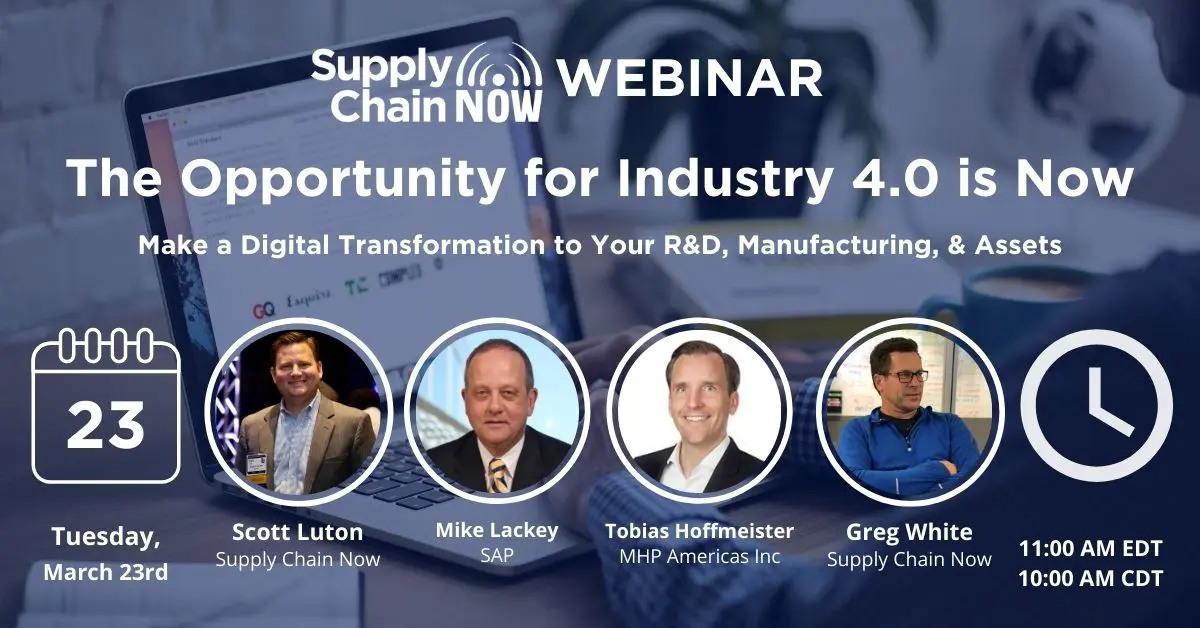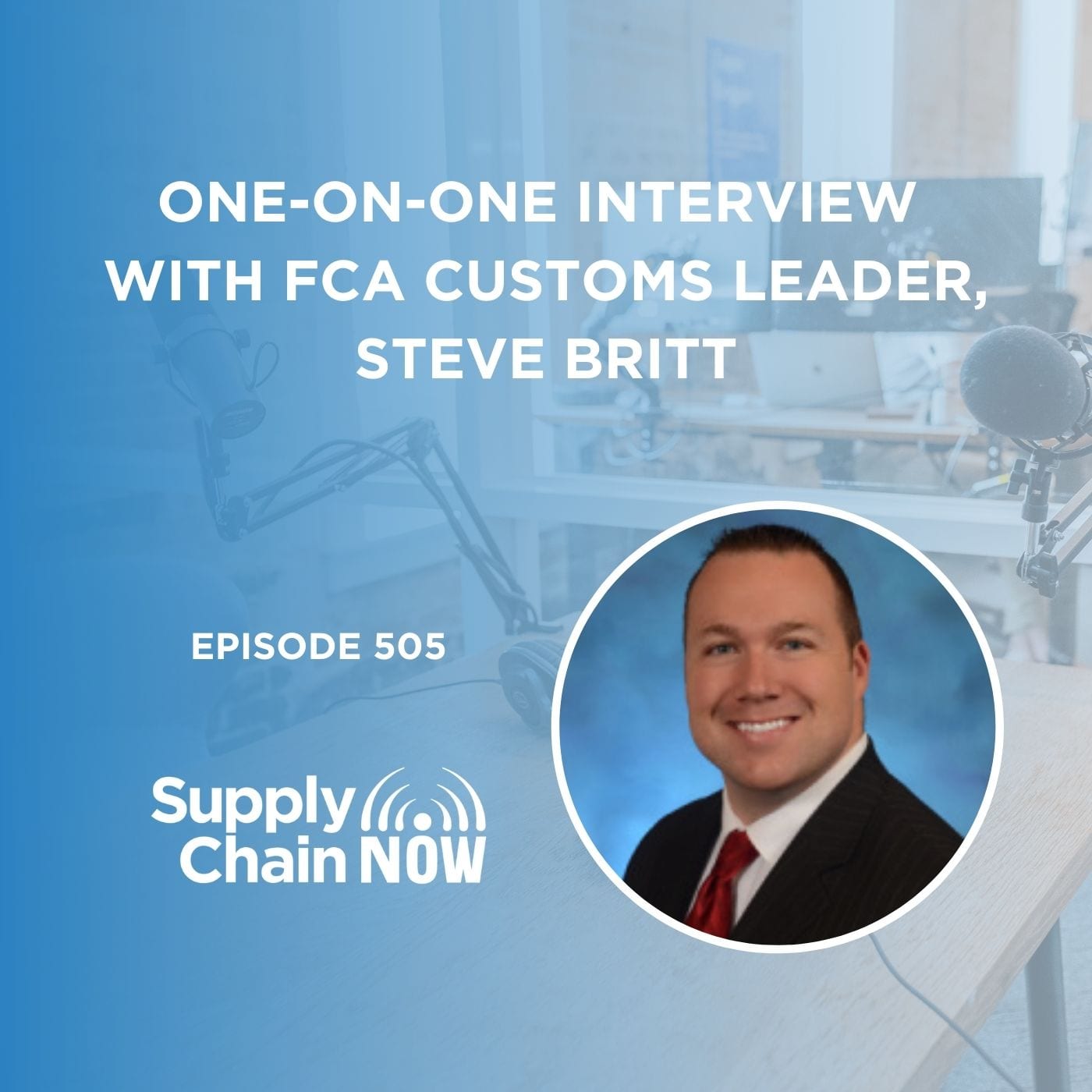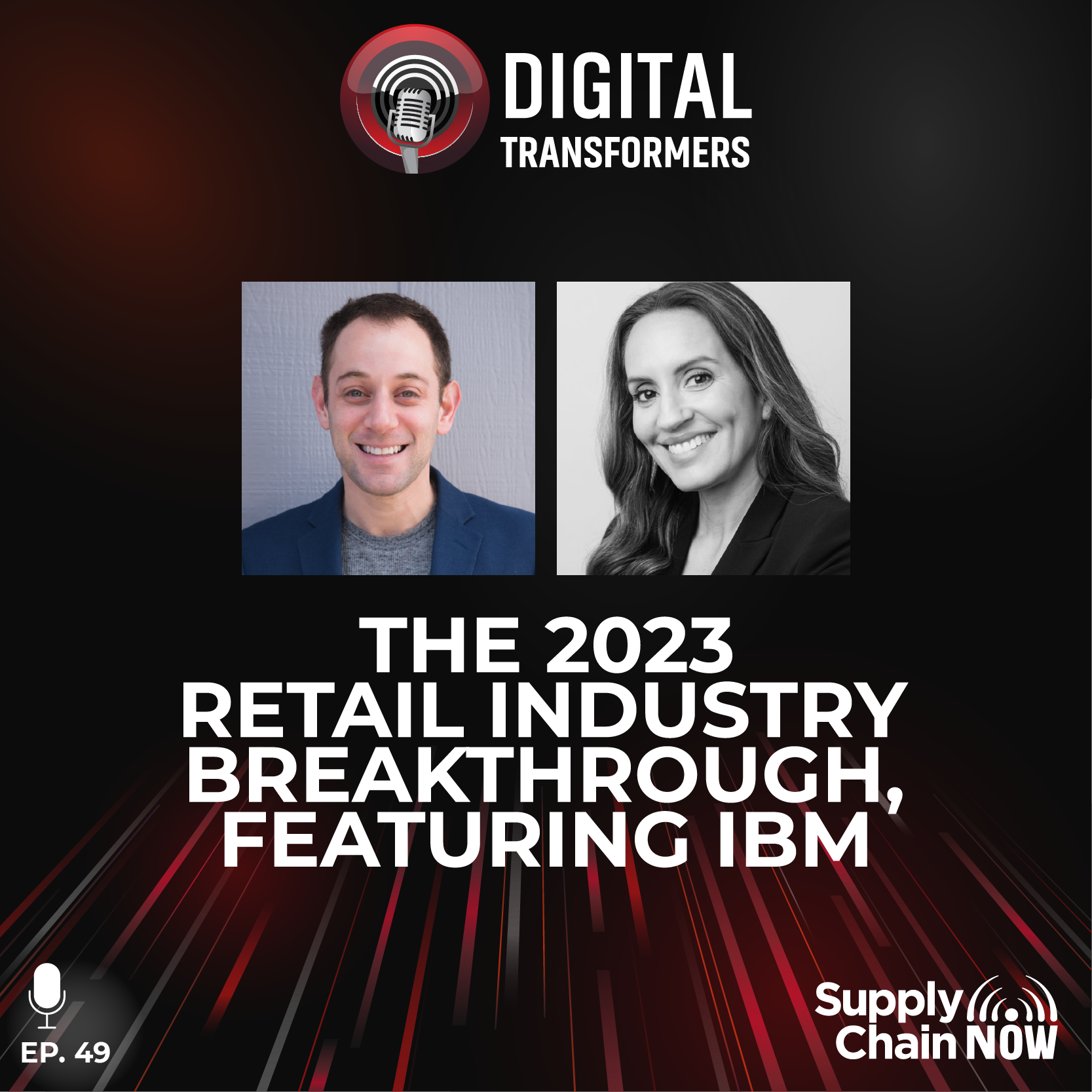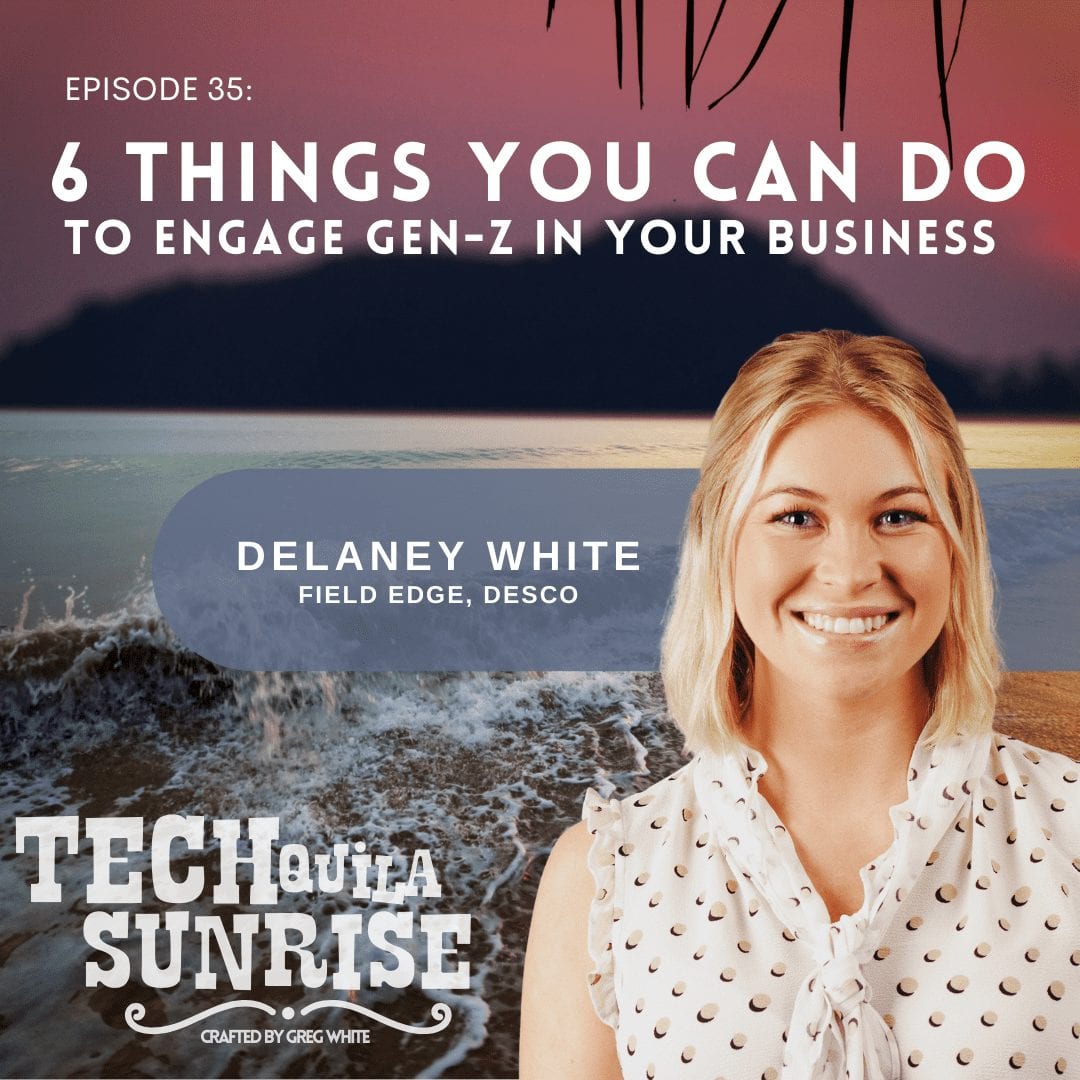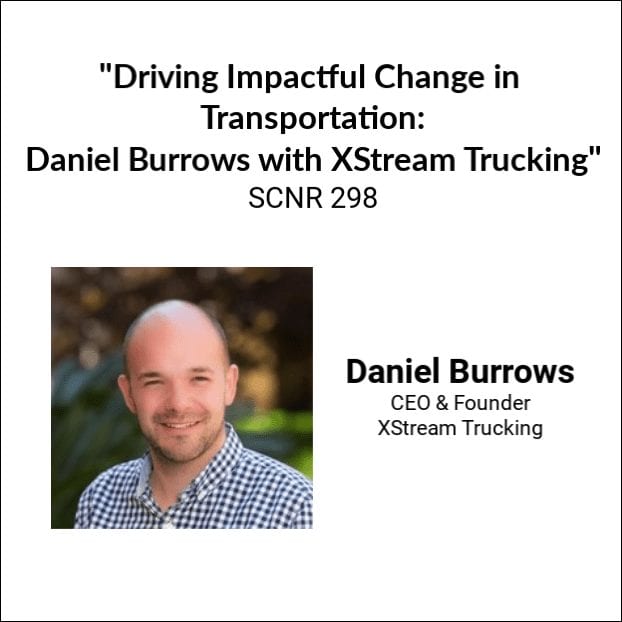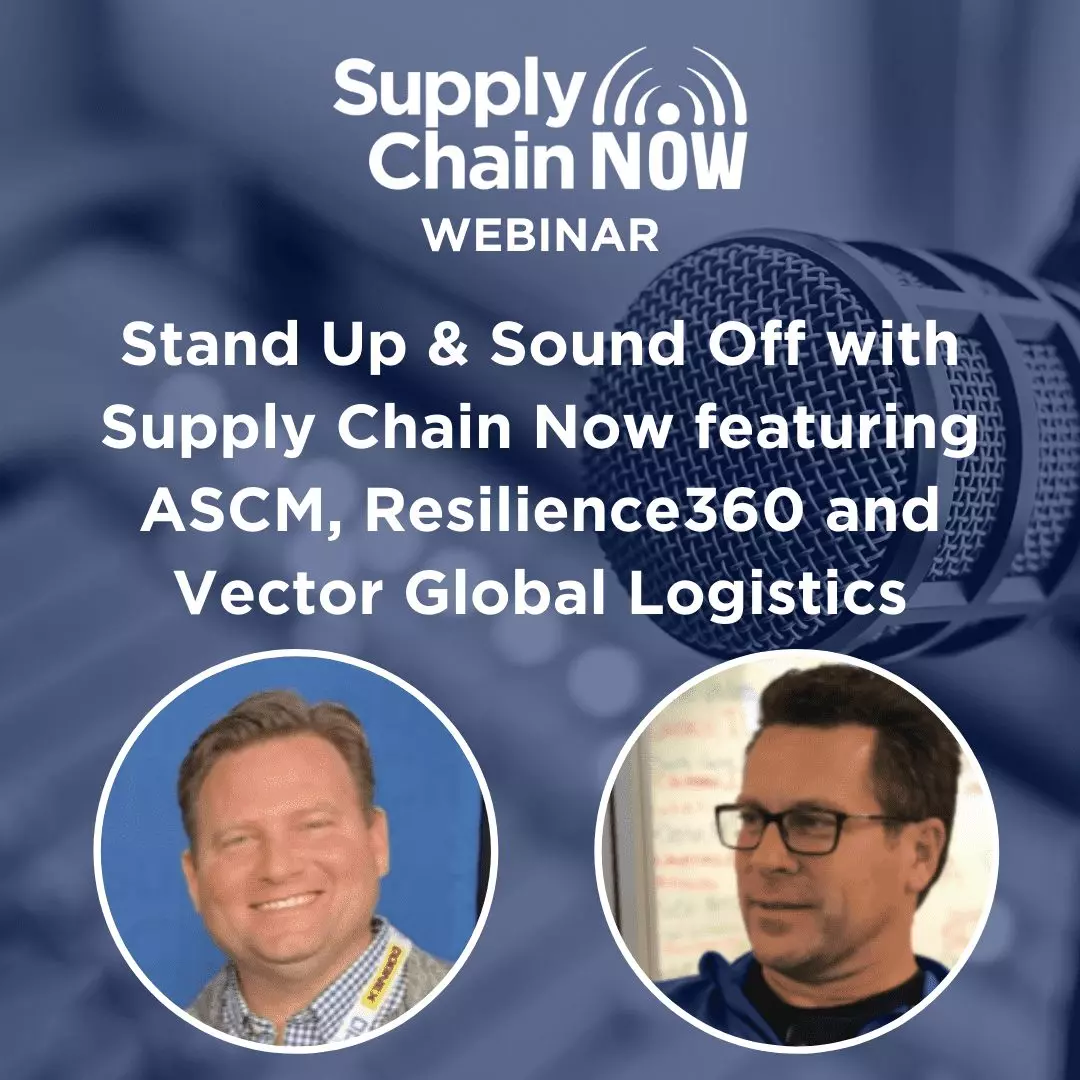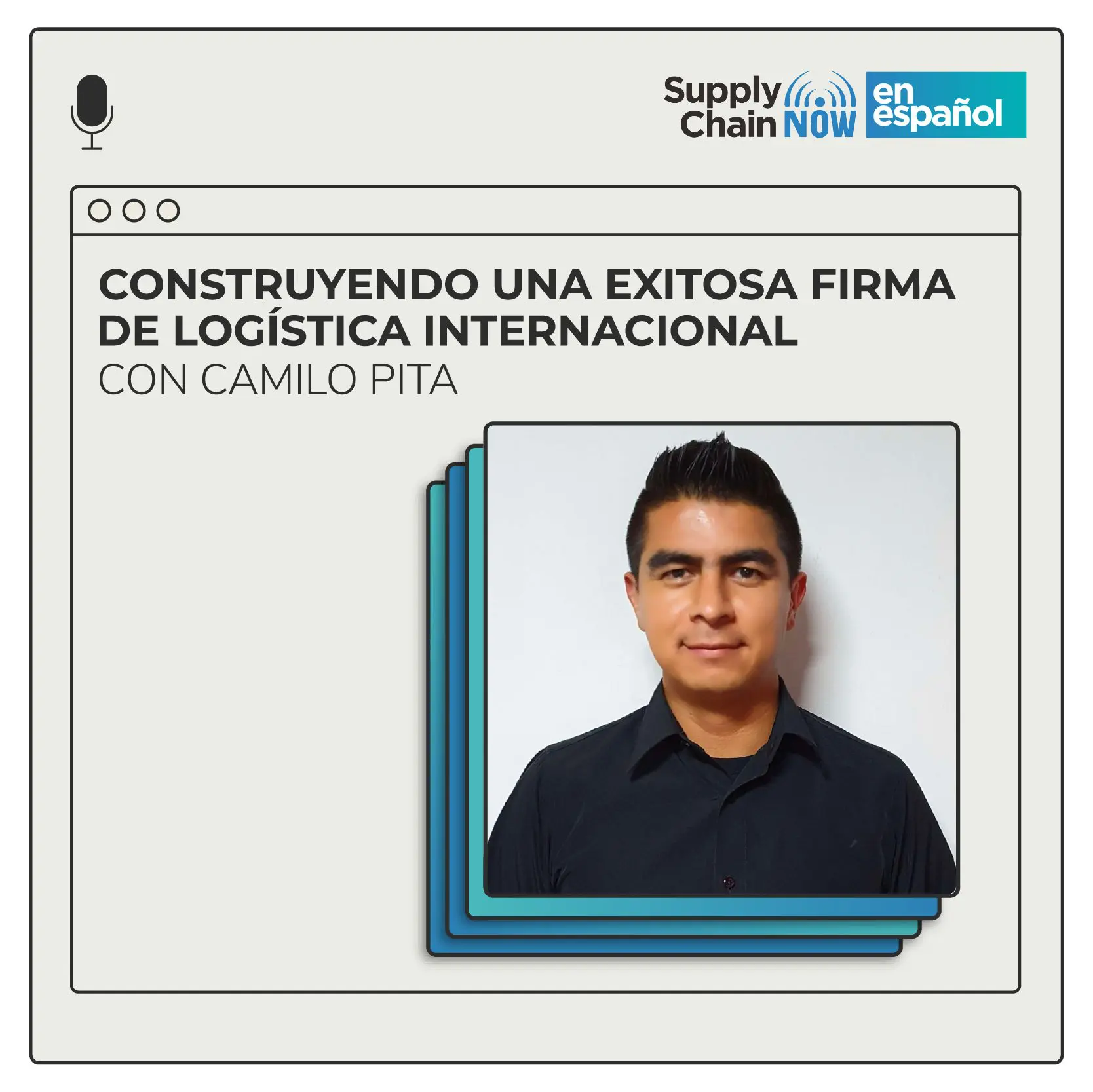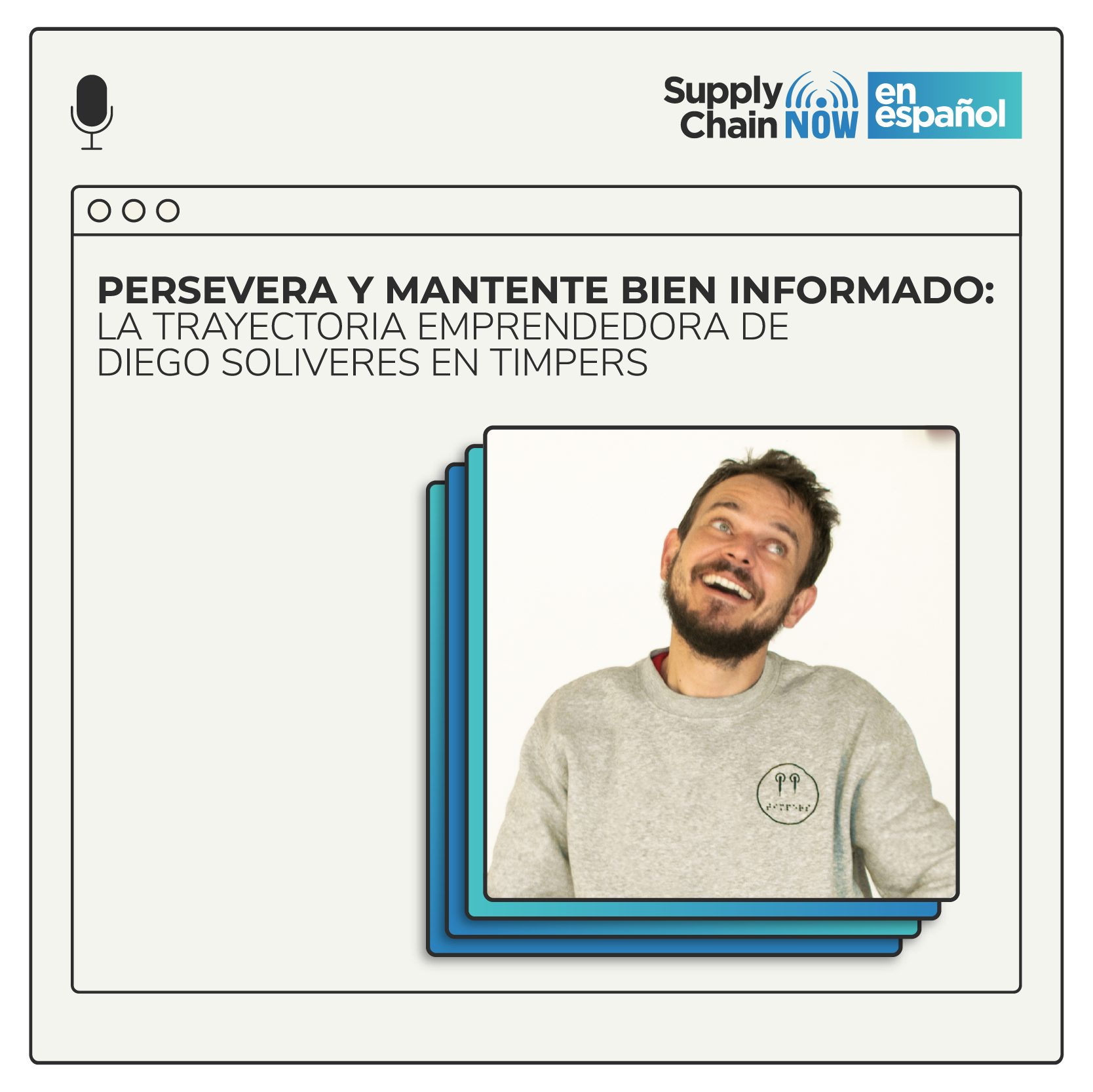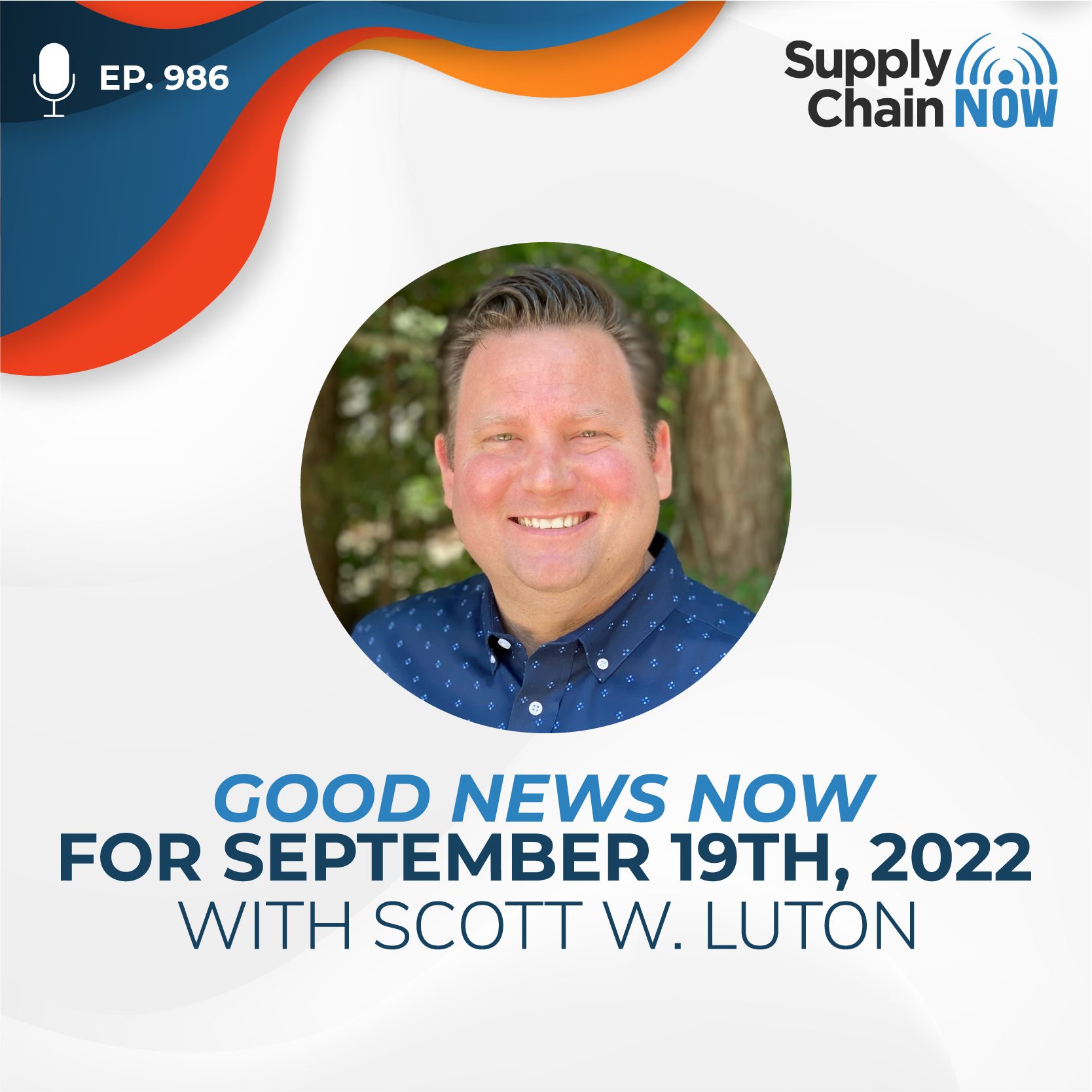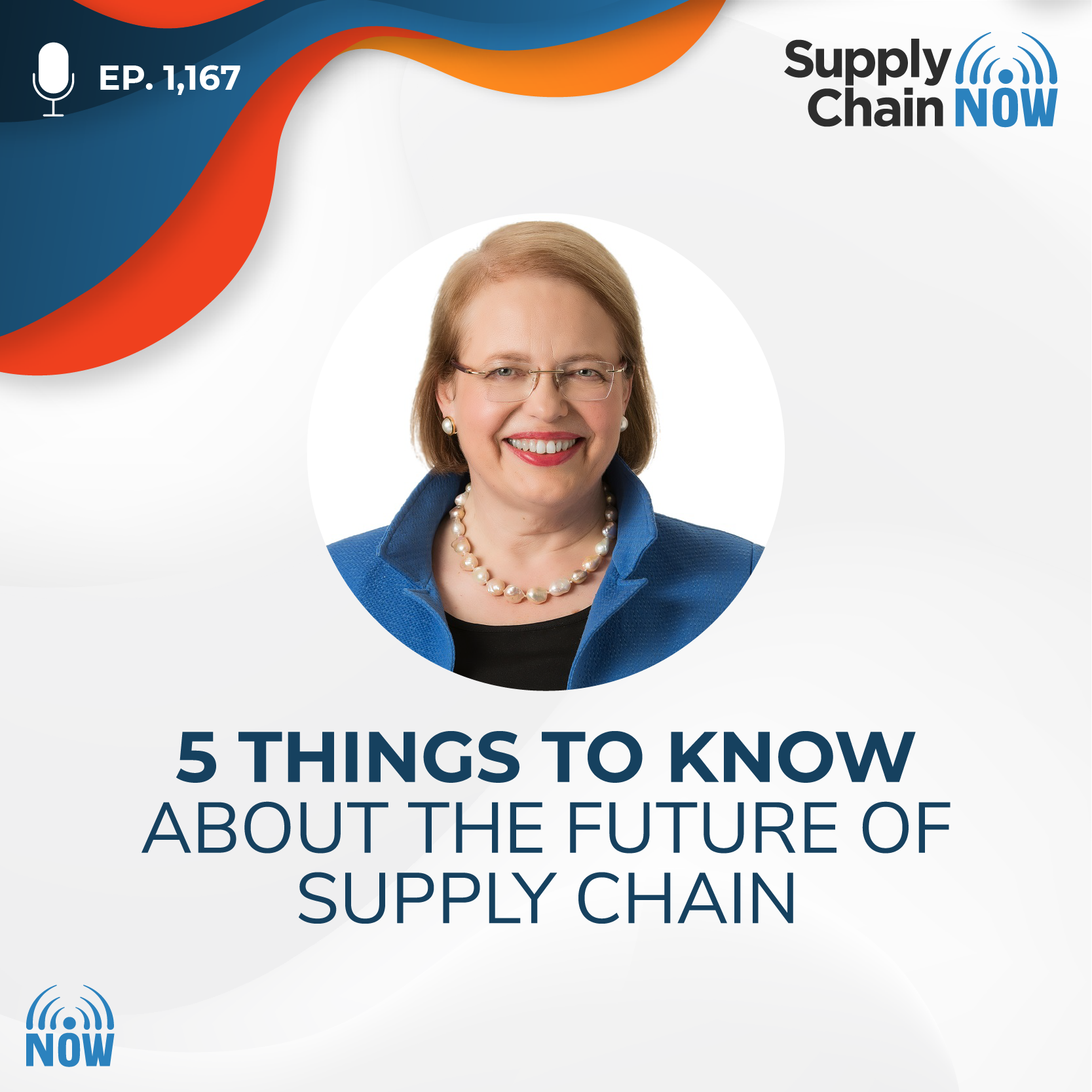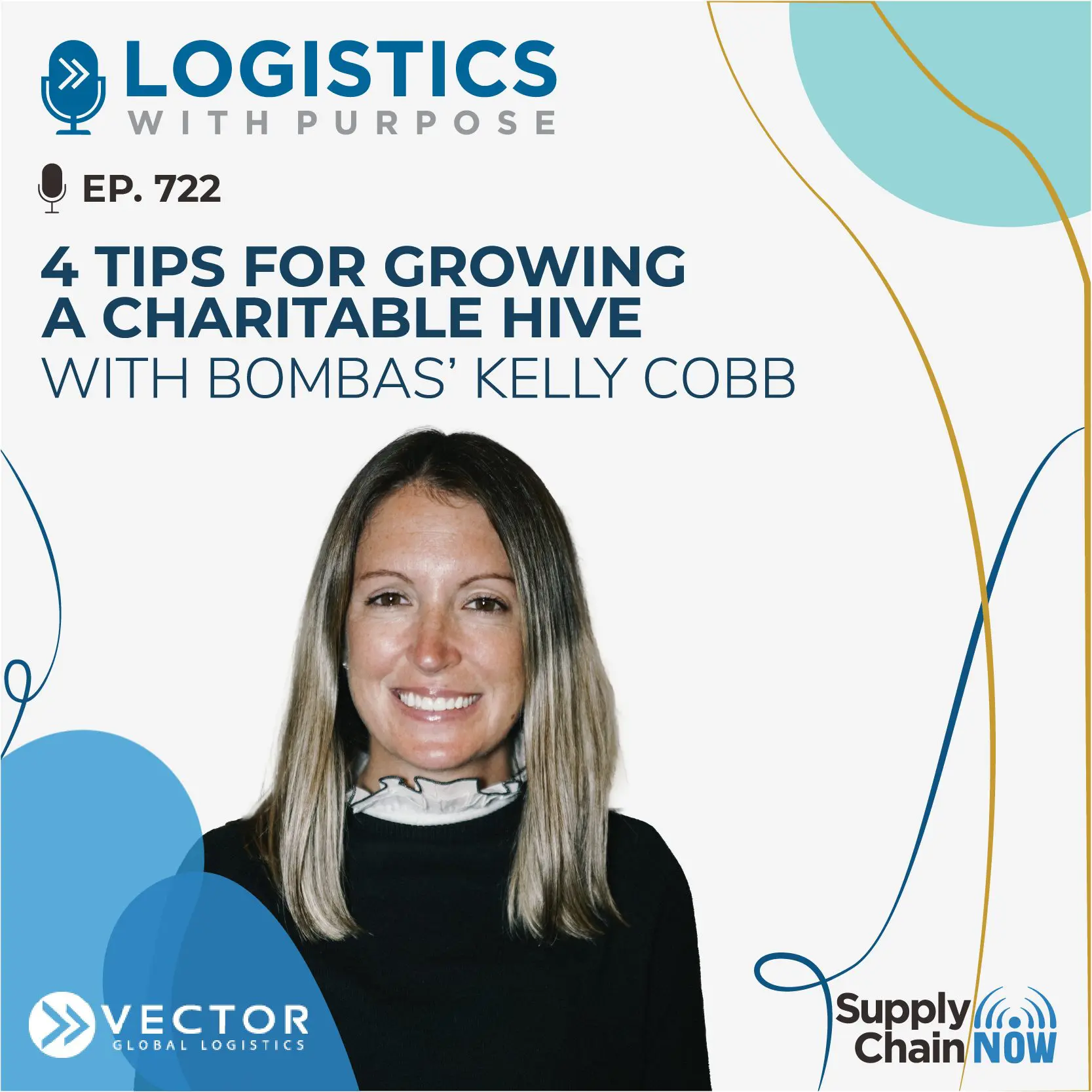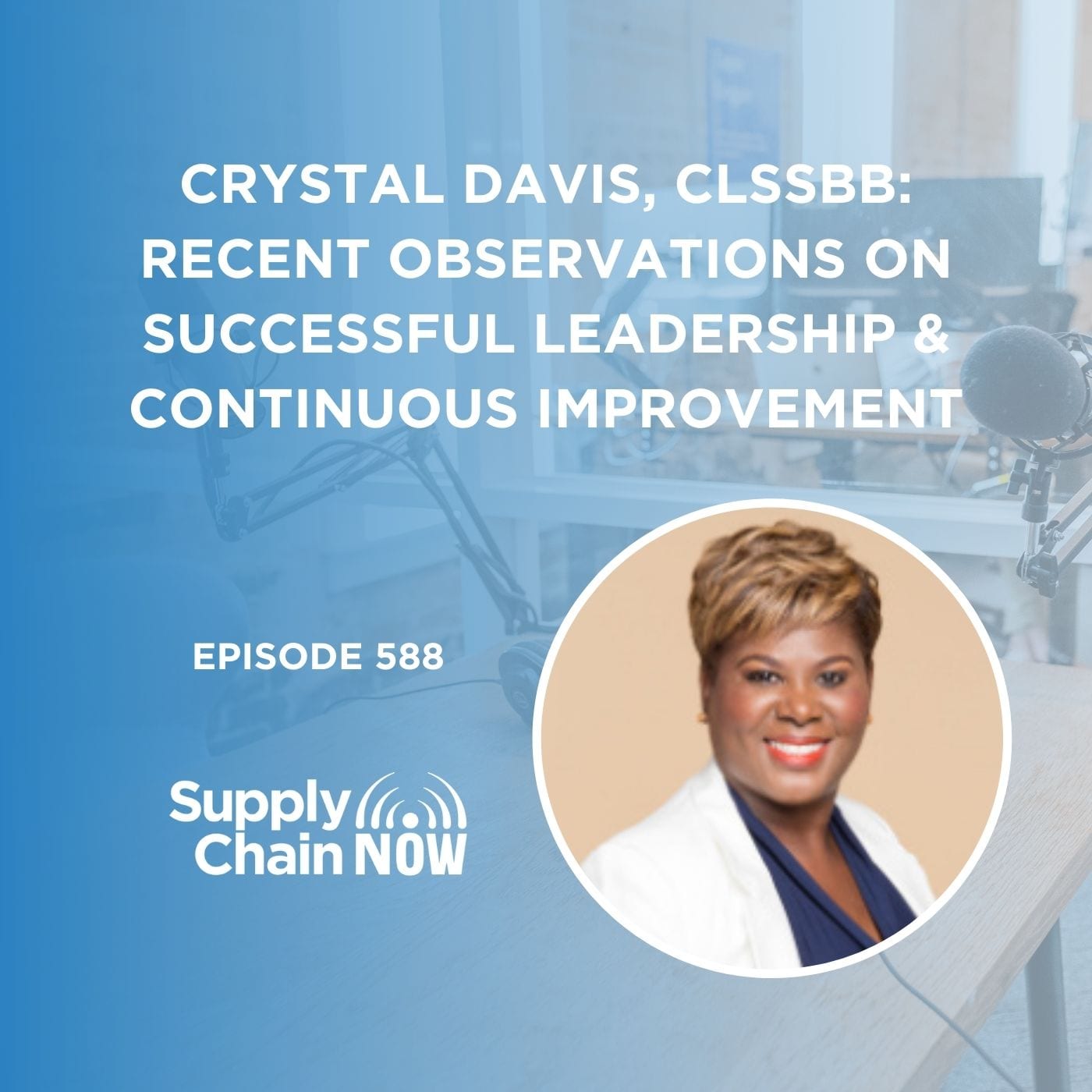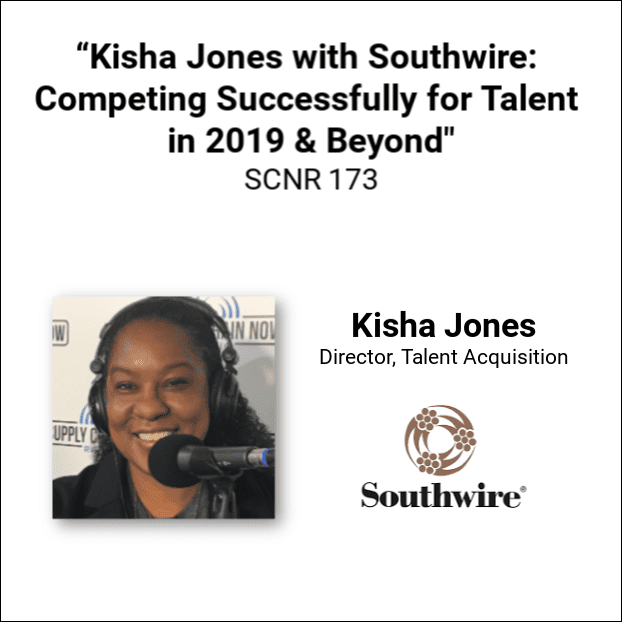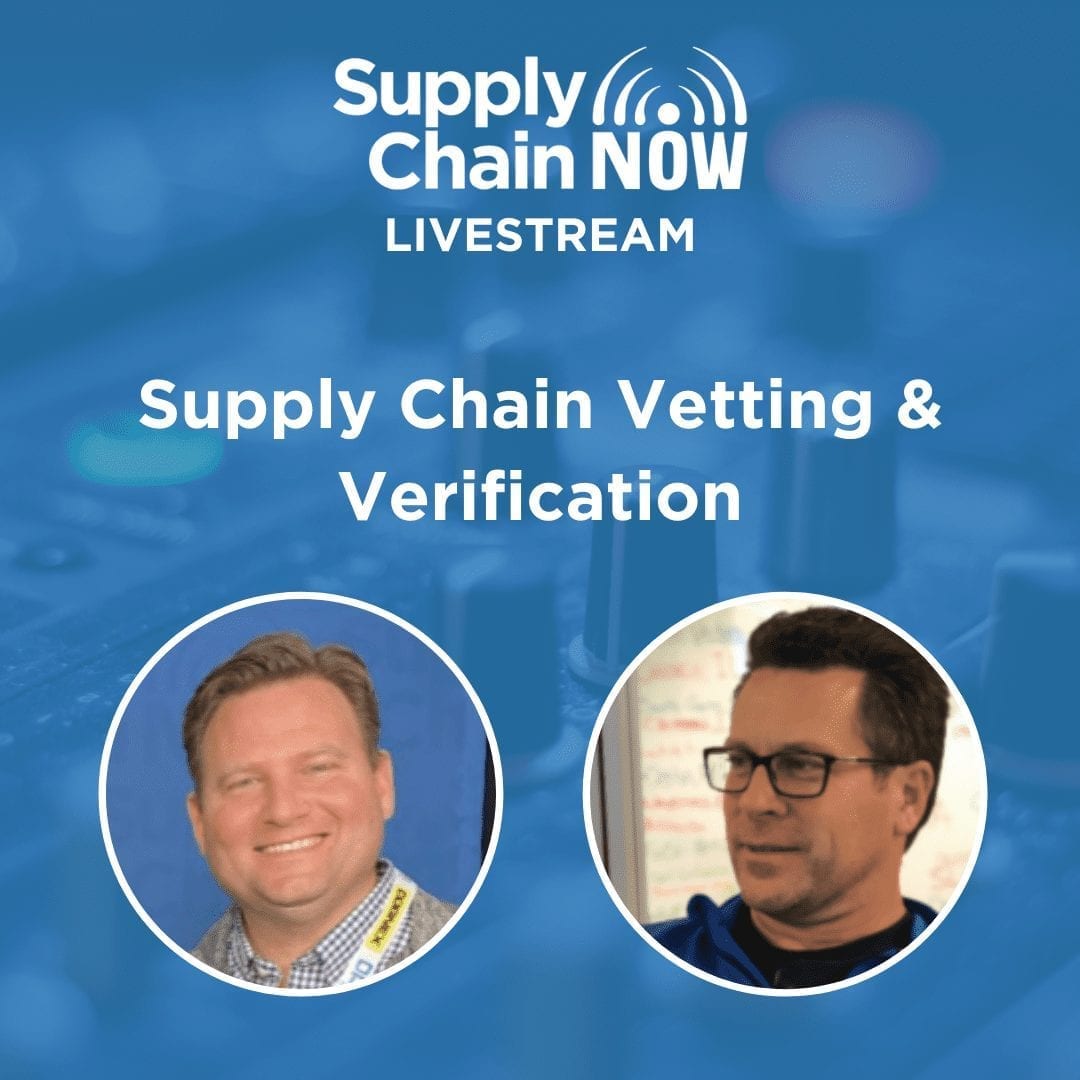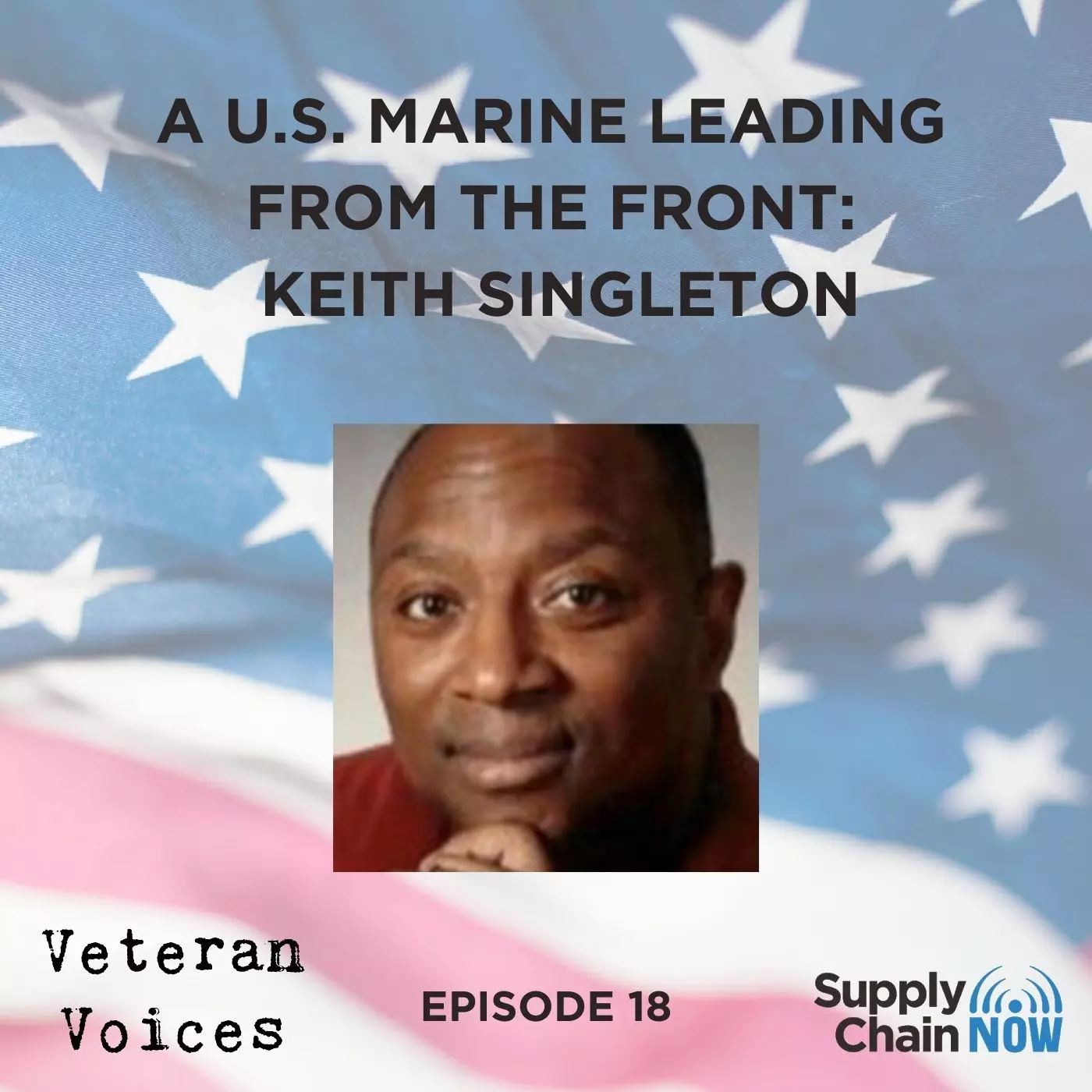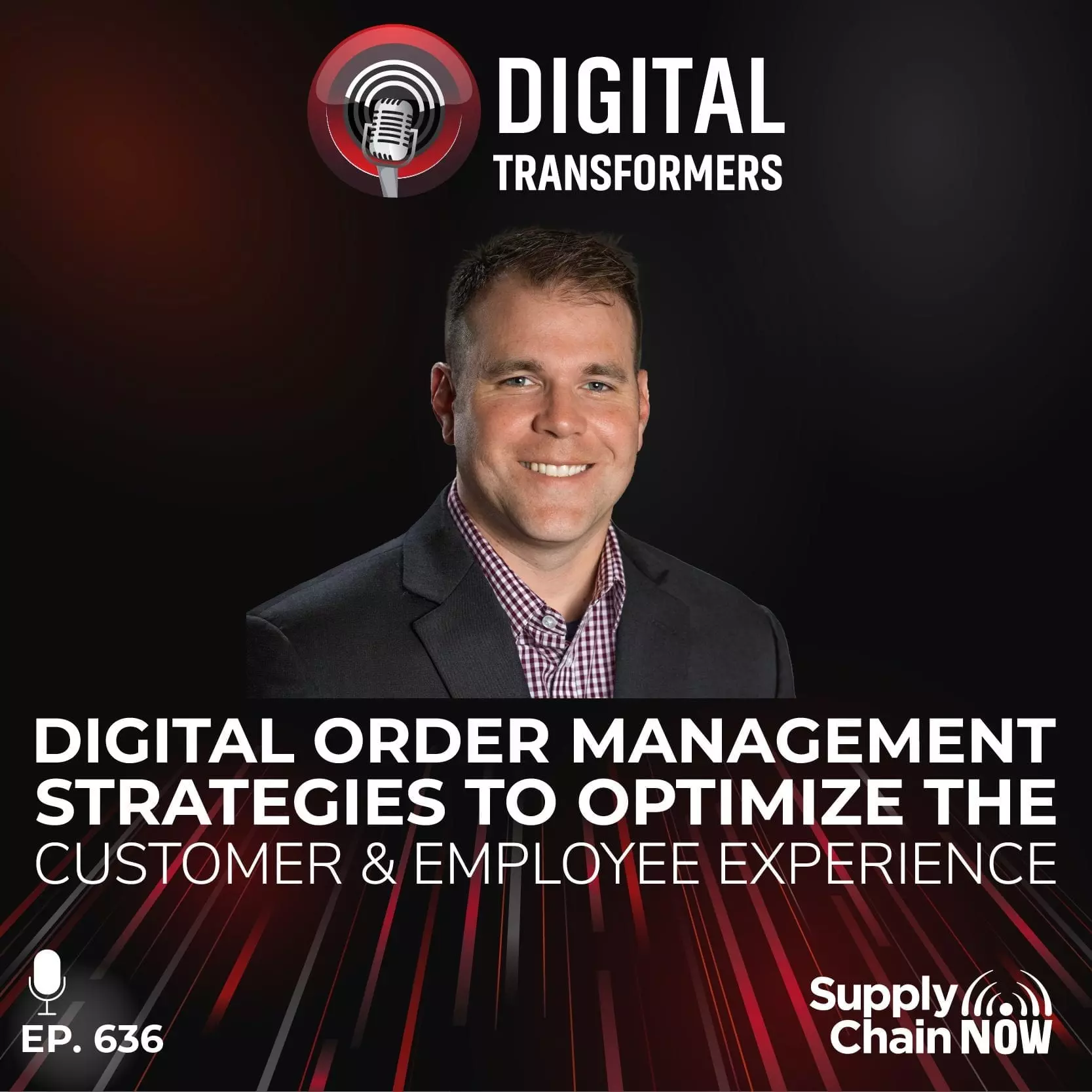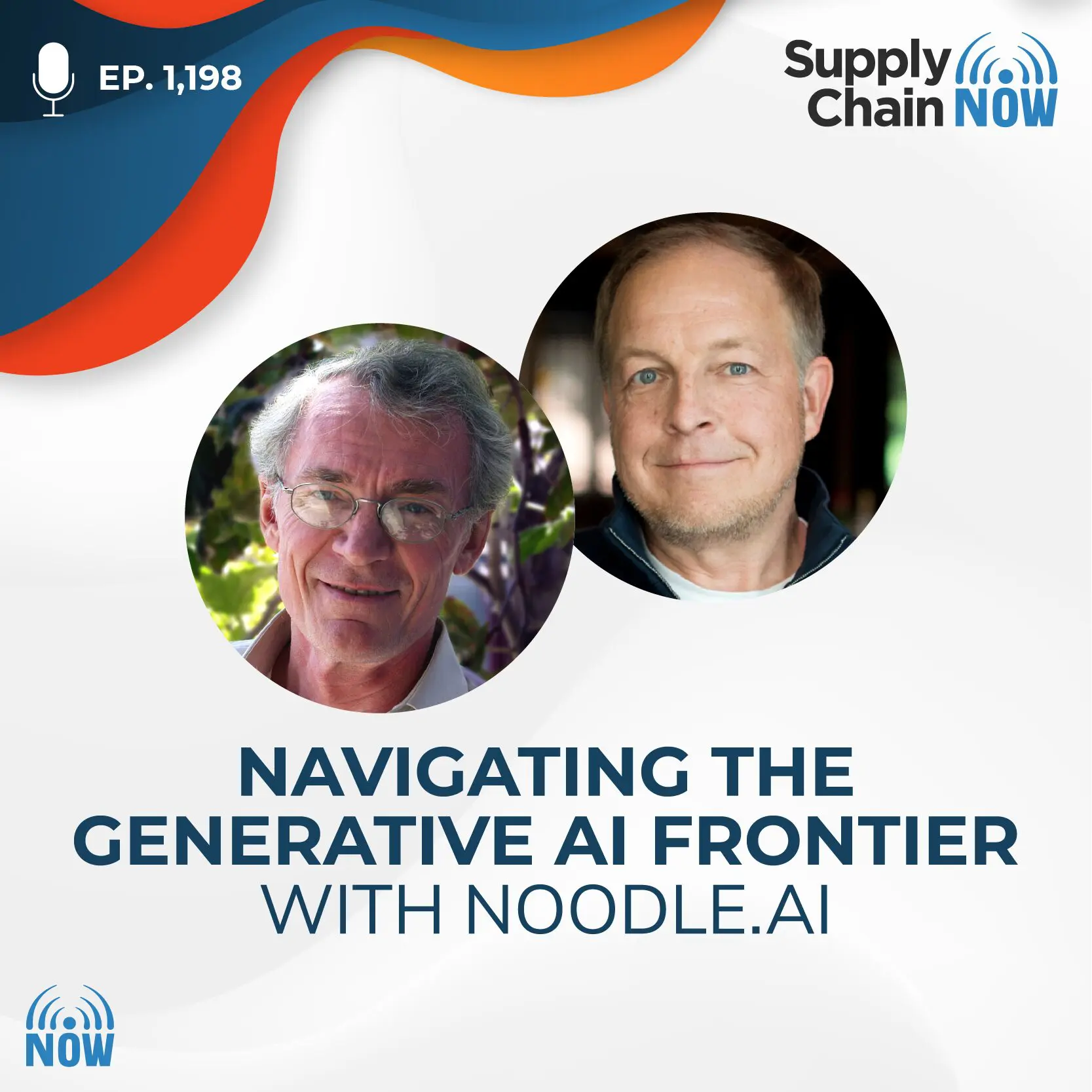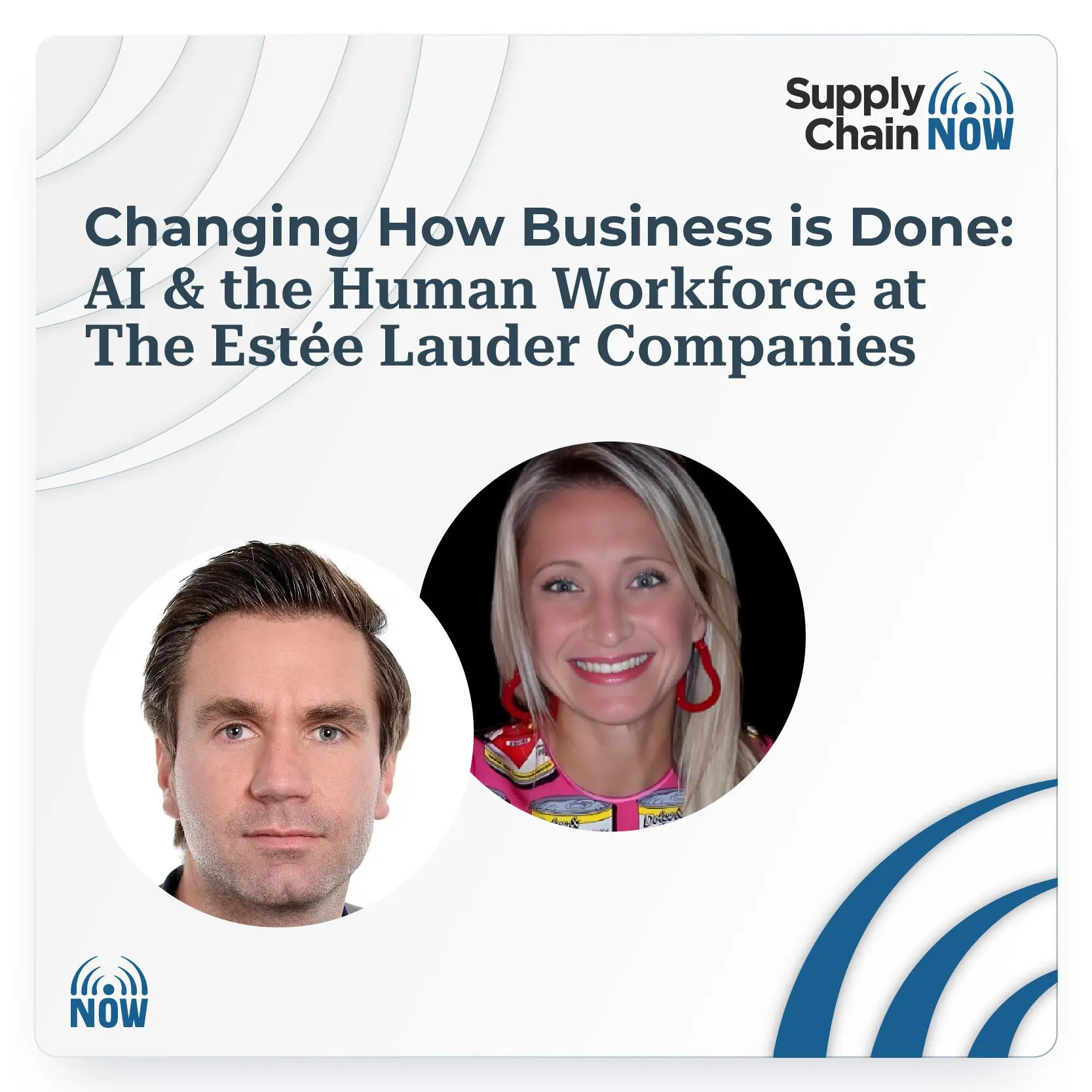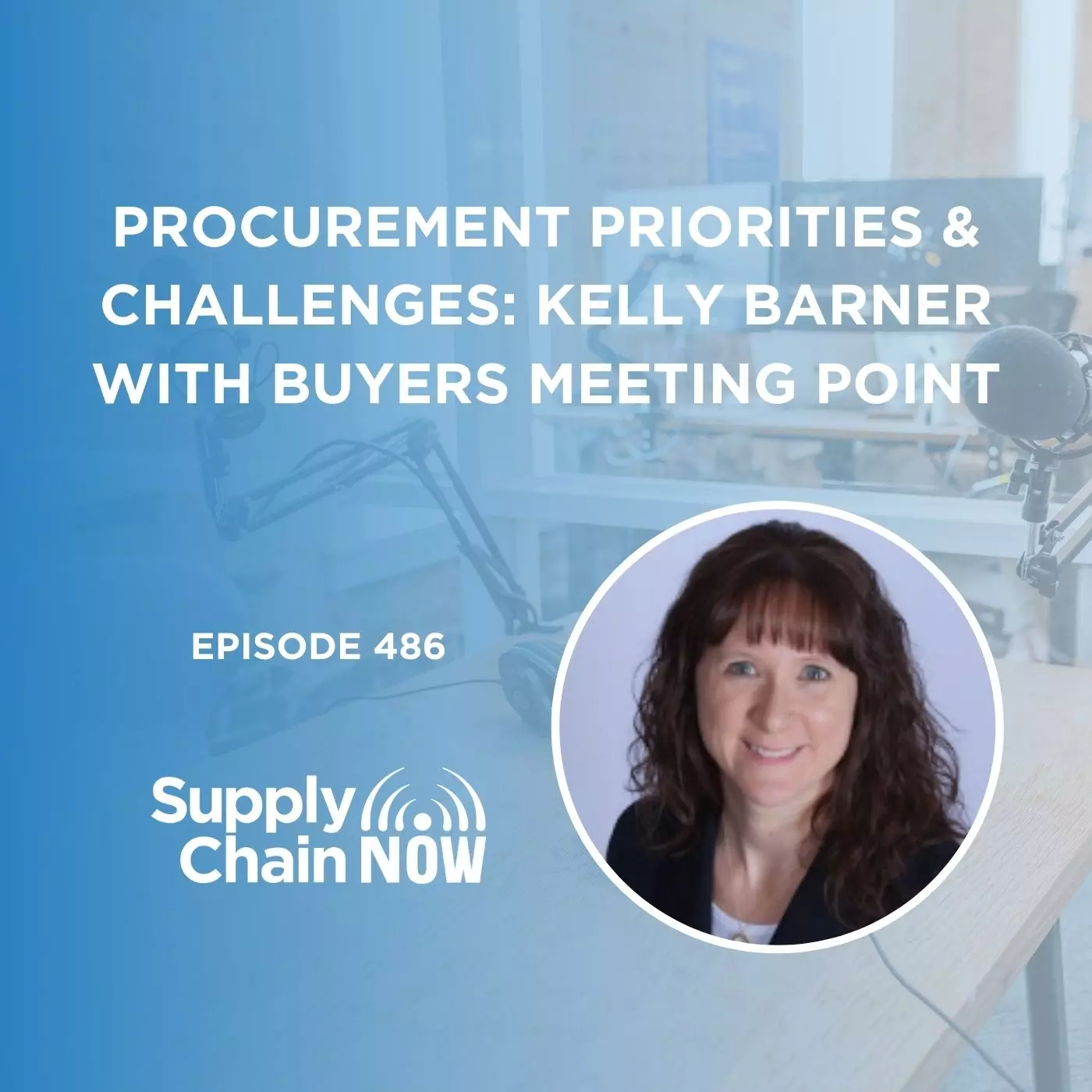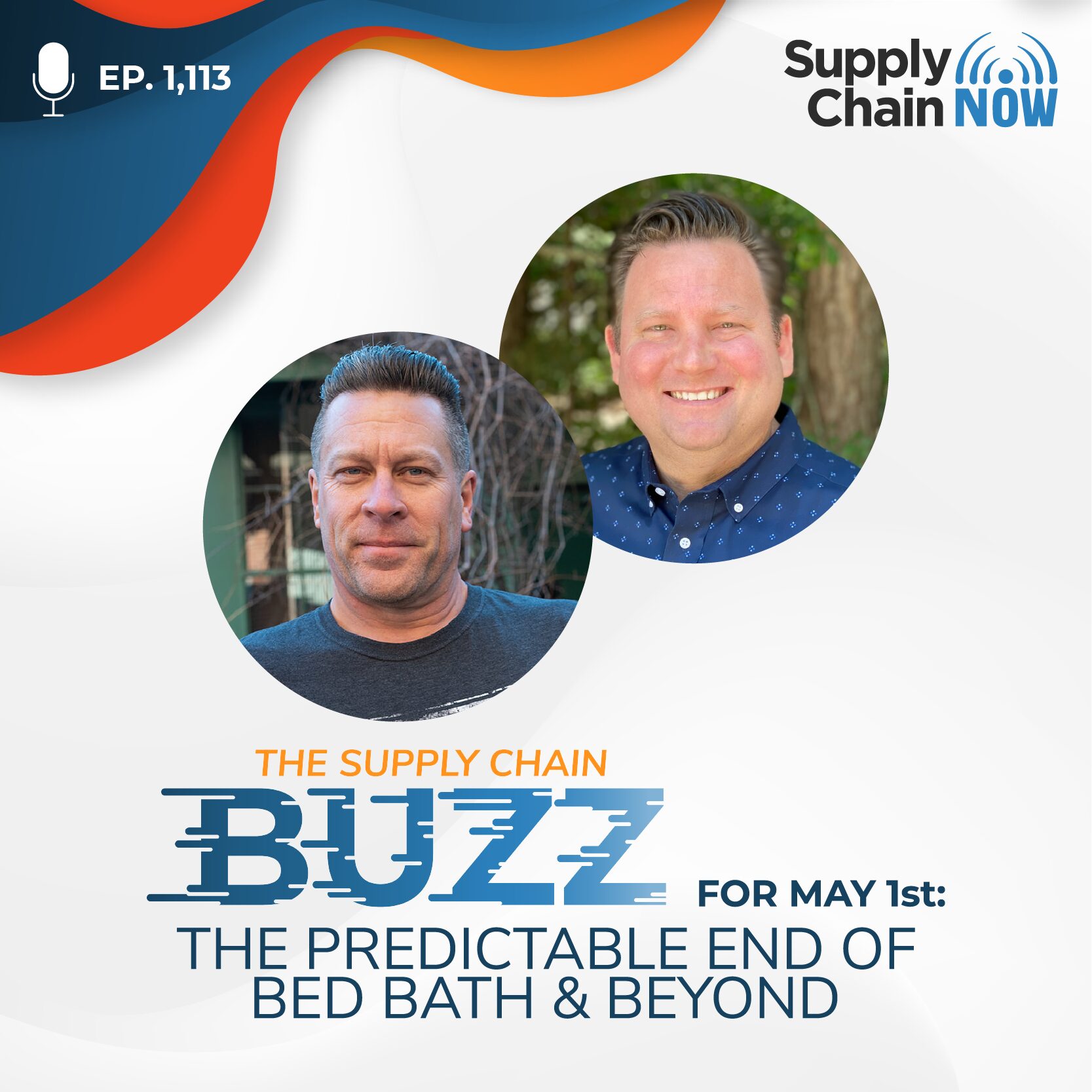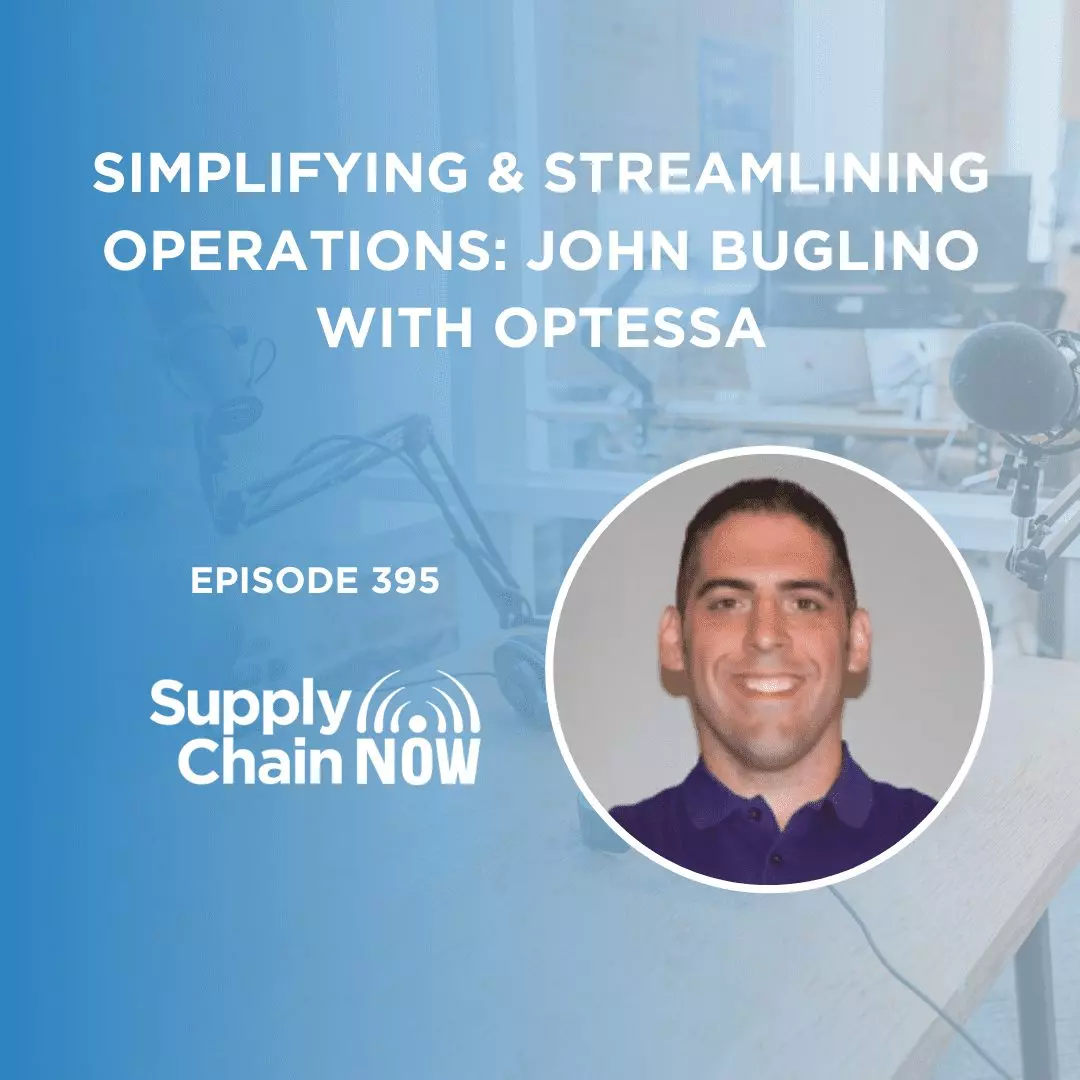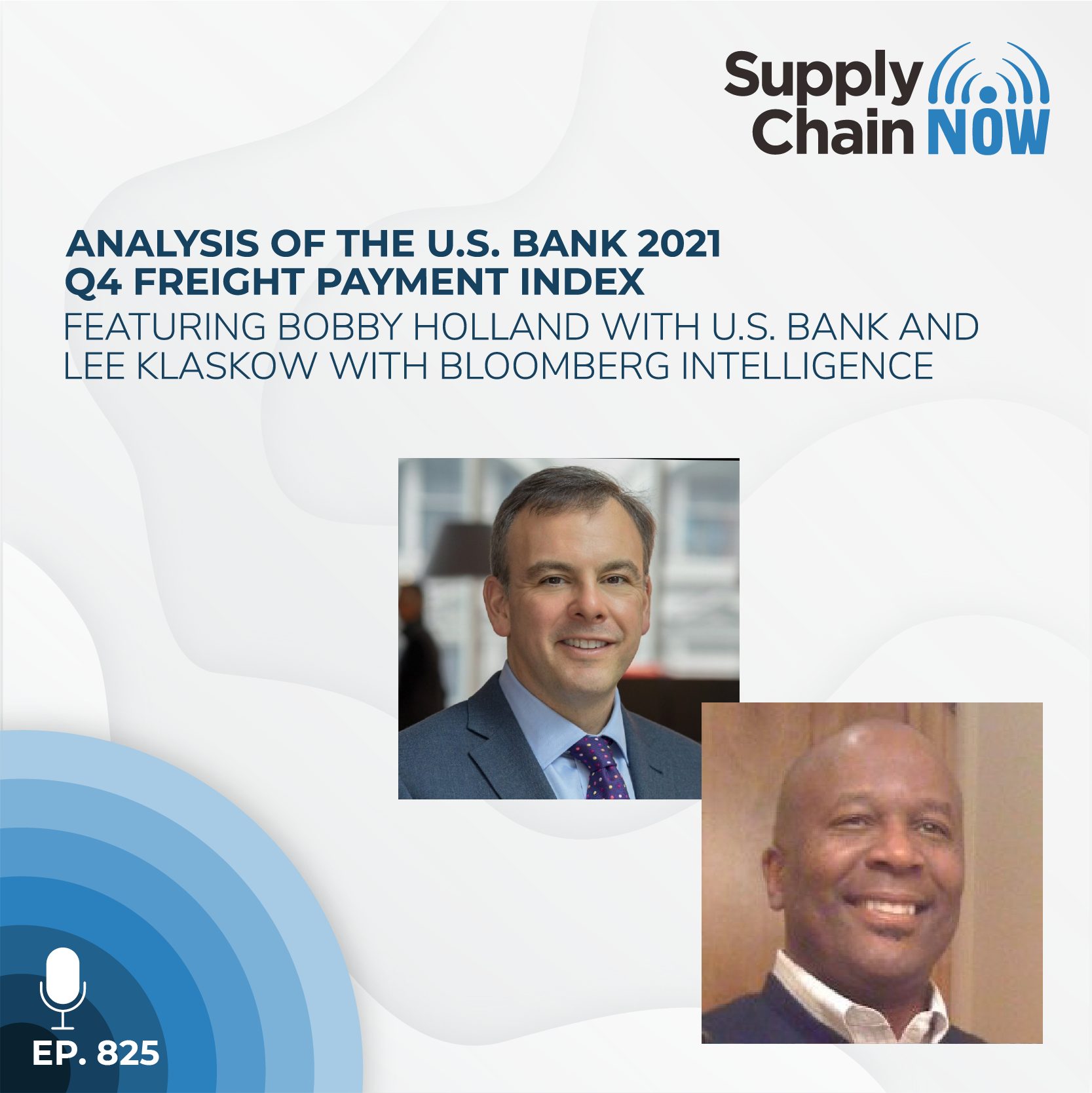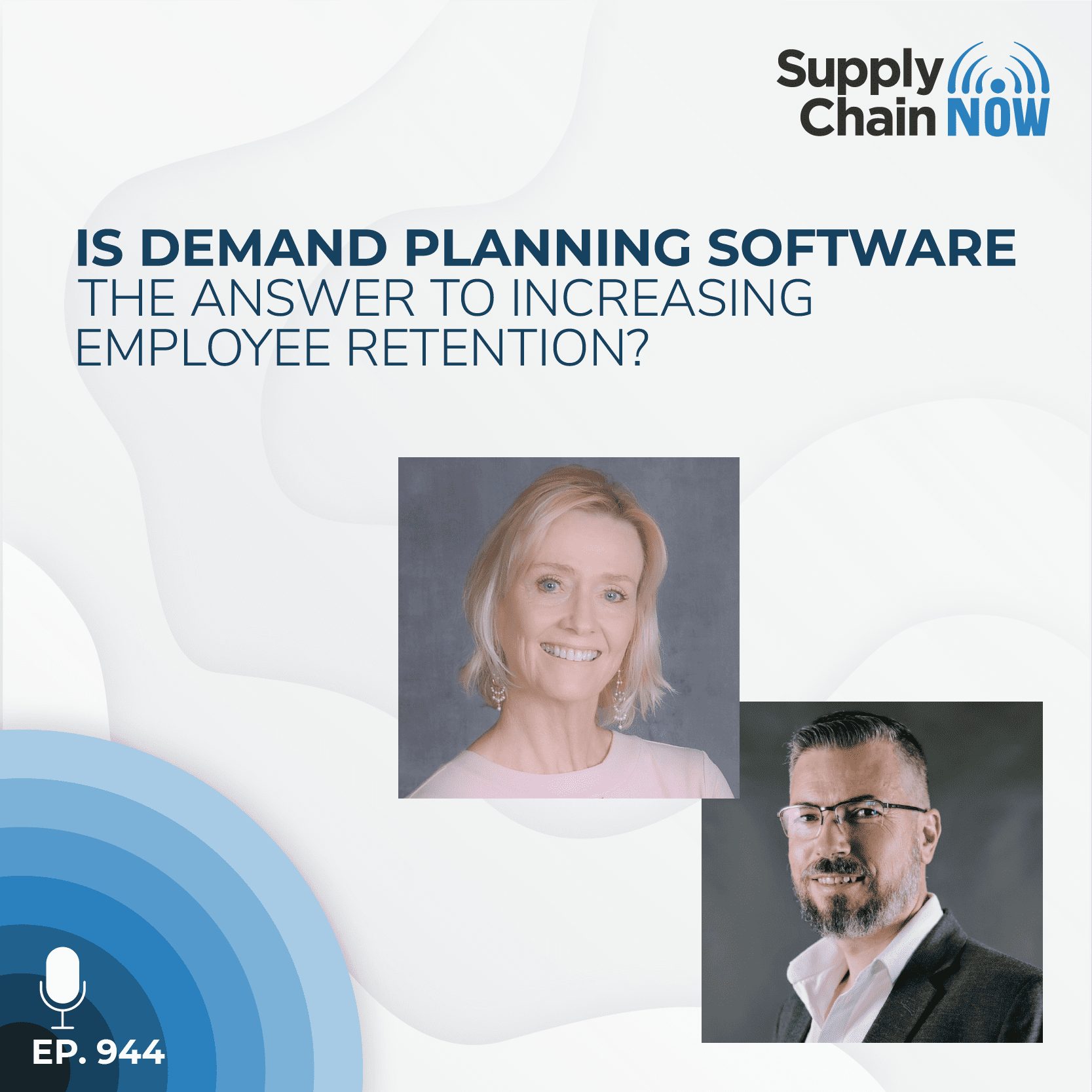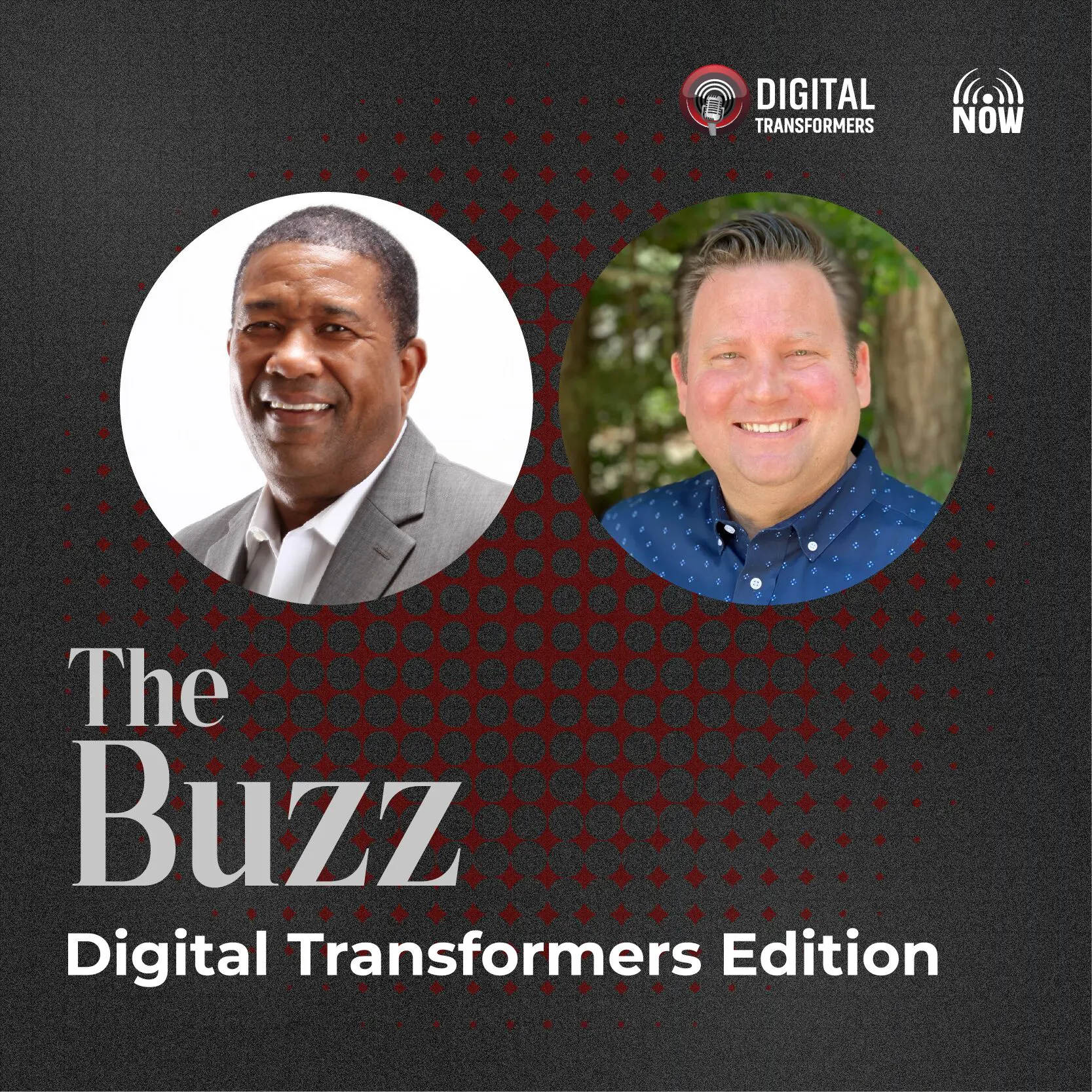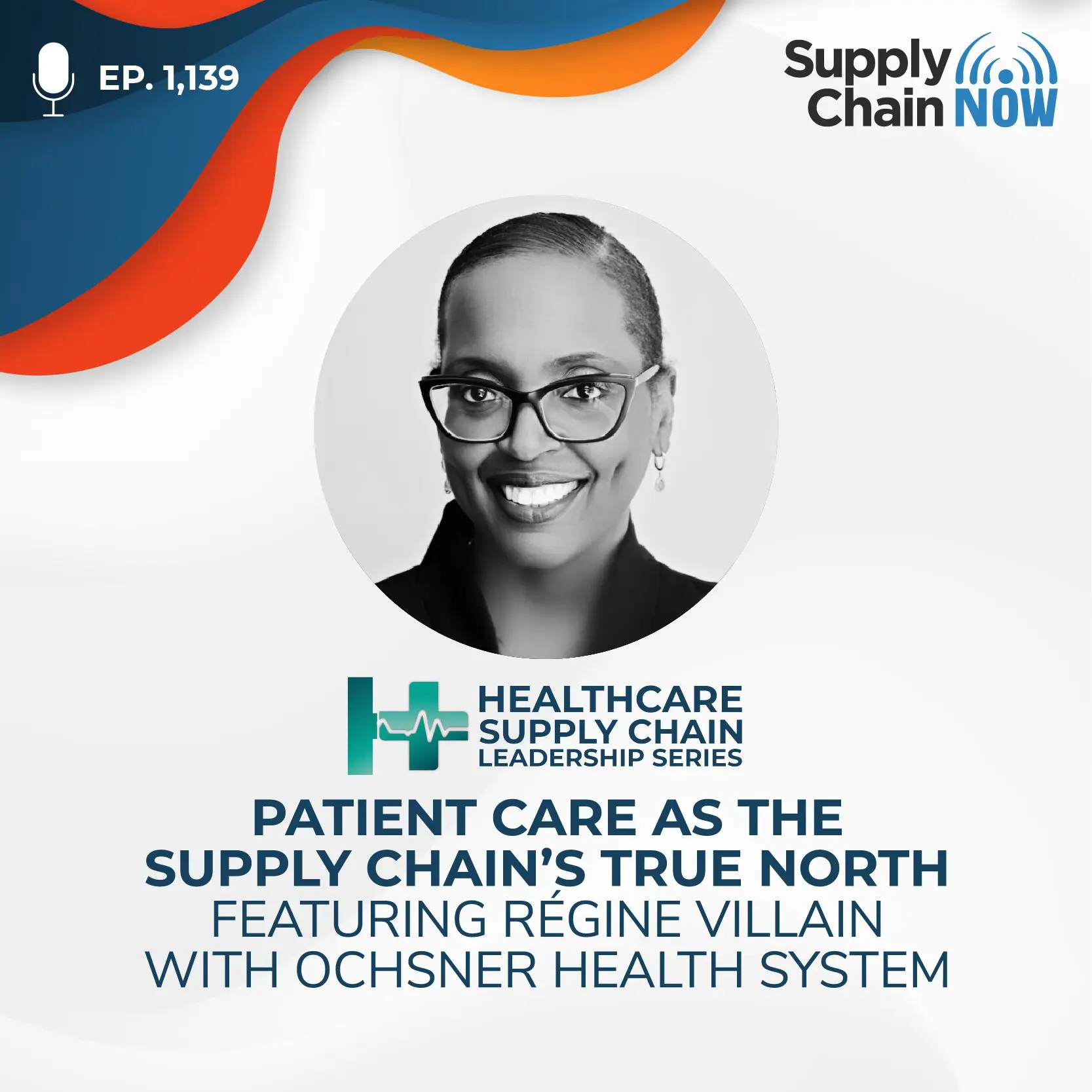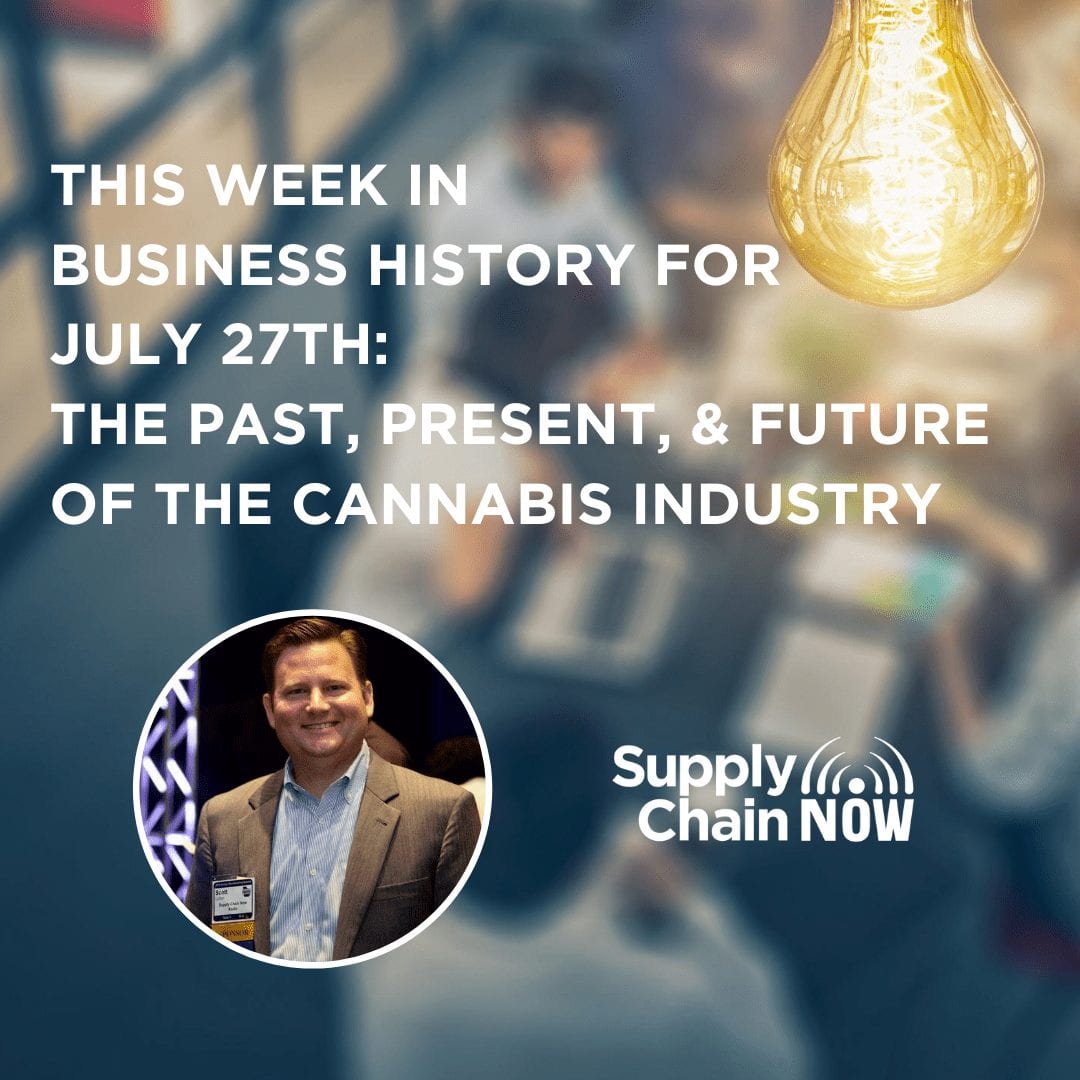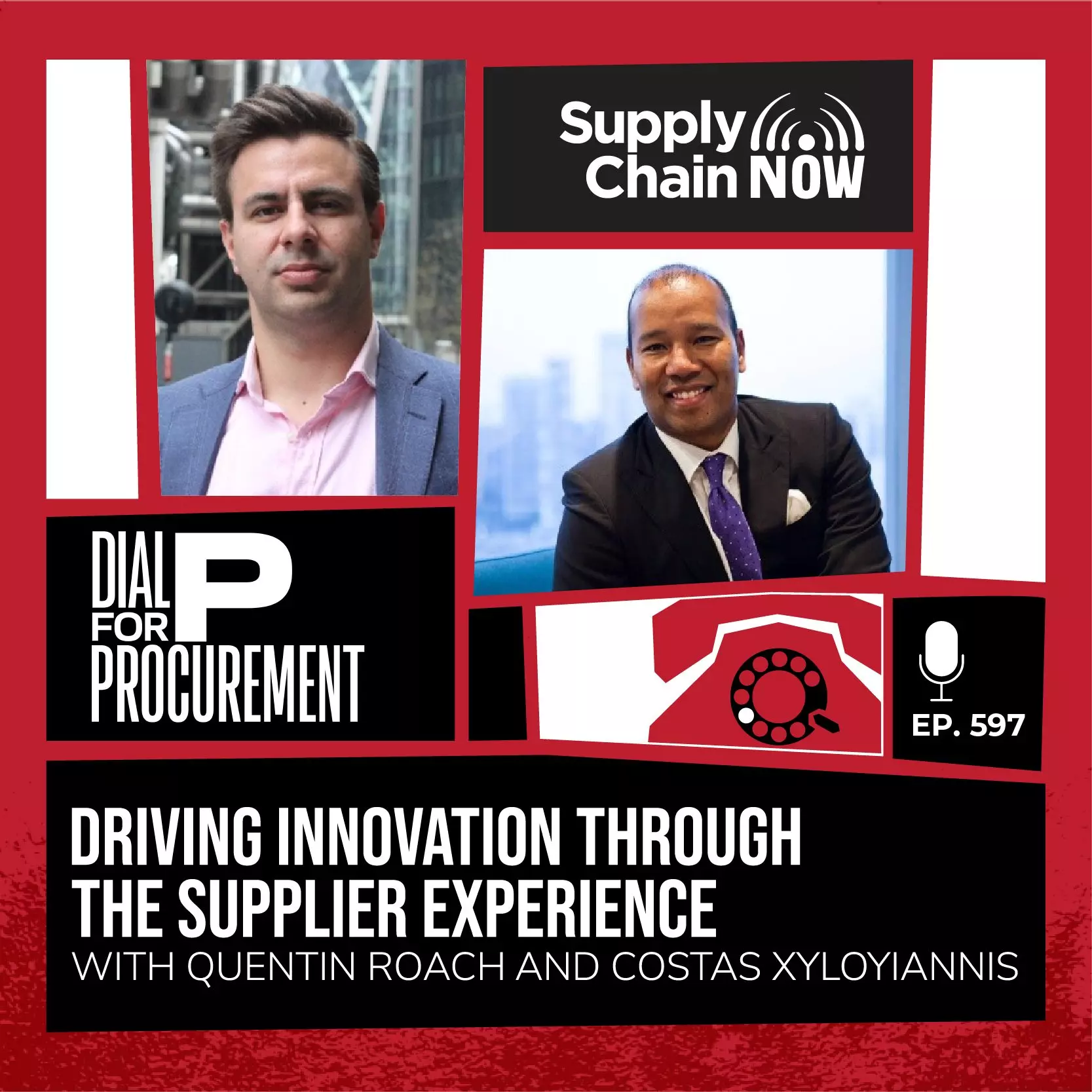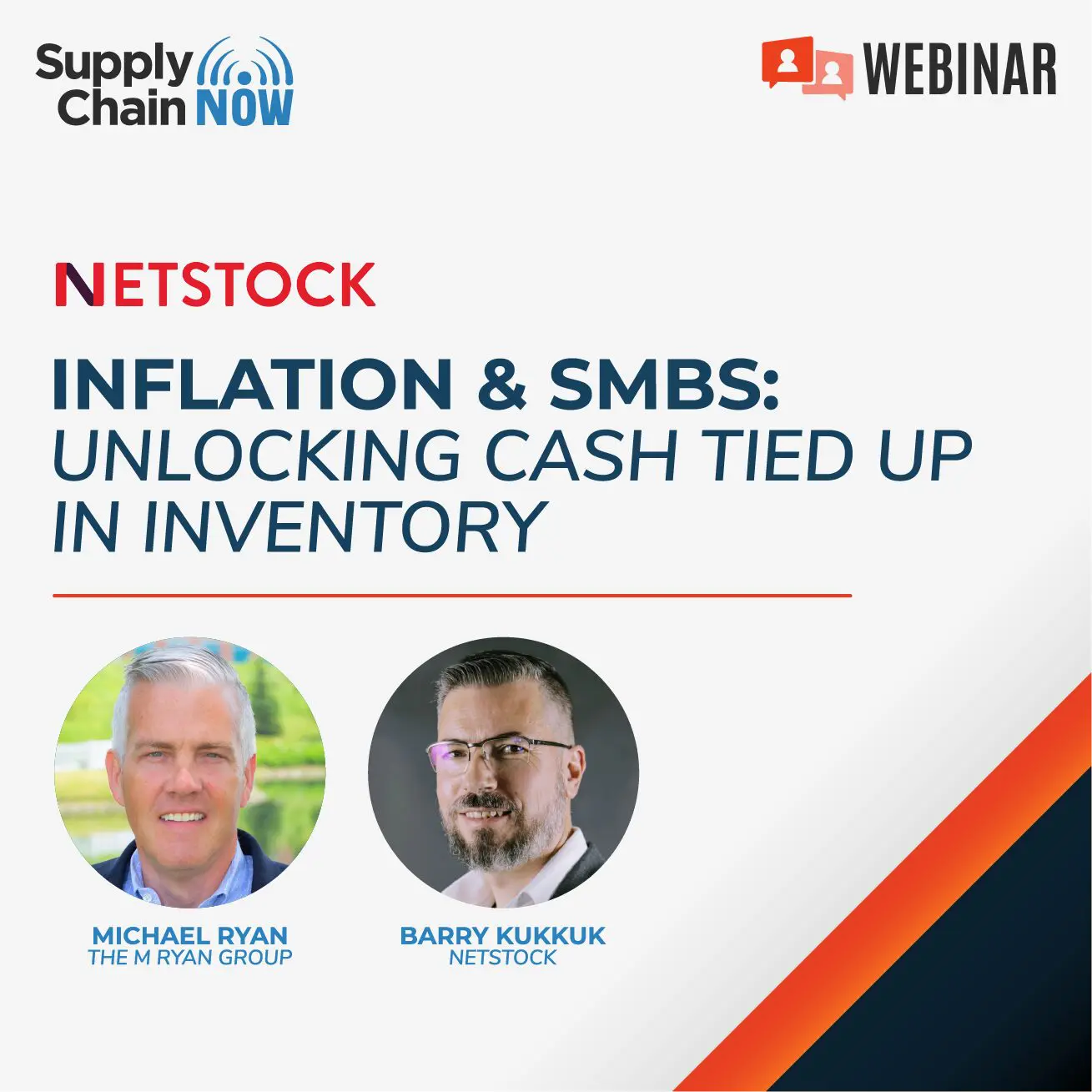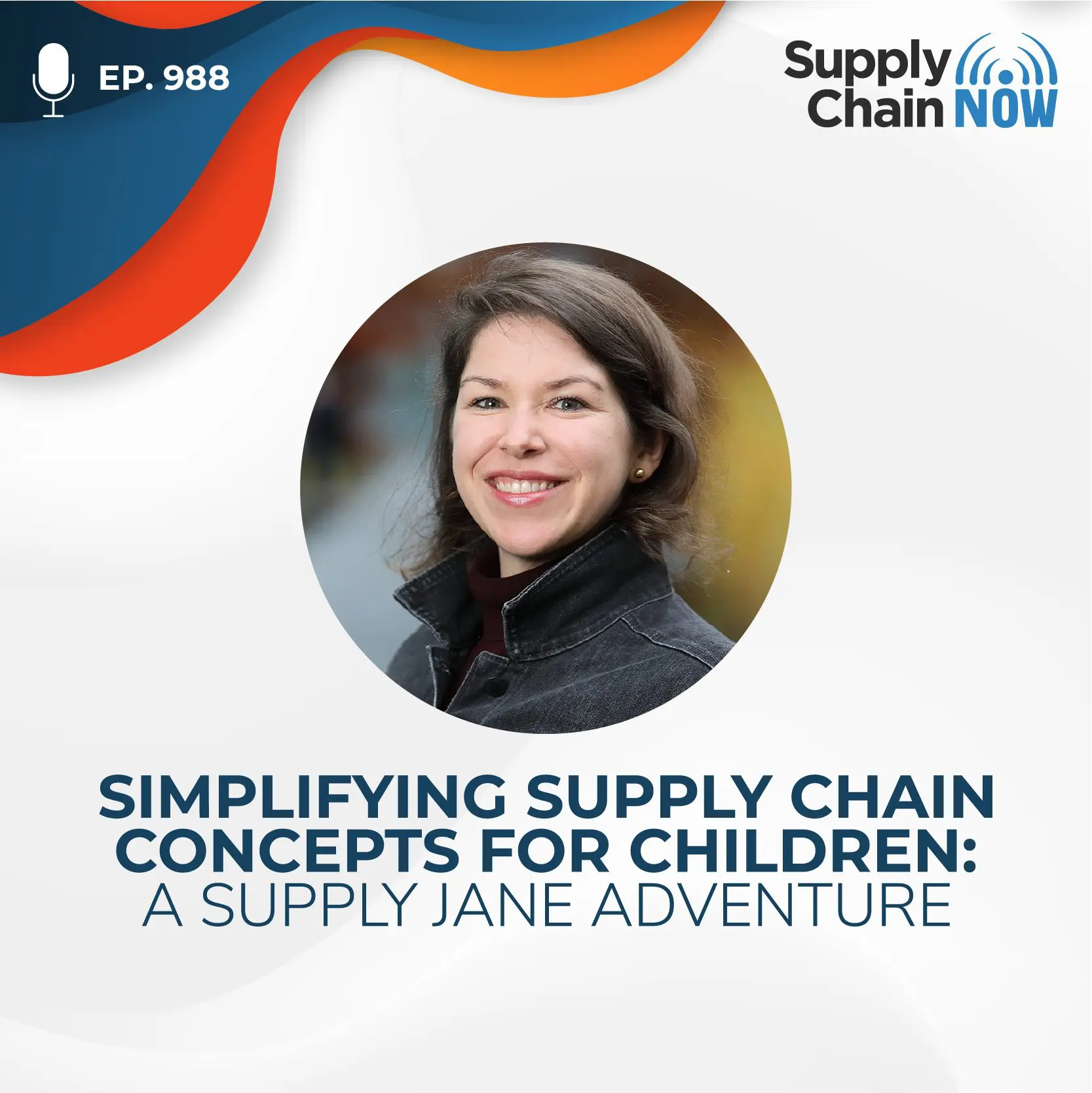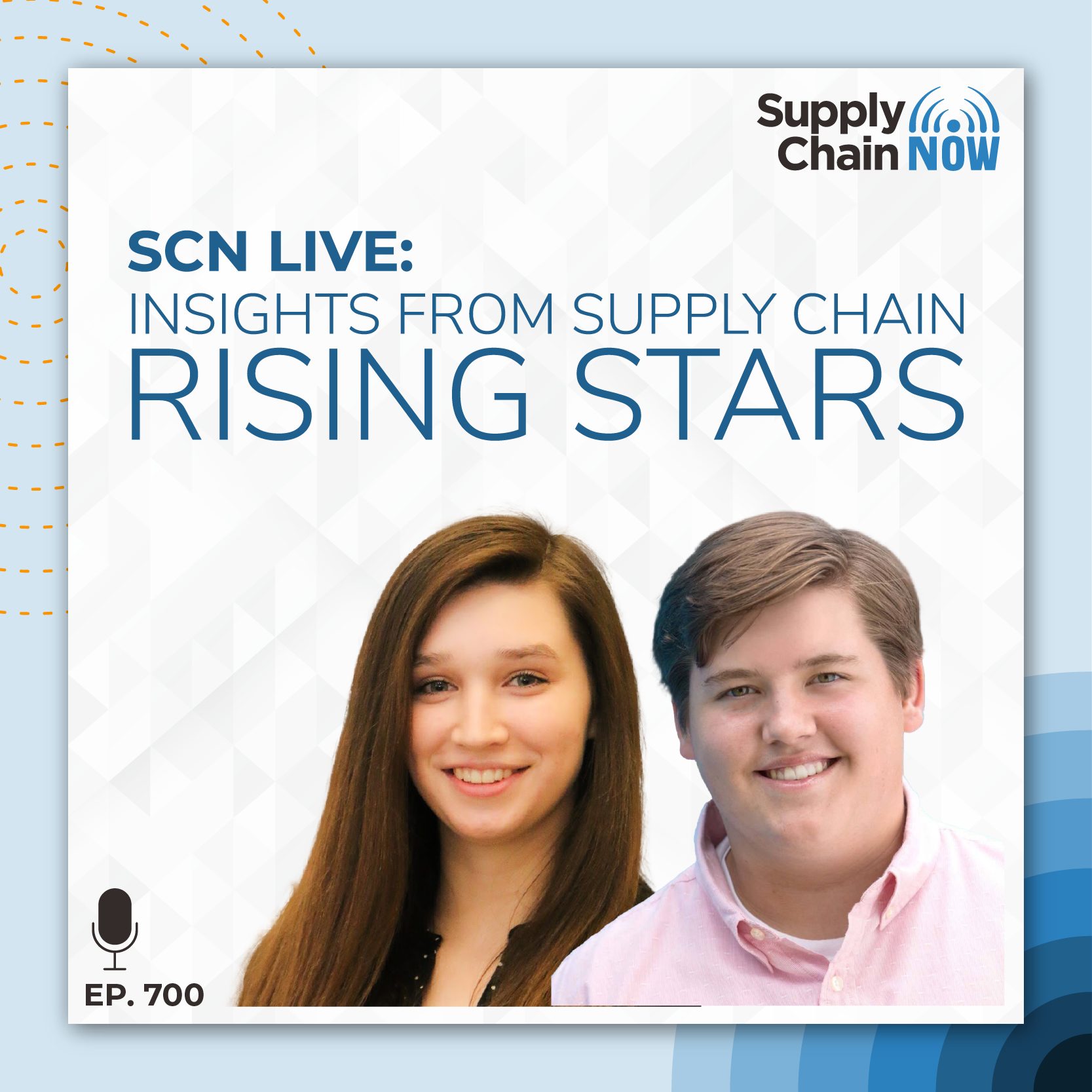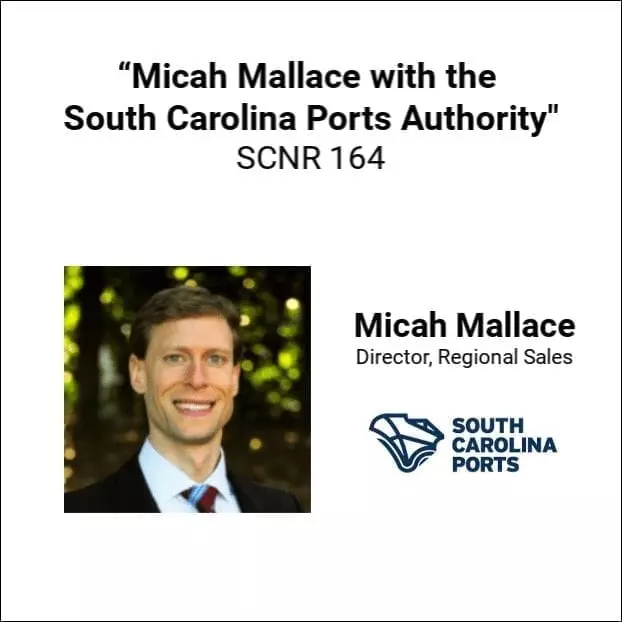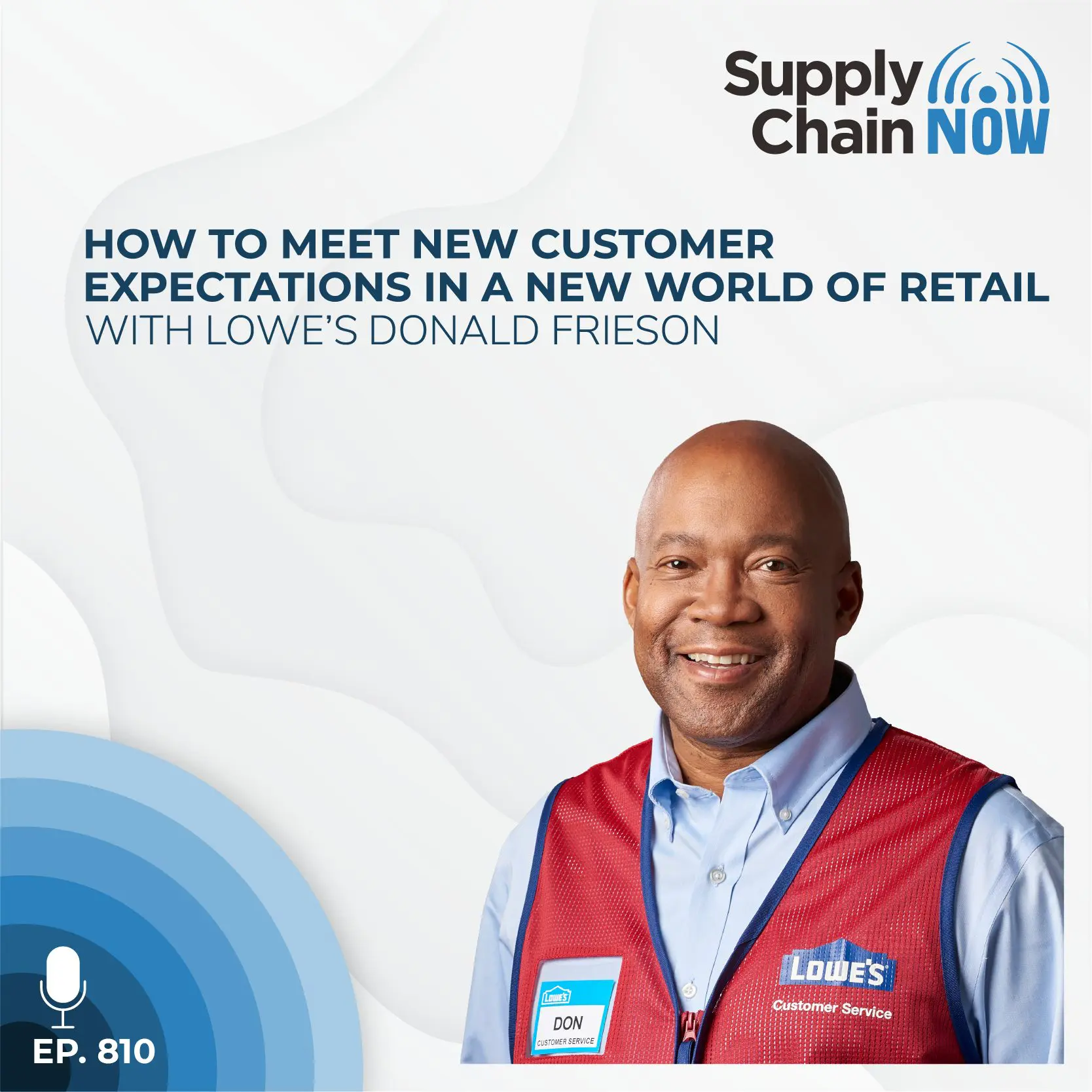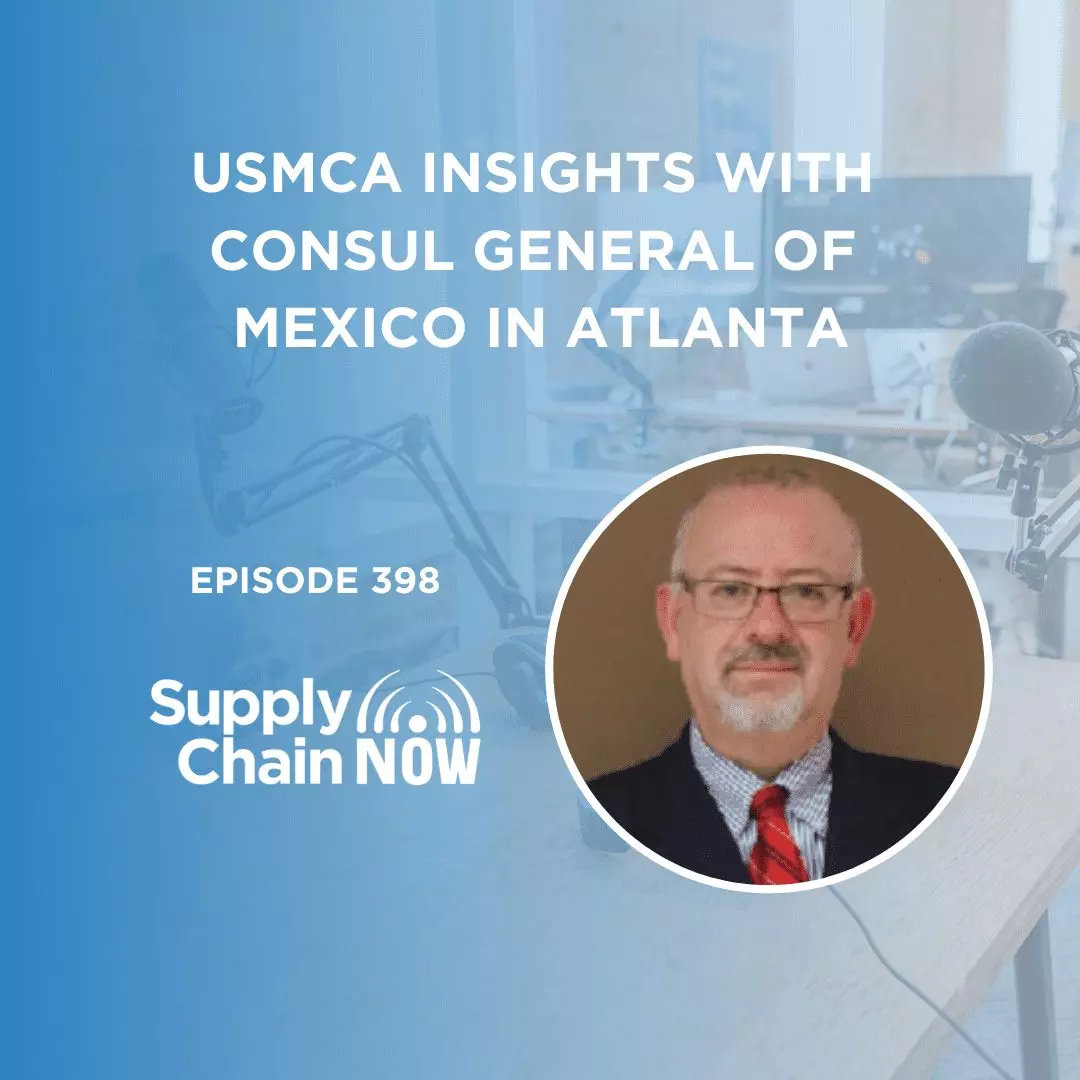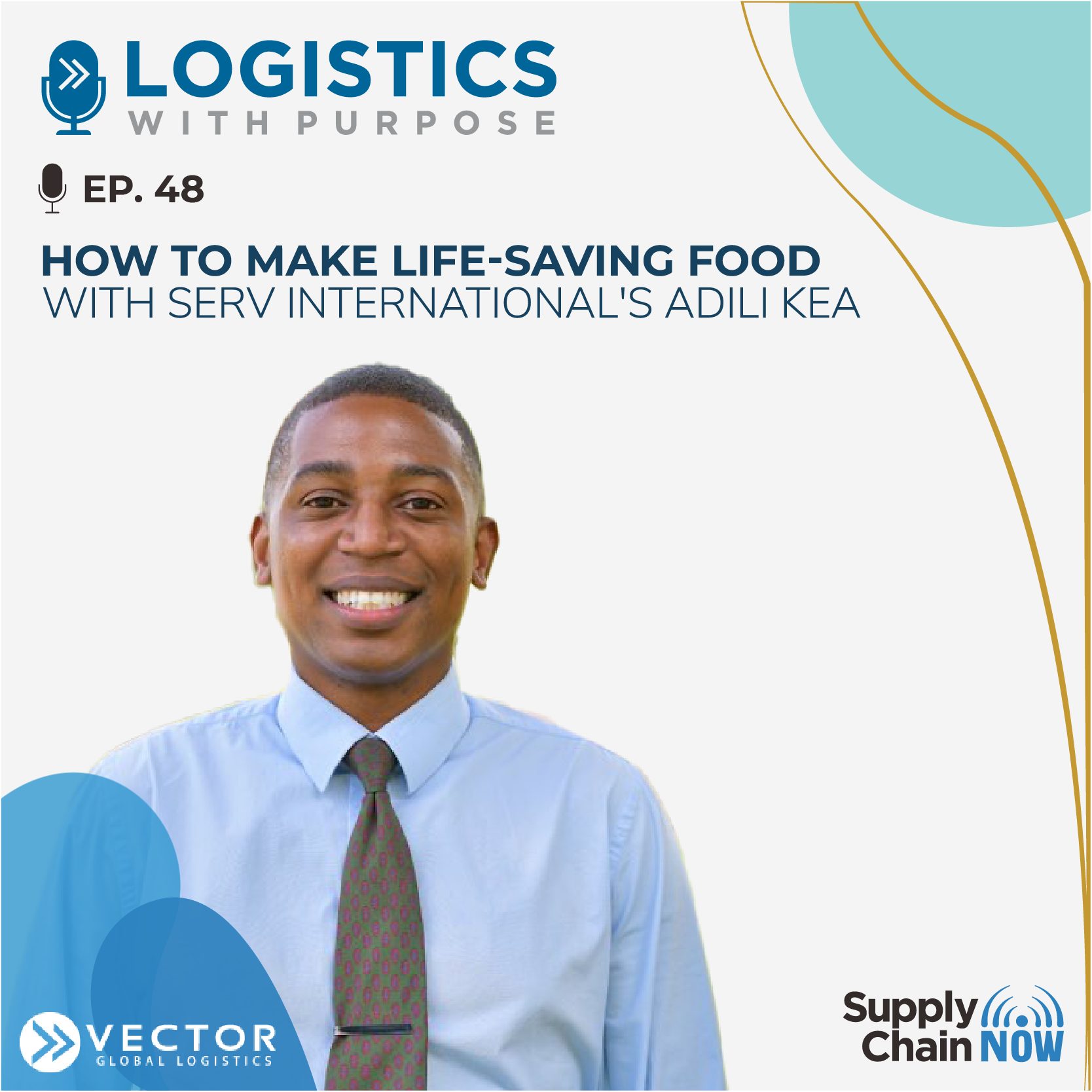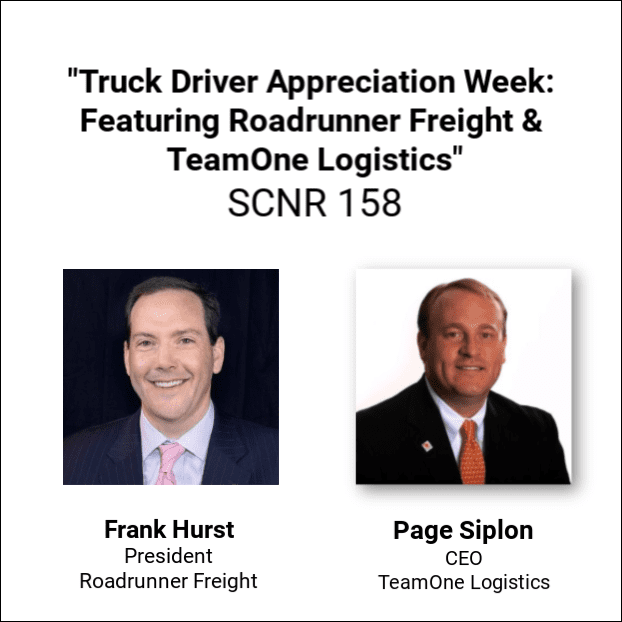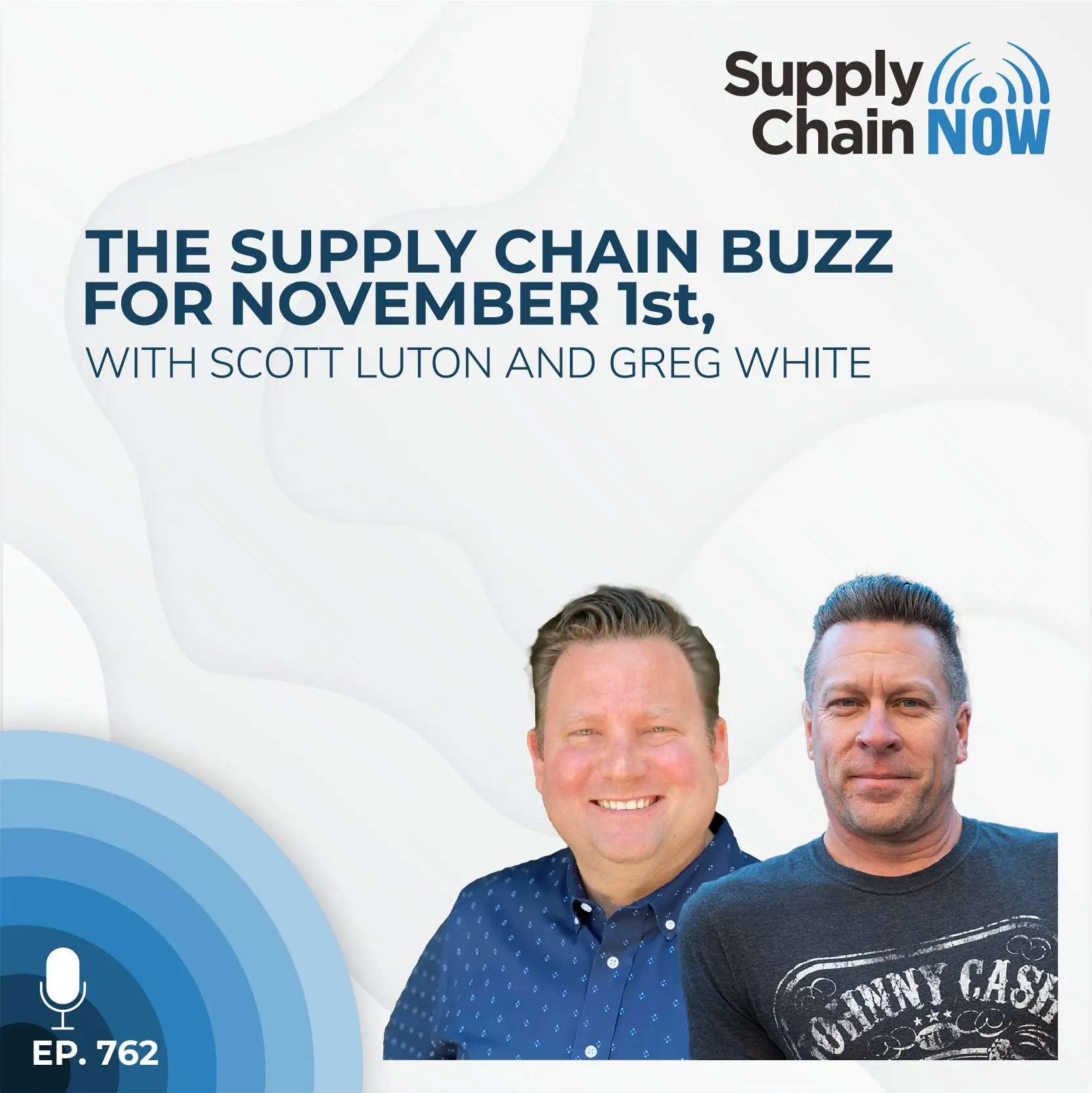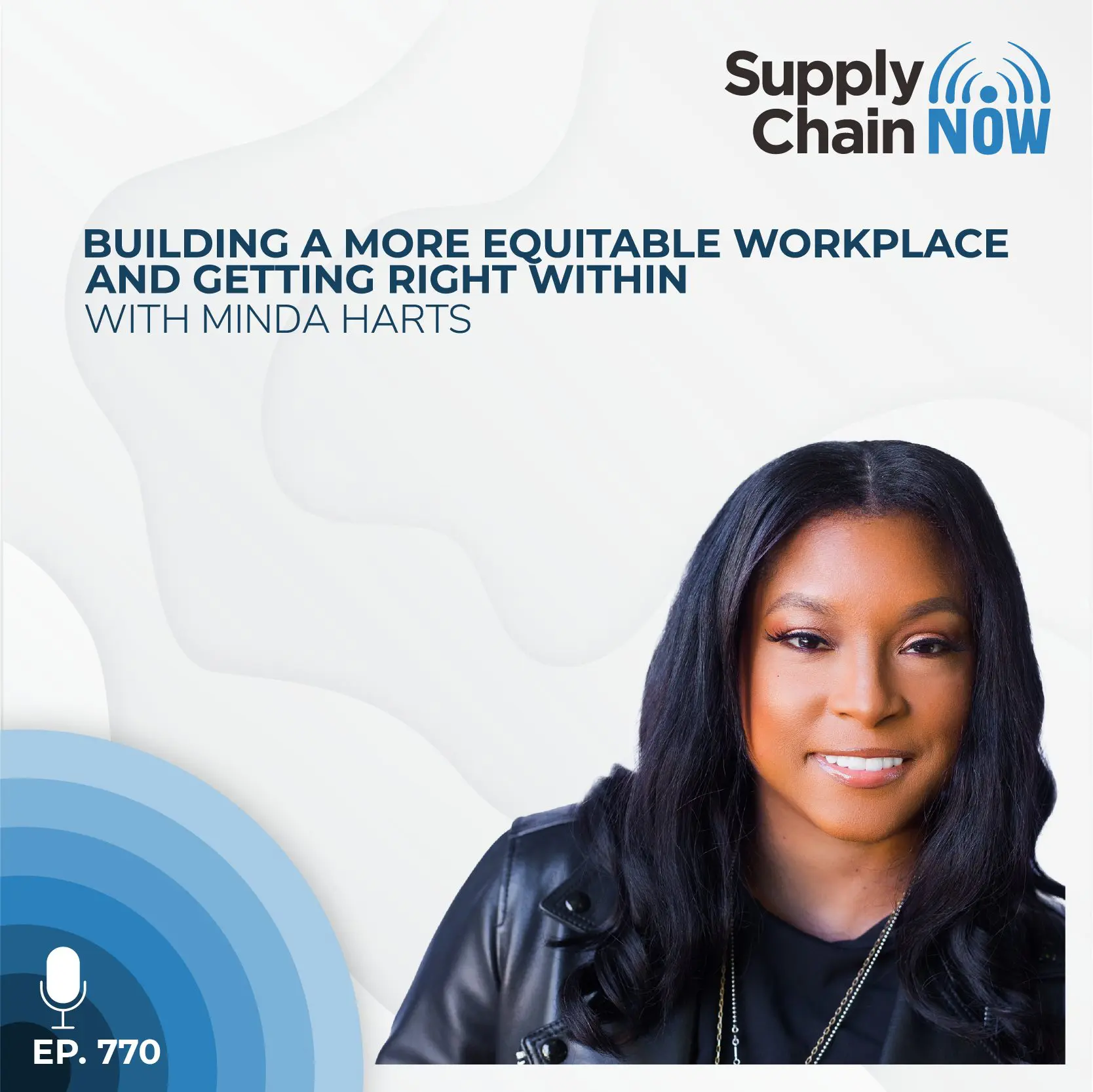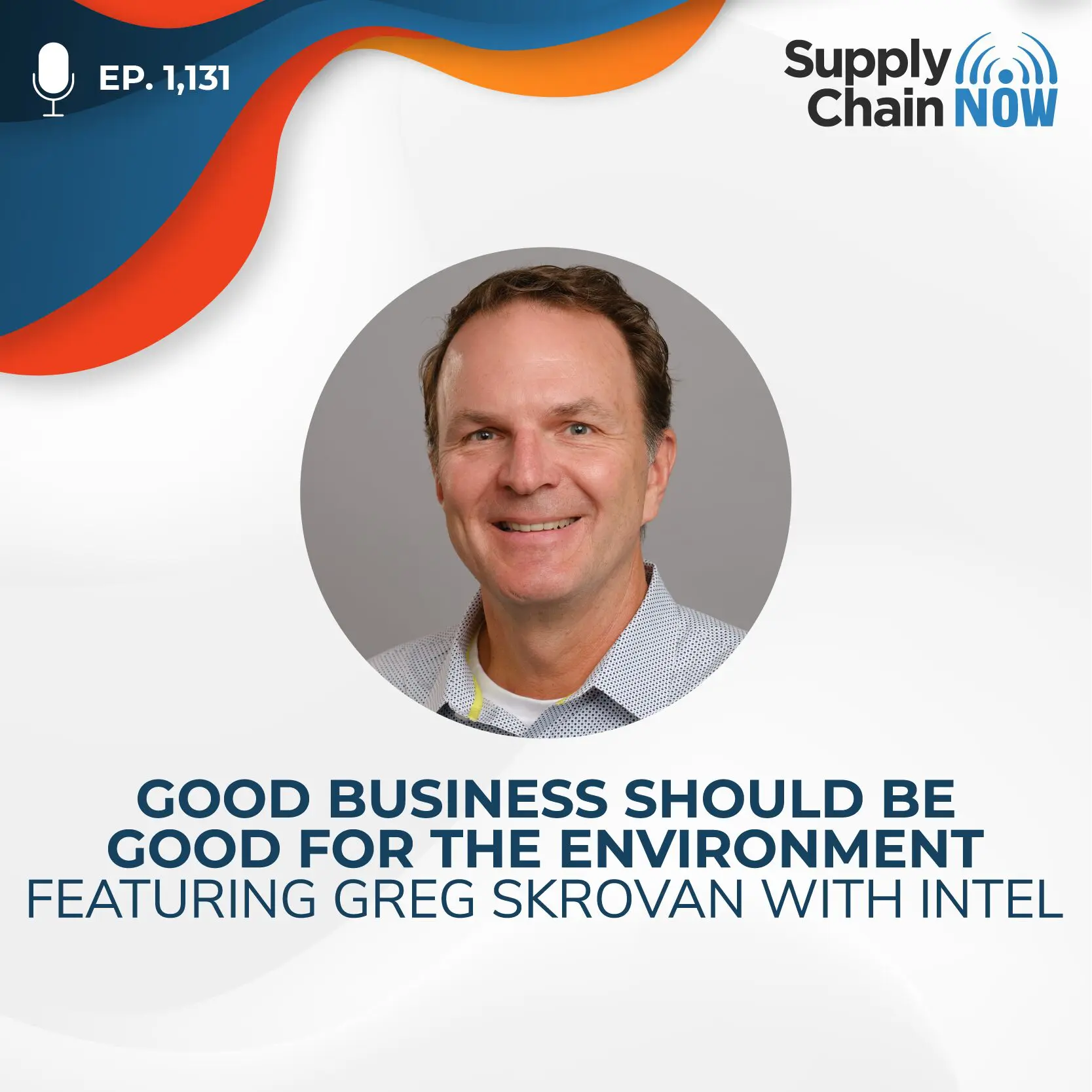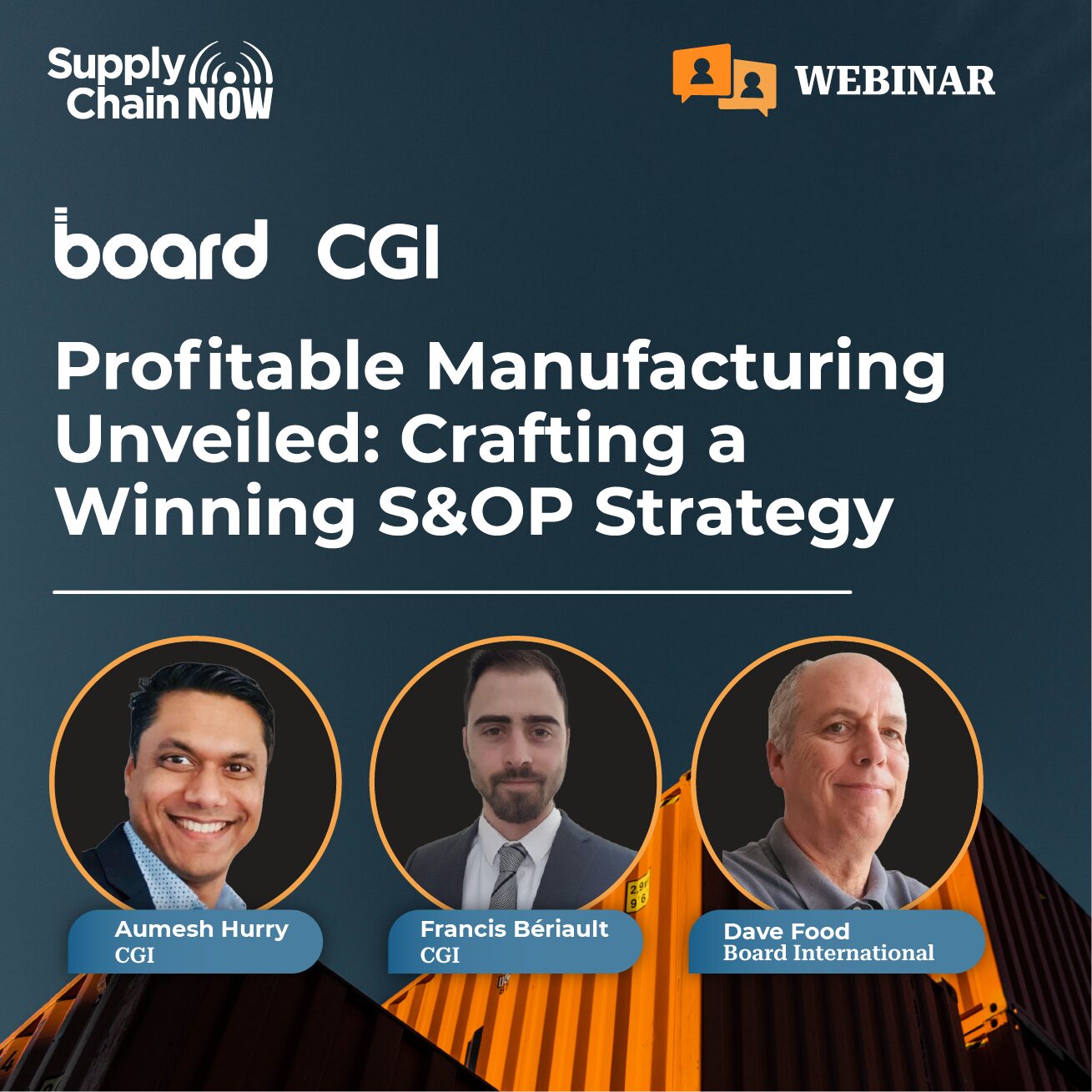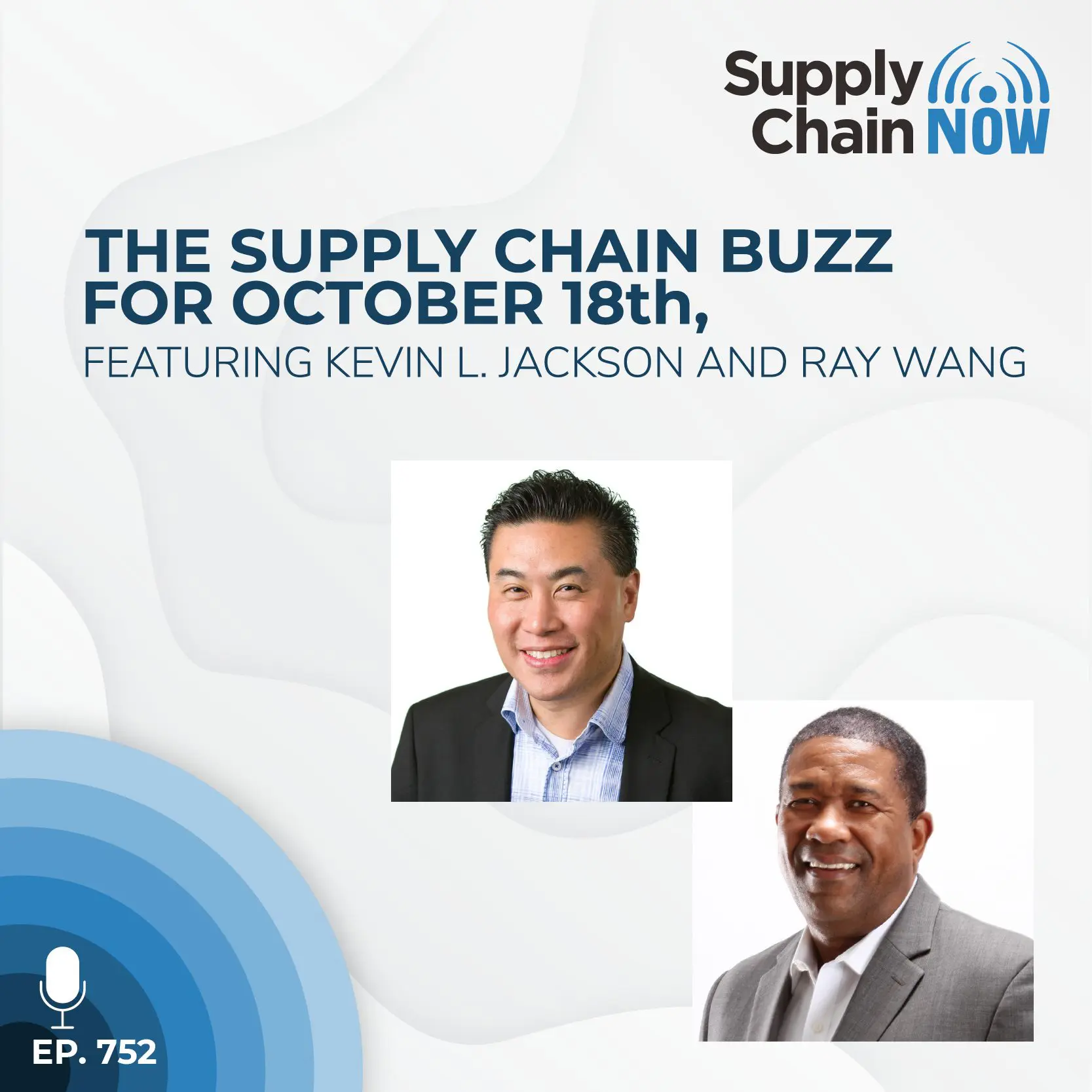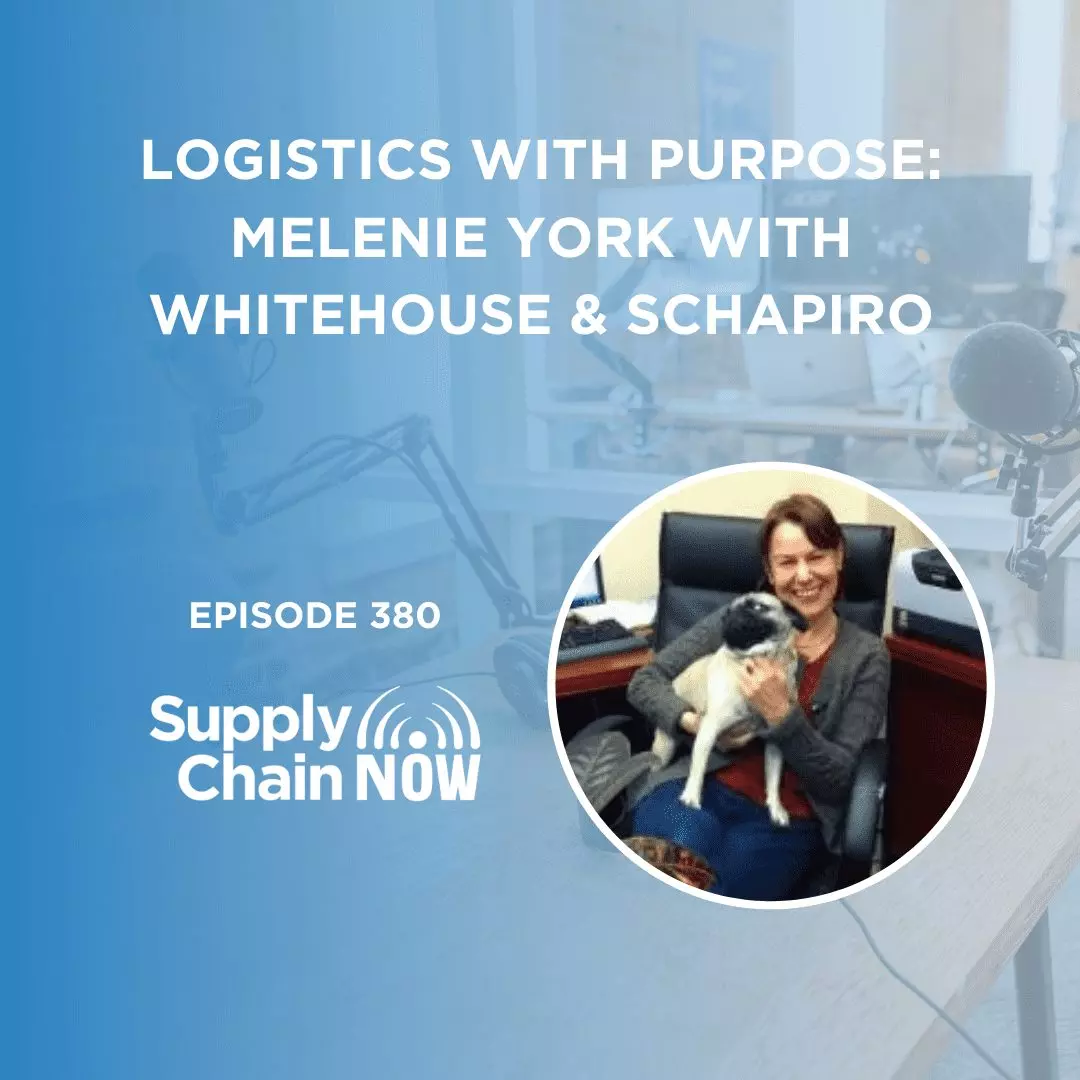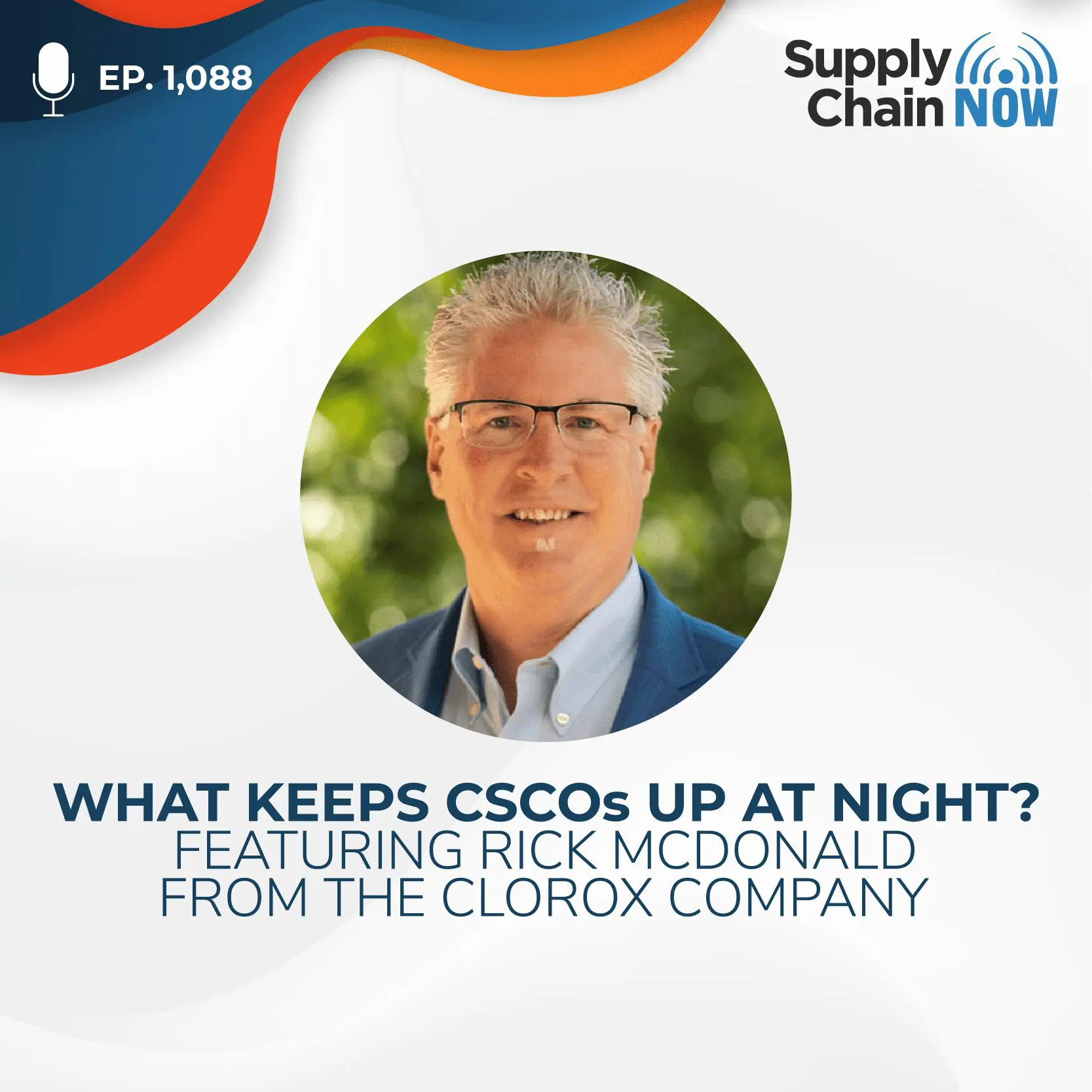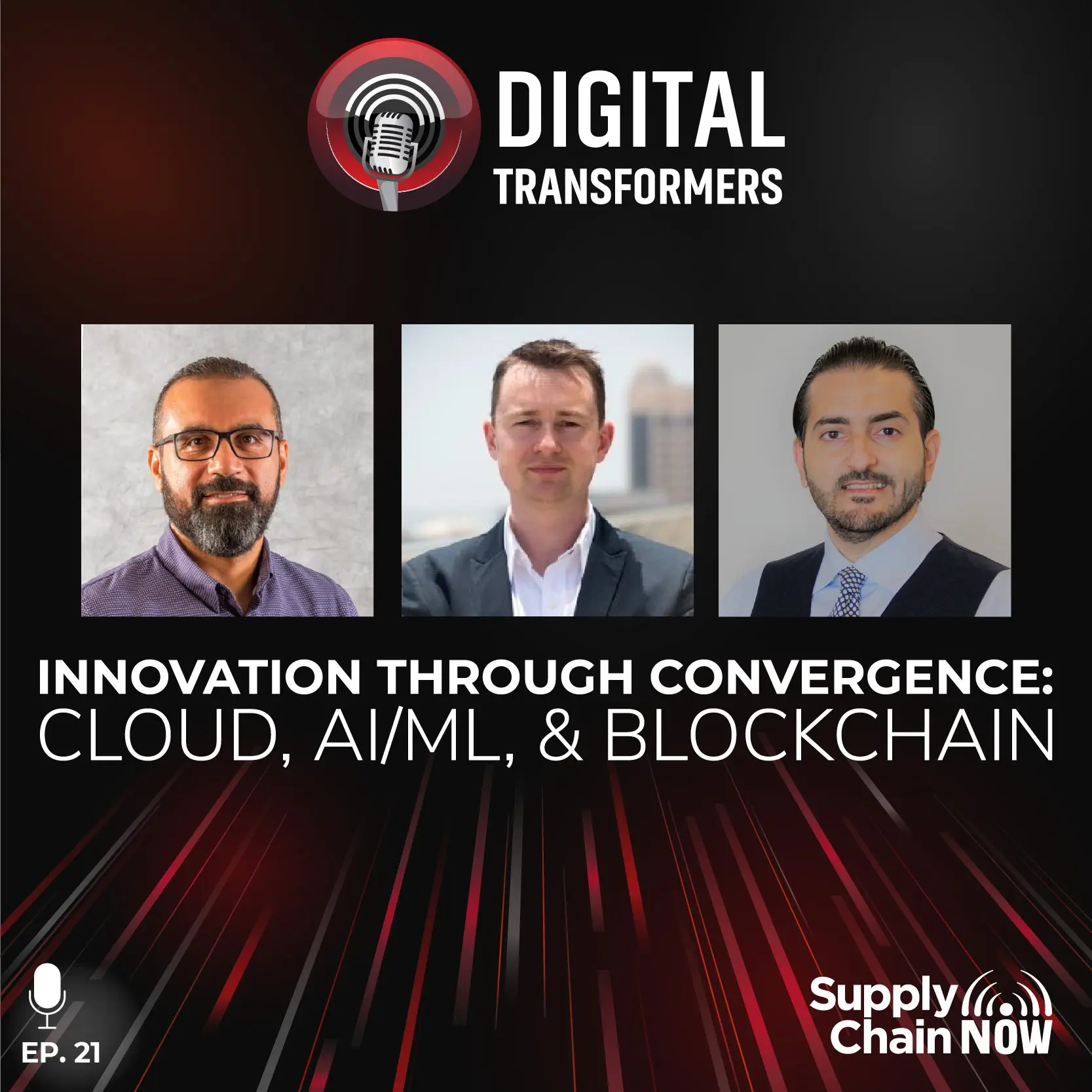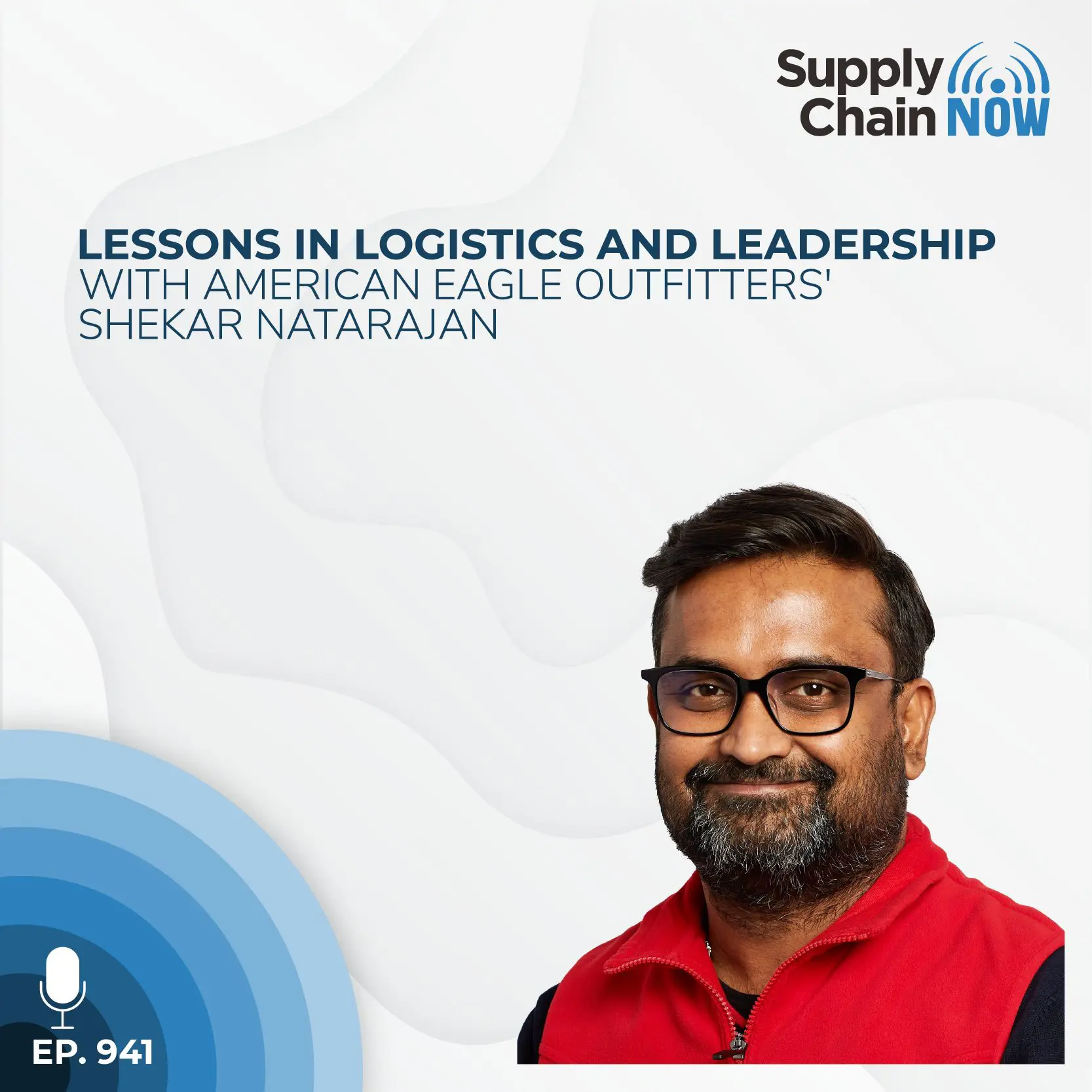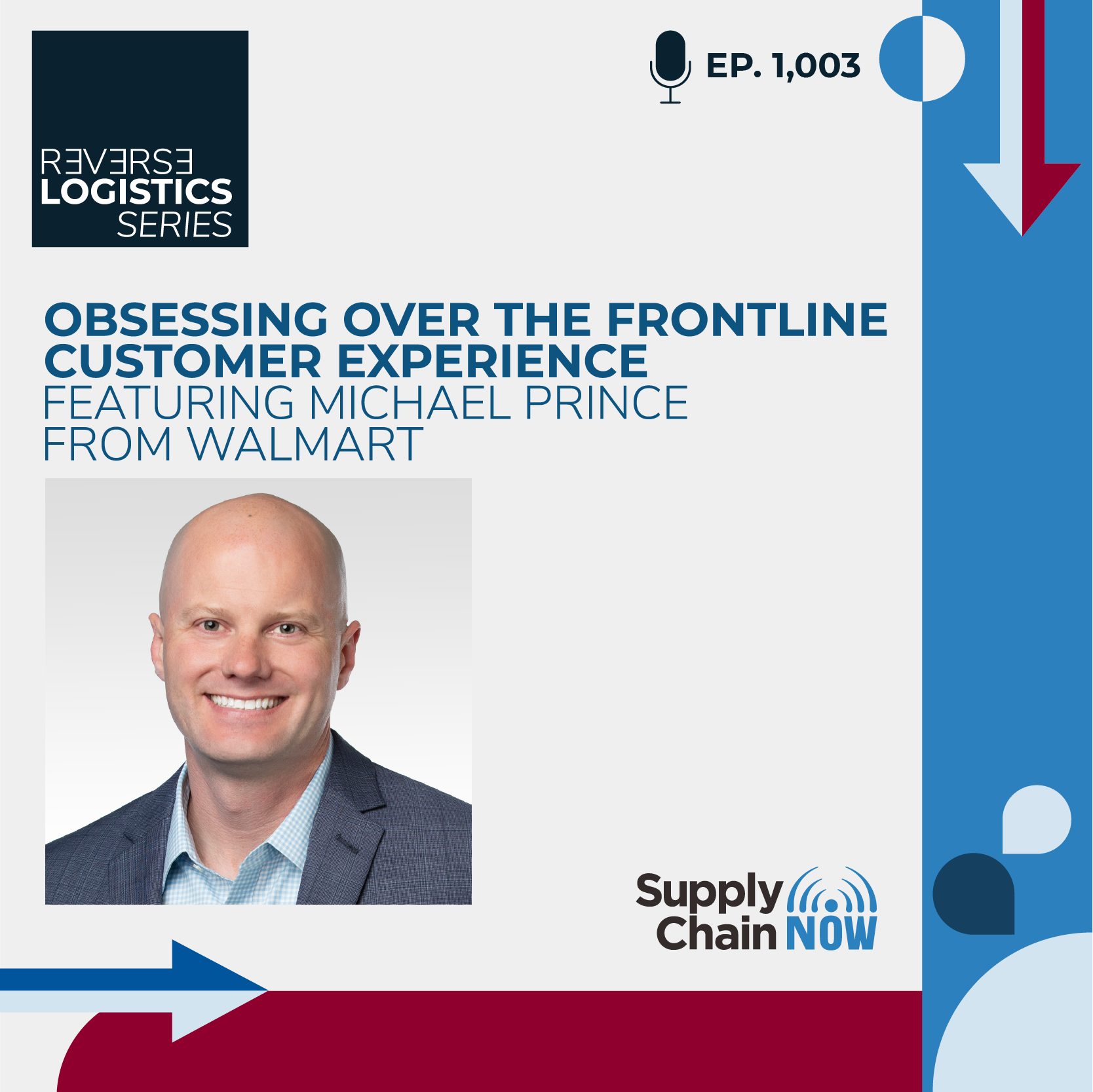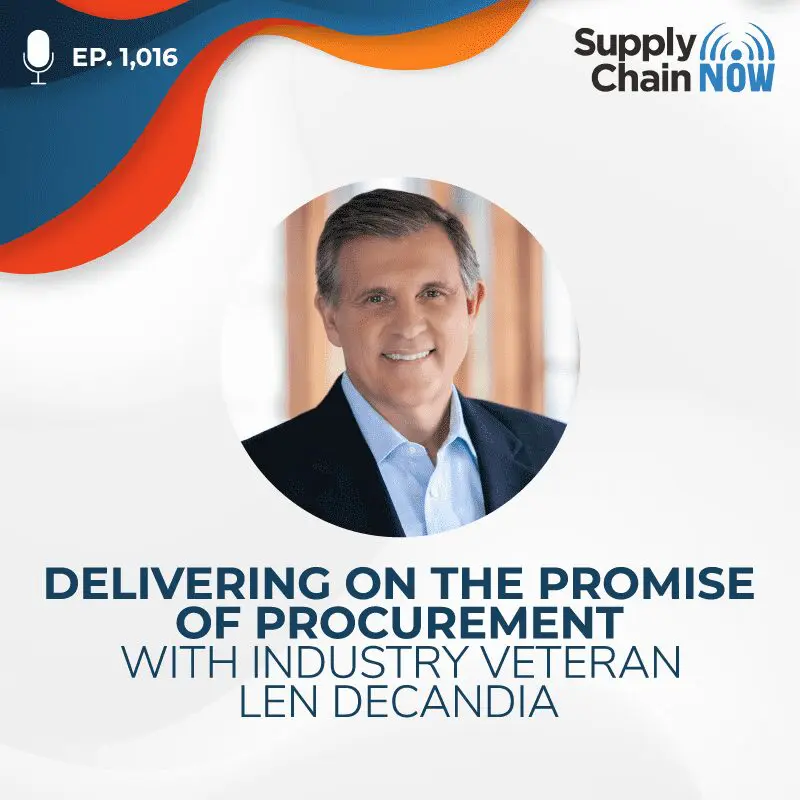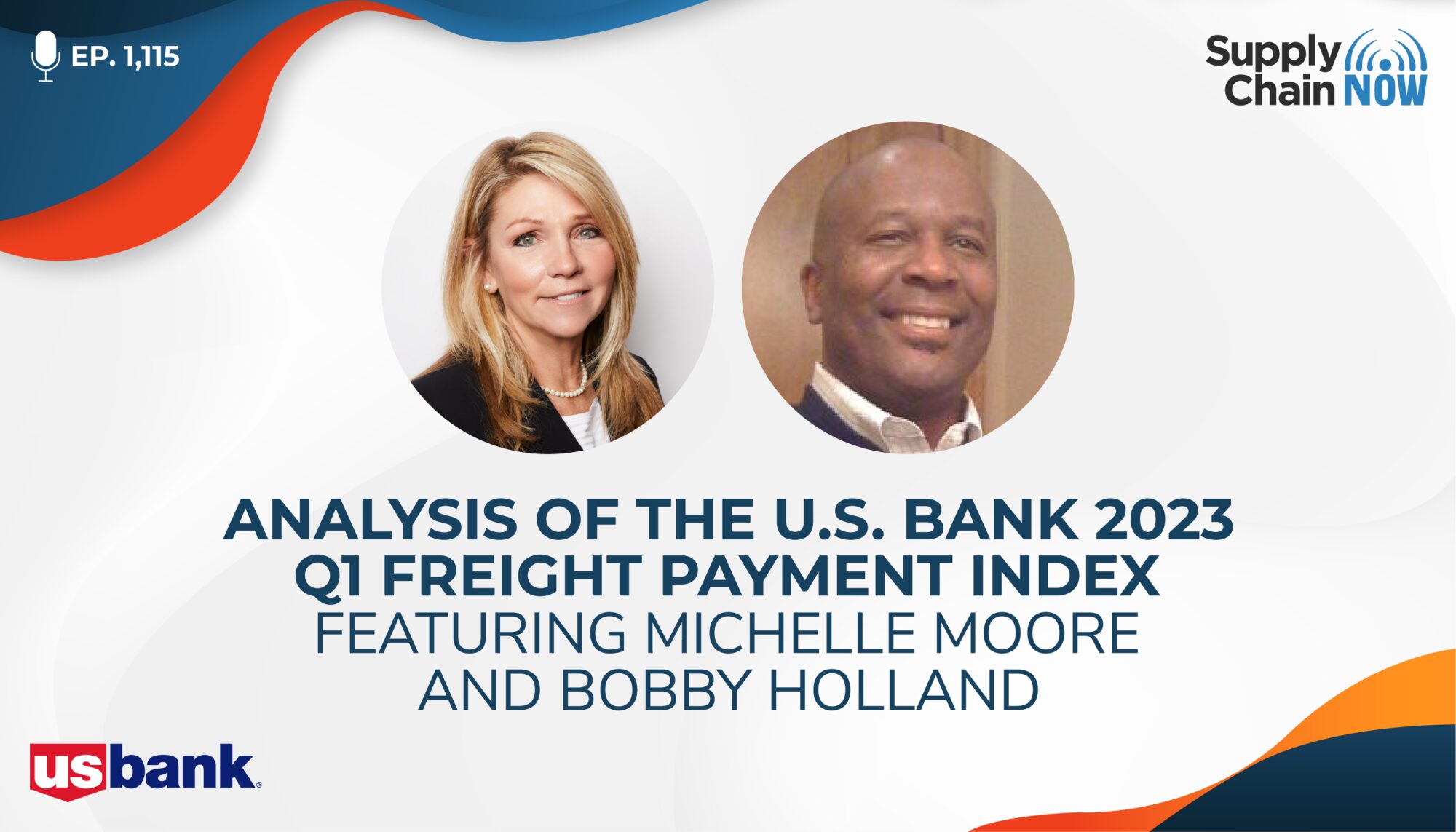
The U.S. Bank Freight Payment Index is a great place to go for a broad view of the market and to get some regional perspective as well. It helps us check in with how we thought about the market and how our quarterly actuals match up to what the report is saying.
-Michelle Moore, Head of Supply Chain at GAF
Episode Summary
In 2022, U.S. Bank processed $46 billion in freight payments for some of the world’s largest corporations and government agencies. Those payments and the data that accompanies them are analyzed quarterly by Bobby Holland, U.S. Bank Vice President and Director of Freight Data Solutions, and his team. The FPI report includes quarter over quarter, year over year, and full year data and analysis.
Bobby opened the conversation by sharing his five key takeaways from the first quarter of 2023: the trucking market continues to be soft, quarterly and yearly metrics for shipments and spend both dropped for the first time in three years, the Southwest outperformed while the Midwest continued to struggle, and the Southeast saw an 8 percent increase in yearly spend despite 16 percent fewer shipments.
In this interview, Bobby was joined by Michelle Moore, Head of Supply Chain at GAF, to share and discuss the results of the Q1 2023 report with co-hosts Scott Luton and Greg White:
• Why national shipment volume being lower than spend indicates there is a capacity issue
• Signals that the drop in activity in Q1 2023 is more significant than the regular seasonal reduction U.S. Bank would expect
• How a decline in manufacturing activity is impacting capacity at the regional level
Episode Transcript
Intro/Outro (00:03):
Welcome to Supply Chain. Now the voice of global supply chain Supply chain now focuses on the best in the business for our worldwide audience, the people, the technologies, the best practices, and today’s critical issues, the challenges and opportunities. Stay tuned to hear from those Making Global Business happen right here on supply chain now.
Scott Luton (00:31):
Hey, good afternoon, good evening, good morning, wherever you are across the globe. Scott Luton and Greg White with you here on Supply Chain. Now, welcome to today’s livestream, Gregory. How we doing today?
Greg White (00:43):
And happy New Hour. You’re where we’re <laugh>. That’s right. I’m doing well, thank you. We’re enduring quite a blast of wind for the next, last few days and next couple days here in the south. So, um, I saw that Atlanta has some sort of wind and low humidity warning, both very odd at this wind and low humidity we’re,
Scott Luton (01:08):
We batted down the hatches, we’ve tied down the flower pots. Even the dogs. The dogs and cats are all secured. So we we’re not gonna leave anybody behind, but talk about a whirlwind over the next hour. Oh, really? <laugh>, we’re gonna be diving into all sorts of supply chain freight, business market observations. Yeah. As we’re gonna be sharing key insights, Greg, from one of the leading transportation industry resources, the US Bank Freight Payment Index for Q1 2023. So, Greg, we wanna invite folks to access and, and go ahead and download a copy of the freight payment index so they can fall along and mark it up as we, we dive into it over the next hour. And folks, as you can see there, uh, and if you’re listening to this replay, you can check it out at Freight. It’s really easy. Really easy freight.us bank.com to get your own copy.
Scott Luton (02:01):
All right. So Greg, uh, before we introduce our guests, so we’re gonna be, um, uh, having one guest, one business leader, really focused heavily on what the data is showing, right? And then we’re gonna have our other, uh, guests and business leader focused more heavily on expertise in terms of what’s going on out in the marketplace. Right? Right. So, before we introduce our guests, uh, we’ve really enjoyed this ongoing collaboration with US Bank, as it’s one of the leading financial institutions involved, empowering the transportation industry forward, the backbone, as we all know, of the global supply chain community. Uh, tell us more, Greg, what, what have been your thoughts of this series?
Greg White (02:42):
Well, uh, my thoughts have been the skyrocketing growth. I, I can’t even remember what the number was, uh, in billions of transactions back in 2019. Is that when we started this?
Scott Luton (02:55):
I think so, yeah. Yeah.
Greg White (02:56):
And now, uh, US Bank is processing 46 billion worth of transactions it did in 2022. Um, and that’s one of the biggest reasons. I mean, there are, you know, millions of transactions in that data. And they are like, we often encourage, and people are trying to do in the supply chain, they are taking advantage of that data to give you insights into what has happened and let you decide what might happen using that information, uh, in the future. Right. Uh, and this one, this time around some really interesting, um, insights and really interesting offsets, right? Some regions doing really great, some doing really poorly. Um, it, it’s, you know, going through it this time, it really made me think about, uh, how valuable this information is and what it can tell you. And, and also it does tell you some of the reasons behind that. And we’re gonna talk about that in just a little bit.
Scott Luton (03:59):
That’s right. The gift it keeps on giving. And really quick folks, again, uh, focusing on shipments and spend as our graphic here indicates. And if you wanna download a copy, Greg mentioned the five different regions that it really dives into, coast to coast. Again, freight.us bank.com. Okay, Greg, we’ve got folks, uh, we’ve got Juan Garza with us. We’ve got John Peterson from Marietta. Uh, man Gore from Bangladesh. Great to see everybody. Uh, Juan is in Dubai, so welcome. It’s definitely a, a global, uh, global conversation here today. But Greg, are you ready? We’ve got two outstanding guests. Are you ready to bring these folks in?
Greg White (04:39):
Let’s do it.
Scott Luton (04:39):
Let’s do it. So I gonna welcome in, uh, first Bobby Holland, director Freight Data Solutions at US Bank. And Michelle Moore, senior vice President, integrated supply chain at G A F. Hey. Hey, Michelle. How you doing?
Michelle Moore (04:54):
Hey, thanks for having me today.
Scott Luton (04:55):
Well, great to see you. I really enjoyed our pre-show conversations and back by demand again, Bobby Holland. How you doing? Doing
Bobby Holland (05:02):
Well. Good morning, good afternoon,
Scott Luton (05:04):
Good morning, good afternoon, good evening. Uh, tell ya all the bases covered. That’s right, Bobby. Well, you know what, Greg? Yes. Uh, Bobby just gave us a perfect segue because we are combining two of our, how
Greg White (05:19):
Does he do it?
Scott Luton (05:20):
<laugh>? I don’t know. Uh, we’re gonna be combining two of our favorite topics here cause I wanna pose a little fun warmup question before we get into some of the key takeaways and the rest of our conversation. So yeah, we’re combining sports and food. And Michelle, we’re gonna start with you because as, um, as we learned in our pre-show conversations, you’re a big sports fan, a big Philadelphia sports fan, man, it’s a good time to be, uh, Philadelphia sports fan. Right? So the question is, for all three of y’all, Michelle, when you and the family are sitting down for, uh, an Eagles game or a 76 ERs game or whatever, what is one food dish that has to be on the table, Michelle?
Michelle Moore (05:58):
So, I thought about that question, and everybody that thinks about Philadelphia of course thinks of cheesecakes typically from a couple of venues called Pats or Gino’s, and Right. Usually there’s a debate about Pats or Gino’s. I’ve been to both, to be honest. I like them both. I couldn’t tell you which one I like better. Uh, it’s a new experience every time, but I’m gonna give a local plug. Um, okay. We would buy chicken cheese steaks from, from a family owned business, uh, where we know the owners not too far away in Delaware County, Pennsylvania, Marcos. So Marcos chicken and cheese steaks would be our choice.
Scott Luton (06:33):
Marcos Mar, big shout out to the Marcos family. I’m gonna have to check that out, Michelle. Yeah. Good market Intel and it, Greg.
Greg White (06:40):
Yeah, that’s great. Local knowledge. I love finding places like that. Also, you wait in the line for less time than you do at Pat or Gino’s. <laugh>. I have to ask you, Michelle, with or without.
Scott Luton (06:55):
Oh. All right. So Bobby, uh, Michelle said a high bar, but what about you when you’re gathered with your family for sports event or whatever, what’s one food dish that’s gotta be part of that?
Bobby Holland (07:05):
Wings, of course.
Scott Luton (07:07):
Okay. Wings where the hotter, the better, the
Bobby Holland (07:10):
Hotter, the better. Um, of course, I live in the area known for being the, the, the home of the buffalo wing. That’s right. We live in Buffalo. I live close.
Scott Luton (07:20):
Okay. The, an the famous anchor, anchor bar, which I think has got the best claim to the birthplace. Okay. So we’ve got, uh, uh, Philly chicken Philly sandwiches from Michelle. We got hot, hot, hot wings with Bobby. Greg rounded out for us. What’s gotta be part of the, the white family’s, uh, tailgating,
Greg White (07:40):
Barbecue ribs. What else? Right? Beef.
Scott Luton (07:42):
Beef or pork
Greg White (07:43):
Barbecue ribs in the, oh, beef, definitely, definitely beef. Yeah. Okay. I mean, I didn’t even know you’d barbecued pork, honestly, until, oh my gosh, I feel like I missed half my life. <laugh>. Um, so I, I also didn’t know that you could use barbecue sauce. You know, when I was a kid, you got your hand slapped if you use barbecue sauce, but yeah, if we we’re tailgating, um, or really eating at any event, there’s gonna be hard there.
Scott Luton (08:13):
Okay, man. All right. So now everybody’s hungry, right? And we’re enjoying, uh, wonderful sports seasons. We gotta get in here and jump in, uh, jump into the freight conversation. So Bobby, uh, we value his name. Yeah, that’s right. If you got some of his wings, Hey, shoot, shoot some to us, wouldn’t you, uh, <laugh> we value your quarterly insights and perspective as we’ve done this, this show going back several years, as Greg mentioned on the front end as our global audience members, that, uh, we we’re recognizing some of those folks on the front end as well. So I wanna start today with just sharing a quick sneak peek of five key takeaways from the first quarter 2023 freight payment index. So we’re gonna dive in deeper the second half of the show. So Bobby, what are those five key takeaways?
Bobby Holland (09:00):
The five key takeaways are first, that the Q1 2023 results reflect a continued soft trucking market. Okay. Second is that this is the first time in three years that we’ve had both quarterly and yearly drops in both, uh, the metrics of the shipments and spend. Yep. Uh, in this quarter we saw that the Southwest, uh, outperforms the other regions for the third consecutive quarter. Uh, Midwest region is still struggling, posting declines in three of the four metrics, you know, shipments spend right quarter of a quarter year over year. And then finally that the Southeast saw a almost 8% increase in yearly spend, despite over 16% fewer shipments. Wow. And we’ll delve into what those mean as we go through.
Scott Luton (09:43):
Okay. So thank you for sharing. So folks, hopefully y’all, y’all took note of that. We’re gonna dive deeper into each of those five key takeaways, things you gotta know that’s going on out there in the freight market. So stay tuned as we’re diving that in 20 minutes or so from now. Um, Greg, let’s get to know both Michelle and g a f a little better.
Greg White (10:00):
Yeah. So, uh, there’s a couple mine vendors there, Michelle. Um, but tell us, before we get into that, tell us a little bit about what you, uh, do at G f and, and if anybody doesn’t know what g F does,
Michelle Moore (10:14):
I’ll start with, I’ll start with G F, um, because they’ve been around a lot longer than me at g f. So, um, if you didn’t know GF is a, a nor North America’s largest roofing and waterproofing manufacturer. Um, it’s protected homes, businesses, families, communities for over 135 years. That’s, so, it’s, it’s very, very, uh, prominent mm-hmm. <affirmative>. Um, the fun fact is across the United States, one in four homes are protected by a G A F roof. I did not know that until I joined the company. I’m not sure who, I’m not sure whose roof we have. I know we had a hailstorm a few years back and, and did get a new roof. I’m hoping it’s J roof, jf roof. Cause we have the highest quality in the this space. Um,
Scott Luton (10:55):
Let’s make it, so let’s just assume that is definitely a jf uh, roof. Michelle, how about that?
Michelle Moore (11:00):
That’s, I think that’s good. I think that’s good. I think that led me to this company. Uh, we, we have over 4,000 employees here at G A F, uh, and over 30 locations, uh, US based, so I am the senior Vice President of, uh, integrated supply chain. Uh, I joined seven months ago yesterday. Okay. So I’m fairly new anniversary
Michelle Moore (11:20):
To this. Thank you. Um, I spent three decades, over three decades working at DuPont and it’s, um, chemical spinoff chemours. Um, and I had awesome experiences and great opportunities working at that company. I, I never left. So you might say why did, why did, why did you get into roofing, um, so late in the game? Right. And it’s because I was looking for something new and when, you know, when I kind of opened myself up to, to looking, um, I met with some of the GF leadership here and I love their mission, which is to protect what matters most. Um, I love their mission that, you know, they’re all about community and all about planet mm-hmm. <affirmative>. And I thought if I was gonna do something new with my life, um, it’s getting a little late so I better get started. So, so seven months ago I joined and, uh, I’ve never looked back. It’s been awesome so far.
Scott Luton (12:08):
Mm-hmm.
Greg White (12:08):
<affirmative>. That’s great. Appreciate it. Uh, I have to ask you, do you make metal roofs as well, or? We do. I hope they’re windproof cuz I think I have a g a f roof in the house.
Bobby Holland (12:19):
<laugh>.
Michelle Moore (12:20):
Well, it’s one in four, so I it might be you. So <laugh>. Yeah.
Greg White (12:24):
Yeah, I was thinking about that. I was thinking, look around. Hope it’s me, <laugh>. Well, thanks, um, appreciate it and great to have you with us. It’s always great to have the perspective of somebody using this data or experiencing what this data represents firsthand. So I can’t wait to hear kind of what you’re, you’re thinking about, um, you know, about how the industry is where Yeah. Be going and you know, what this, uh, this index is telling us. Yeah. And of course, Bobby, we need you to tell us how the US Bank freight payment index works so people understand Right. The relative numbers and, and that kind of thing.
Bobby Holland (13:04):
Gotcha. Uh, the freight payment index is our contribution of data points to, in our perspective on the freight market. It’s a chain based quarterly chain based index, which means we compare in a same store sales manner each quarter to the previous quarter. And again, we find that this provides, um, our, you know, our viewpoint of the marketplace. Again, we’re not the only data point out there, but we are, uh, a solid one. Uh, the other thing of note is that, um,
Scott Luton (13:37):
Well, a 46 billion, you mentioned a data point Bobby. Correct. 46 billion of transactions. That’s more than one or two data points, huh?
Bobby Holland (13:46):
Correct. Um, the other aspect of it is the regional. And so with the amount of data that we, we have through our processing of, as Greg had stated earlier, millions of transactions, again, we feel that we have a valuable set of data to provide to the truck freight marketplace and the regional perspective is our, you know, our uniqueness. And I think when we go through the numbers in this quarter, uh, we’ll kind of see why so
Scott Luton (14:16):
Undoable Yeah.
Greg White (14:16):
And all of this is anchored back to two 1,010 q1. So 100, if it’s at 100, it’s basically at where you started the index. Is that a fair estimation?
Bobby Holland (14:28):
Yeah, I think a, a quarterly chain based works a little bit differently, but let’s, we can go with that and start it at one and then as you start to leapfrog the quarters, um, with all the adjustments and things we make to make sure that it’s more a reflection of the marketplace rather than our, our business.
Greg White (14:44):
Yeah.
Bobby Holland (14:44):
That’s how we get to where we are
Greg White (14:46):
De seasonalized and all that jazz.
Bobby Holland (14:48):
Correct.
Scott Luton (14:49):
I like how we’re just going with stuff today. That’s a good theme. Let’s just go with it. We gotta just go with it here today. Um, alright. <laugh>, Bobby, thank you as always. We appreciate what you and your team put into Yeah. Uh, this report. Uh, and folks, again, it’s free to download, uh, freight.us bank.com. Okay. Michelle, um, we, we really enjoy, appreciate your, as busy as you are, you car some time out because we love to pair that executive leader, executive practitioner that, that, um, uh, who, um, the organizations are out there fighting a good fight when it comes to freight coast to coast. So how do you, um, and other industry leaders utilize resources like the freight payment index?
Michelle Moore (15:28):
Yeah. So 46 billion in market visibility, uh, hard to come by, especially in one place. So, mm. Companies like j a f um, it’s, it’s a great place to go for a broad view of the market. And, and as Bobby said, to get some regional perspective as well. It helps us check in with, you know, how, you know, how we thought about the market, what, you know, how did our quarterly actuals match up to what the report is saying? Mm-hmm. You know, are we making the right assumptions about the broader market? Um, are we making the right choices around transportation? So I think it just helps us with, okay, how did we, how did, how does this show us how we thought about things and where were we off? Where do we have to course correct? Um, and it just, you know, gives us that visibility. But if you think about the value proposition for JF is about delighting our customers, right? Mm-hmm. It’s, it’s, it’s all about being prepared. I mean, we run supply chain, right? It’s all about being prepared. Um, the better we plan, the better decisions we make, the better for our customers. And I think this is a good source of information to help us do just that.
Scott Luton (16:30):
Yep. And Greg, we, we’ve heard almo different versions of that same message from a wide variety of senior practitioners, right? Since we kicked the series off our different Enrique Alvarez with Vector Global Logistics join us last, uh, last quarter, right. And we talked about some delicious food there too, but Greg, what I mean, that’s, that’s exactly what we hear from folks. When you, when you bring in the, the freight payment index with a wide variety of other data and insights, it does help make better decisions, right, Greg?
Greg White (16:57):
Well, I think what Michelle, you mentioned is benchmarking to determine, you know, kind of how you compare to what the broader marketplace is. And, and because you all are nationwide, at the very least, um, it allows you to understand how you’re doing against, against the marketplace in general. So, um, it’s a great benchmark to understand where you stand. A lot of companies do, you know, they use it as kind of a jumping off point to say, okay, as Bobby can’t say, but they can <laugh>, right? I think this is what, where we’re going from here based on what we’ve seen, you know, this quarter or in previous quarters. And the, and the index does a great job of giving you that historical context whenever you see the graph, the chart. So you can do that easily.
Scott Luton (17:41):
Yep. Well said, Greg. All right. So thank y’all for that context. We wanna get right into, so there’s, there’s a ton, uh, of data and insights from each quarterly, um, uh, freight payment index. But, but what I l liked, what we’ve done here is Bobby and his team has put together the five things you gotta know from the index. So Bobby, what we wanna do is take these, you know, that you already gave, it gave us a sneak peek, but we’re gonna take these one by one, we’re gonna get you to expound a little bit more on each of these. And then I’m gonna get Michelle and Greg weigh in with what they, they may be seeing related to each of these five cake, uh, takeaways. Almost a cake. And y’all got me thinking food now between wings and Philly cheese steaks, and you name it. Uh, so Bobby, let’s go with the first one, right? When we talk about, uh, Q1 2023 results, let’s start there.
Bobby Holland (18:30):
So from a national perspective, uh, we see that quarter over quarter, um, there were very slight drops in, uh, both shipments and spend. We see that the shipments dropped, you know, almost double over double what, uh, the spend dropped, which anytime the shipment volumes are lower than the spend, you know, we see that as an indication of, uh, a capacity issue. You pay more to ship less freight.
Scott Luton (18:59):
Yep.
Bobby Holland (18:59):
Um, I will say this was a mixed bag of numbers. And again, those will become more apparent as we kind of dive into the quarters. But that’s the, the general takeaway is that we had a soft market, uh, with drops quarter over quarter and year over year in bull shipments and spend.
Scott Luton (19:14):
Yep. All right. So Michelle, that continued soft trucking market is what Bobby’s talking about there. Your thoughts, Michelle?
Michelle Moore (19:21):
I’m not surprised. <laugh>. Um, I’m not surprised at all. I don’t know, Bobby, if, if, if you are, um, you know, the, the government is rising, is raising interest rates to slow the economy, right? Right. It’s, it’s working, right? And so I don’t think any of this is a surprise. I think the question is how long is it gonna take? There’s, there’s a lot of, I think, trepidation, trepidation and uncertainty out there around how, you know, second quarter and the rest of the year is gonna pan out. But I think where we are today and, and through the first quarter, I, I’m not surprised at all that we see slowing <laugh>. That’s what, that’s what it’s designed to do.
Scott Luton (19:57):
Yep. Well said. Michelle and Greg, you, uh, I think agree with, uh, as I, as do I with Michelle, your thoughts, Greg?
Greg White (20:04):
Yeah, I think at a macro level of, of course, we’re gonna see all of that slow down. Um, as the spot market has gotten tougher, smaller carriers have, have dropped out. Um, mean, I think w when we talk about some of these regions, we’ll, we’ll understand why there’s softness or strength in various parts of the, uh, of the country. Um, but overall, I mean, this has gotta be impacting Michelle and g a f um, you know, housing starts are down, um, manufacturing is down, um, and you know, in retail is down as consumers start to tighten their belts. Mm-hmm.
Scott Luton (20:42):
<affirmative>, uh, good point there. Speaking of manufacturing, one of my favorite, one of our favorite industries manufacturing activity, contracted again in April and numbers just released, uh, six months in a row, uh, of contraction there. So, um, alright. So Bobby, let’s move into the second, uh, key takeaway there. When it comes to quarterly and yearly drops.
Bobby Holland (21:02):
Well, again, that’s why we call it a continued soft softening market. Normally there, um, are dips in q1, you know, coming out of the holiday season, going into q1, and then things start to ramp up going into second quarter. Um, but what we’re seeing here is that this is, uh, three years of, or the first time in three years that we’ve had drops across the board, which shows that it’s a little more significant than just, you know, the regular seasonal, uh, seasonal issue. Right. Uh, it’s just something that we’re, we’re we wanna bring out there and something that we’re gonna continue to monitor as we process our data going forward.
Scott Luton (21:38):
And you can take that to the bank. Bobby and his team got their finger on the pulse. That’s one of our favorite parts, this series. Okay. Michelle. Uh, that probably doesn’t surprise you either, your thoughts here around the first time in three years. Exactly.
Michelle Moore (21:51):
Yeah, exactly. I was gonna say, it’s not surprising at all. Um, you know, so I worked in as a C P O in my last role in at DuPont Comor. So I lived through kind of the last three years there. But, um, it was the most unprecedented three years in supply chain history. I mean, I know that I’m biased and I’m only in this century, but, um, and we don’t know what new normal is yet. Mm-hmm. <affirmative>. And so, um, all we know is we’re, we’re kind of past some of those larger global impacts, like covid ho, you know, hopefully, um, finding drivers. I mean, we’ve been talking about driver shortages way be below way before, you know, the covid, right? Covid hit us. But that was always a, a dynamic around, you know, you know, driver shortage and folks wanting to be in this industry in general.
Michelle Moore (22:37):
Um, but then Covid hit the ice storm in Texas, which caused, you know, crazy disruption for year, for years. Right? Right. And, and I bet you there’s still folks that are down and not back to normal even now in that Gulf Coast. You know, things like that. Things like that. And, and one after the, the Suez Canal block ports in China closing, this is all causing disruption. And what happens in those markets is then people need to get mo things moved. And so they’ll pay whatever it takes to move it, and they’ll do, they’ll do things that they normally wouldn’t do. So we call that, you know, illogical freight behavior. Right? Right. <affirmative> so that, you know, costs money. It, it spiked prices. Um, and we had to do it cause we had no other way. So I think when that, you know, plays out, and right now we’re in this correction period, I think is yes. You know, what does that new normal look like? And yeah, I think some capacity has come out. Um, I think if prices continue to soften, that’ll happen. I mean, markets will correct. Right? That’s what, that’s what happens. But, but I think after, you know, the, the last three years and, and, and seeing this now for the first time, I think, again, not surprising.
Scott Luton (23:47):
So, uh, love that and love that phrase. So Greg, uh, the freight market does not have a monopoly on illogical beha behavior. We’ve seen lots of that across industry, uh, in recent years. Your thoughts there, Greg?
Greg White (23:58):
Yeah. Attach market to anything and expect illogical behavior, right? Stock market, bond market, right. Materials market is, if there’s a market right, where people are bidding on things, you’re gonna have illogical behavior. So I like that. I’ve never really thought about it that way, but that’s really, that’s really a good way to express it. Yes. Yeah. Look, uh, consumers are slowing down their spill spending and retailers are, are going into the second year of being jammed with excess inventories. So there’s every reason for, um, for transportation to slow down, right? Because they don’t, they aren’t bringing as much into the ports. They aren’t moving as much across the country. Uh, and frankly, a lot of it isn’t moving outta the stores. So <laugh>. Mm.
Greg White (24:44):
Maybe we should, maybe we should take a look at individual shopper transportation. Yes, Bobby. Um, good luck with that. Uh, <laugh> speaking of illogical. Mm. Um, but I think that’s a, that’s a big part of it. Also, the Fed is meeting today and it’s crashing the stock market. So there’s a lot of, um, there’s a lot of trepidation. Great word. Um, lot of trepidation in the marketplace today. Um, and you know, when, when frightened little bunnies do nothing, and we’re all sort of, as you said earlier, Scott Battening down the hatches, right? Because so many people continue. The, the number continues to grow of people that believe that ultimately the economy is gonna slow down dramatically. Another,
Bobby Holland (25:33):
Another medium size. Thanks Failure.
Scott Luton (25:35):
Mm. Yeah.
Greg White (25:36):
First Republic. Yeah. And, and after JP Morgan put money into him, I mean, after several banks, I believe Bobby put like 30 billion into him.
Scott Luton (25:47):
Wow. So who would’ve thunk? Uh, Spock was a supply chain analyst with his illogical observations. Uh, but I say that’s the state we live in here. Um, <laugh>, uh, thank you, Michelle. All right. Fellow Trekk, maybe. Thank you very much, uh, for that. Uh, okay, so Bobby Holland, where are we going with our third, we’re talking about the Southwest region with our third key takeaway, right?
Bobby Holland (26:08):
Yeah. What we saw was that the Southwest region outperformed other regions for the third consecutive quarter. I know for there was a period of time where the southwest was lagging behind because of the impacts due to fuel and agriculture. But we see that right now, that’s one of the regions that’s weighing up the index and kind of keeping that at a, at a national level, at a flat line. But when you go into the
Scott Luton (26:35):
Gas and greens, gas and greens, uh, it’s Bobby, uh, Michelle, what’d you hear there when, especially when it comes to the Southwest region?
Michelle Moore (26:42):
Yep. So our company moves freight, as you can imagine. We have 30, 30 sites, right? So we move freight regionally. We use more flatbed trucks. So we’re pretty specialized in, in, you know, the type of, of, uh, trucking that we’re using. But, um, you know, we’re fairly specialized. Um, our carrier base tends to be local, smaller, um, kind of, you know, because we serve the regional areas, right? Um, and that’s, they’ve been, they’ve been a very reliable pool for us. Um, I think we have, you know, some great local relationships. We do see similar data though to the, the southwest data that US Bank has, has reported, um, with that region being strong, stronger than others. Uh, but we are, I guess, fortunate that we still have high carrier acceptance. We’re not finding that we’re not, you know, not able to, to ship the loads that we need. Okay. So, um, and maybe that’s just a, an artifact of, you know, the, the localness and also the, the type of equipment that we use.
Scott Luton (27:40):
Yes. Okay. Uh, a lot of good insights. Talk about regional, uh, boots on ground insights there. Greg and Greg, for you to get your comments. I love T squared. It’s not a new normal, it’s a growing and evolving abnormal <laugh>, man. Isn’t that the truth? Okay. So Greg, your thoughts here when we talk about the Southwest and some of the things Bobby and Michelle shared?
Greg White (28:00):
Yeah. Well, there’s lots more trade, uh, on the ground with Mexico, which moves by trucks. Um, you know, part of, I think we’re seeing part of the myth of reshoring being exposed. The manufacturing’s definitely not happening, happening in the states. Our economics don’t support it. Labor’s too costly, right? Unions deter companies from bringing, um, from bringing that, that business back. But they may be moving some man more manufacturing into Mexico and, and certainly, um, the U S M C A, I hope I did that right? U S M C, don’t think so. Agreement is starting to, to get traction, if you will. And so you’re seeing more trucks moving, uh, across the border. And, uh, Houston is a really, really busy port. And I read in the index that, um, that, uh, some inland ports in Texas are some up just tremendously. So, um, you, you know, Laredo is on, it’s on the Texas side of the border. So, uh, because of all of that trade with Mexico, you’re seeing a lot of that, um, you know, a lot of that go through Laredo. Yep.
Scott Luton (29:10):
Good stuff there. Uh, Greg and those inland ports been valuable parts of, uh, our infrastructure. Um, alright, so Bobby, we’re moving from the southwest to the Midwest with our fourth key takeaway. Your thoughts, Bobby?
Bobby Holland (29:22):
So, with the Midwest still struggling, as we said post, they post declines in three out of the four index metrics. I, again, have, the only metric that was up was the quarter over quarter shipment volume. And again, it was very slight at 1.3%, but for that 1.3% the spend was down 5.3. So basically we’re seeing that as an evidence of a very soft market capacity wise, uh, in the Midwest and Midwest. Uh, one of the things that, that voids them up is manufacturing. Uh, but in this case, manufacturing is, has been slowly on the decline. And again, we think we’re seeing that as an impact on the data. Uh
Scott Luton (30:05):
Hmm. Michelle, we moved to the Midwest. Some of your thoughts there,
Michelle Moore (30:09):
So I read, can’t tell you where I read this, but the march manufacturing, purchasing manage man manufacturer’s index was down at the lowest levels in three years. Um, so of course again, that’s translating into longer, longer freight longer.
Greg White (30:28):
That was in, that was in the, that was in the index. Oh, that
Michelle Moore (30:30):
Was you. That’s,
Bobby Holland (30:34):
That’s awesome.
Michelle Moore (30:35):
I’m sorry, Bobby. That’s
Bobby Holland (30:37):
All good.
Greg White (30:37):
Know what he does, he does that stuff on purpose. He puts those little tidbits in there to find out if you’re actually reading it. So good.
Michelle Moore (30:43):
I did. I read it and it stuck with me.
Scott Luton (30:46):
<laugh> quiz coming up.
Michelle Moore (30:48):
I read a lot cause I’m, I’m new here, so I’m reading a lot of good things, so I’m sorry, I,
Scott Luton (30:54):
But you make a great point, Michelle. Uh, you know, manufacturing, it’s a big theme, right? It touches so much so, so many parts of not only the freight market, but the economy. Yeah. Uh, please continue your thoughts there, Michelle.
Michelle Moore (31:06):
So the long freight market obviously is, is moving into, you know, more competitive freight rates is, which is what Bobby’s reporting. Um, you know, for us we just, we need to be really careful and like everyone else around capacity coming out, especially permanently because we’re using smaller carriers, you know, that are more local to our markets. And so, you know, it’s incumbent, I think, on all of us to understand what that cost position is for our carriers and to support them, um mm-hmm. <affirmative>, because rates that keep declining are just, aren’t gonna be sustainable. And we all know what happens when that, when that happens. And so, um, you know, we can all, we can all avoid that by helping out the, the mom and pop, you know, trucker trucking companies to make sure that they at least are covering their costs.
Bobby Holland (31:51):
Our observations from last quarter is, it looks like, again, in the data that a lot of very small carriers are leaving the market cause of the downward pressure.
Scott Luton (32:01):
Mm-hmm. <affirmative>, that’s a good point. Uh, Bobby, and thank you for that, Michelle. Uh, I’m with you. I like that. Your final challenge there to find ways to provide smart business to, to mom and pop, uh, companies out there. All right, Greg, I know you’re chomping that in a bit, your thoughts when it comes to the Midwest. Yeah,
Greg White (32:19):
I love that notion as well because at some point, I mean, it’s not just doing it for them, it’s doing it for you, right. And g f Michelle, because if those carriers go away, right, capacity tightens, um, prices go up because you use specialty carriers also. That’s, that can be a problem if they go out of the marketplace. Um, then you’re in a bad way in some of these regions. But look, let’s face it, manufacturing runs on rust in the rust belt and that’s the Midwest. And you know, we just talked about this a little bit on the previous point that, you know, if as manufacturing goes, so goes the Midwest and therefore so goes the transportation therein, that was almost a legal statement, wasn’t it? <laugh>. Um, so, so I, um, I have to say in the Midwest especially that I’m not not terribly surprised by this. I am a little bit concerned about it, uh, because of the, you know, the length, uh, of the, of the potential downturn here. So, um, but yeah, it’s, you know, it’s something that’s gonna happen until we, what I don’t know, adapt the economy of the Midwest, frankly. Yep.
Scott Luton (33:29):
Hey, you, you know, um, speaking of manufacturing, some of these themes, auto sales, you know, auto cells, this is interesting. Auto cells are picking up steam. March, 2023 was the best month for auto cells since May, 2021.
Greg White (33:44):
Now you know why they’re picking up.
Scott Luton (33:46):
Please.
Greg White (33:46):
They actually have cars to sell, right?
Scott Luton (33:48):
Well, yeah, certainly. Right? Uh, we’ve got logos, we’ve got, we’ve got all the parts. Cause Greg, how many parts does it take to, to make a a car?
Greg White (33:59):
All of them. That’s
Scott Luton (34:00):
Right. <laugh>. So, but great signs there. Um, alright, so Bobby, we’ve gone through four key takeaways with the last couple being really focused on certain regions. I think number five, we’re talking about kind of home base for us here, the Southeast mm-hmm. <affirmative>, tell us more.
Bobby Holland (34:14):
Yeah. What we saw in the Southeast again, was that it had a almost 8% increase in yearly spend, even though according to our data there was over 16% fewer shipments. Uh, which means that they’re paying a lot to move freight down in the southeast. Um, it has a, a soft housing market, but you know, again, um, with interest rates and import volumes changing again, it’s, it’s still more expensive to move less freight.
Scott Luton (34:43):
That’s right. Um, and you mentioned the ports Yeah, the, uh, ports of Georgia mm-hmm. <affirmative>, uh, the ports of Charleston and South Carolina. Um, up, up really the whole east, east coast ports, uh, for obvious reasons have been, been gaining big time market share in volume. Michelle, when it comes to the southeast, your thoughts,
Michelle Moore (35:03):
Uh, the capacity data lines up to, you know, anecdotally what we’re hearing as well. Um, and I think to, to Greg’s point, and we’ve kind of belabored this one now, is, you know, the, I think the, one of the experiences from Covid or the, you know, that we, we do have choices. The other thing is, is that, uh, trucking companies understand now where they’re, I’ll say rate entitlement is they, they understand now what, what folks will pay for if supply, if supply is constrained. I’m not saying that this is a game, but they’re gonna set their equipment right to get those margins versus, versus, you know, operating under costs. And I think maybe in the southeast we’re seeing that they’re moving it, but they’re not, they’re not gonna cave on on price or they’re gonna sit their equipment. So, yeah. Um, I think there’s a lot of, a lot of, uh, industry have learned, has learned that since those peaks that, you know, what, what they, they, what they could actually achieve in terms of, you know, revenue, right? Um, if they were, if they were more, um, I guess thoughtful about, you know, how they serve the market
Scott Luton (36:05):
Rate entitlement. Uh, good stuff there, Michelle. All right, Greg, uh, your thoughts when it comes to the southeast? Yeah,
Greg White (36:13):
Well, since I had a minute, I thought I would try to verify some of the, some of the pot potential. My, one of my assertions for the data. So you can’t see this very well, but this is my marine traffic app. Um, I’m, I’ve literally, you’ve been seeing me look over this direction. There is one ship waiting outside the port of Savannah and I can see it right there and it is empty. Yep. Um, and there are no ships waiting outside Charleston, one in Brunswick and zero in Jacksonville. So, um, this is a dramatic shift from, from where we have been. So I think some of the traffic has started to move back towards, uh, Houston because it’s closer to California, which they were avoiding. And also, as Bobby reported also in, in the index, um, California has largely, uh, you know, eliminated their backlogs. So they’re starting to take most of the imports from China and the, and the far east. So it’s just not, I guess, enough to go round, right? Mm-hmm.
Michelle Moore (37:14):
And maybe we’re moving back to freight logical
Greg White (37:17):
<laugh>. Well, I think we have been for a while, Michelle. You’re right. And I, I think this is sort of the settling out period where all of this, you know, even coming back to logical starts, uh, to create disrupt disruptions for a period of time, and then those will eventually settle out. We just dunno
Michelle Moore (37:36):
Until another normal
Greg White (37:37):
Is
Scott Luton (37:38):
<laugh> what’s next? Something
Michelle Moore (37:39):
Else happens and we all, you know, we go back into the tizzy we just came from, so, right, right,
Greg White (37:43):
Right.
Scott Luton (37:44):
Uh, but maybe we’ll live long and prosper for at least a, a little stretch here. We’ll see. Um, alright, so Greg, Michelle, Bobby, Bobby, actually, I’m not gonna ask you. Yeah, there you go. Thank you, Greg. I’m not gonna ask your question, this question to you Bobby, but really for Michelle and Greg, when we look, when we think about what’s to come, right? Michelle, I wanna start with you. You know, what might we see in the freight market in the months ahead?
Michelle Moore (38:08):
I wanna say, who the hell knows? <laugh>. <laugh>.
Scott Luton (38:12):
Yeah.
Michelle Moore (38:13):
Well, with all the, you know, we just talked about, you know, the Fed and stuff too. So there’s, there’s still a lot of uncertainty around demand and manufacturing. Um, but if it, if it broadly continues to slow and there is no kind of course correction, um, we’re gonna see capacity coming out. We’re gonna see rates going up and can we, we’ve been to this play before, and so I think we know the end. Um, it, you know, as Bobby’s been reporting, it’s a regional, regional phenomenon. I think it’s kinda region to region. Um, our business maybe, thankfully is weather de depend. It’s much weather dependent of as anything. So, um, I hate to say we love a good hailstorm, but the weather lately in this, I mean, you see there’s, I think there was, I don’t know if golf balls are bigger down in Florida, right? There’s places that are getting hail that don’t normally get hail. I mean we’re, no, we’re used to, you know, we’re used to Texas hail, which is always, you know, good, good business. Yep. Um, but from kind of Minnesota to, to Texas all the way over to the east every day there’s another storm somewhere. And so, um, for us, we can’t just look at, you know, macro manufacturing trends. It’s more about, you know, how are we feeling right now? We’re feeling pretty good only because, you know, the weather’s helping us in 2022. Yeah.
Scott Luton (39:33):
You know, Greg, I like how Michelle really keeps it real. We’re gonna have to have Michelle back with us here. I really enjoy her insights. Uh, but Greg, what about you? You know, Michelle’s answer in many ways was, who the hell knows Greg, what are you thinking in the months ahead? She took
Greg White (39:49):
My answer. I, um, <laugh>,
Greg White (39:51):
I mean, I, I, truthfully, I’ve never been less confident in, in where we could be going than right now. The, the thing that really shocked me was the data about the Southeast, what a stunning drop that is and, and for how long, um, that’s been, that’s been going on. So, um, yeah, I’m, I I think my tizz is, is this, it’s really hard to figure out where we do go from here. So I think it’s good, Bobby. It is in a great place, not being able to give forward looking predictions cuz it’s really hard to right now, really hard. Um, you know, there’s just a lot of transition. What the Fed does today is going to impact and, and affect, um, the economy one way or the other. Uh, you know, there are a ton of people who think they still ought to be doing half point, um, lifts.
Greg White (40:44):
There are a lot of people who think that they’re jeopardizing banks, mid-size and unstable banks, mostly not US Bank. Congratulations on being, uh, voted as one of the most ethical companies in the world. That’s very impressive. So, um, but, uh, you know, it’s, it’s tough because the, the economy is in a very fragile state, much like the supply chain is or was, uh, some, you know, some months and years ago. Mm-hmm. So, uh, I will give you the same, I will give you any prediction that an economist will give you and I will be absolutely as correct as they are, which is almost not at all <laugh>.
Scott Luton (41:27):
So,
Greg White (41:28):
Um, yeah, I, I would say we’re gonna start, we’re gonna see continued shifting, but can’t tell you where, what direction, any of that. You know, there’s gonna be a lot of path measures put in place to try and stabilize things. So we’ll just have to see what the effects of those are.
Scott Luton (41:45):
Hmm. Michelle, you’re about add.
Michelle Moore (41:46):
Yeah, I will say that it’s a really good time to stay connected, really close to customers, to, to your, you know, your transportation carriers to the suppliers. I think everyone that’s in the value chain, cuz we don’t know, you know, cuz we’re all connected at some point and who’s gonna feel it first, but it’s, it’s a really good time to stay very connected.
Scott Luton (42:04):
Yeah. Michelle, I I, I’m really, uh, appreciative that you mentioned customers and suppliers, right? It’s really important, uh, on both sides, upstream and downstream, so to speak. Um, okay, well, we are coming to a fast and furious finish. I wanna share this one again, once more with folks. Uh, Q1 2023 US Bank Freight Payment Index is now available. You can get it@freight.us bank.com and give us your take on, on what you see. Um, all right, so let’s make sure folks that, uh, that our audience, our global audience, knows how to connect with our, both of our esteemed guests. And then who knows, I’ll get maybe Greg’s key takeaway here after we thank Bobby and Michelle for their time. Bobby Holland with US Bank, how can folks connect with you?
Bobby Holland (42:51):
Uh, my LinkedIn information is current, uh, so it’s easy to contact me, uh, through my, through email and I’ll answer any questions that I can.
Scott Luton (43:01):
Just that easy, right? Easy. And, uh, just like it’s easy to download the, uh, freight payment index, right? Uh, and I really appreciate how, you know, that’s, um, not only is the resource, it doesn’t, it doesn’t cost you anything, but it’s really easy to access and that is not always the case. So, uh, Bobby, uh, kudos to you and your team. And by the way, that title or that award that Greg mentioned, congratulations man. We, we need more ethical business leadership, uh, during these times. So Bobby, congrats. Great place
Bobby Holland (43:30):
To work.
Scott Luton (43:31):
All right, so Michelle Moore, really have enjoyed, uh, your, uh, takes on supply chain freight and then some here. Mm-hmm. <affirmative>, um, looking forward to reconnecting with you. How can folks, you know, maybe they want to have you in as a keynote, maybe they wanna, uh, talk business talk shop with you. How can folks connect with you?
Michelle Moore (43:49):
Gft, maybe New Roof,
Scott Luton (43:50):
Right?
Michelle Moore (43:51):
New roof, right. So same. So you can reach me on, on LinkedIn. Um, and if you wanna follow G A F I, we’re on all the social media outlets. So Twitter, Facebook, LinkedIn, Instagram, um, awesome. Any of those you can follow G f
Scott Luton (44:07):
Okay. Wonderful, wonderful one. We’re dropping some links in the chat as well cause we wanna make it easy too. Wanna click away from connecting with our pe our guests here today. So I wanna thank both of our guests. So Michelle Moore, senior vice President, integrated supply chain at G A F. Thanks for your time, Michelle.
Michelle Moore (44:25):
Thank you. Thanks for having me.
Scott Luton (44:26):
You bet. And of course, Bobby Holland, as always, director Freight data solutions at US Bank. Thank you Bobby, for all you and your team do. Well,
Greg White (44:34):
Thank you guys as
Scott Luton (44:35):
Well. All right. We’ll see you both of y’all back again soon. Have a great rest of your day. Yeah,
Greg White (44:39):
Thanks everybody.
Scott Luton (44:41):
All right, Greg, we got a couple minutes here cause I’m gonna get your, uh, one of your key takeaways or two. I wanna share a couple quick comments here. Uh, Dan, appreciate this, um, this feedback, very informative, nice to meet the guests. Thank you for that. Thank you for joining us. I appreciate you. You’re welcome. Your thoughts here, a one thank you as well. Great conversation as always. Juan says very interesting insights. Thank you Scott, Greg and supply chain, now team. Wait, big thanks also to US Bank and g a f for, for, you know, not only creating, um, the index right, and sharing all that information, but being, being able to get a, a senior supply chain leader, you know, to take some time out from their crazy schedule, uh, to marry it with, with what’s going on in the market. Um, great. Yeah.
Greg White (45:21):
And, and what is already a crazy time, right? Uh,
Scott Luton (45:24):
Wow. Yeah.
Greg White (45:25):
As, as Michelle, uh, explained very, very well.
Scott Luton (45:28):
Illogical. Illogical. Yes. Um, alright, so Greg, before we wrap here today, uh, out of everything, we covered all the ground, we covered the data, the views, the prac, uh, the practitioner insights, you name it. What’s one thing folks gotta keep front and center from this conversation?
Greg White (45:46):
Well, the staying connected is really important. Um, and Michelle said it, and I, and uh, it made me harken back to the early days of the pandemic when somebody on one of these shows said, whenever there’s a crisis, it’s too late to make friends. Mm. Right. So, um, now is a good time to get aligned with, connected with be fair too, as Michelle talked about, um, your customers, your suppliers, uh, your, any of your trading partners, frankly, um, your neighbors in the, in, in the, uh, industrial complex, whatever. Uh, I think that’s a really important thing to think about. And also, I think from a very tactical standpoint, let’s keep an eye on, um, the thing that came up as an issue in every single region really. I know we didn’t go through every region individually, but every single region, region does have some impact of, of tightening capacity because these smaller carriers are, are dropping out. So keep an eye on that situation. As that happens, as capacity reaches its tightest point, that’s when you’ll start to see things stabilize and, and, um, normalize and, and maybe even start to recover. Yeah. So, um, that to me is the key to the stabilization of the market is, is what happens with those smaller carriers. Yeah.
Scott Luton (47:11):
Well said, Greg and I would just, uh, double down on the first party response there, man, get out, shake hands, break bread in person. You know, I know travel’s blowing up right now, but there’s a reason for that. And as Michelle and Greg and even Bob, you’re pointing to, Hey, take it off Zoom, get out there, meet, sit down. Uh, really invest in those relationships, both on the customer side, which may seem very intuitive, but also the supplier side, right? You never, it’s really important that, um, you, you have regular discourse with what’s going on both in their business with you in terms of suppliers and what else is going on in their business. You can uncover opportunities undoubtedly. And as John says, Greg, excellent point, Greg. Make friends when you don’t need ’em so you can leverage them when you do need ’em. John, excellent point. Uh, I appreciate you joining us and of course T squared as always holding down the Fort force on YouTube. Appreciate your great feedback as well. Looking
Greg White (48:05):
At adaptation of Glen Gary, Glen Ross. Always befriending, right?
Scott Luton (48:09):
<laugh>. That’s right. All right. With that, folks, uh, Greg, always a pleasure to knock out these conversations with you. It’s one of my favorite shows. Um, lots of action insights, right? Lots of actual insights, but whatever you do, folks, yeah, you gotta you gotta act, you gotta act on those actionable insights, right? Uh, because taking no action is also a strategy, a poor one at times. Uh, but <laugh>, this, that’s, that’s a decision to be made. But whatever you do, hey, deeds, not words. Put it into action. And whatever you do, on behalf of Greg and our, our entire team here at Supply Chain now, Scott Luton challenging you to do good, to give forward and to be the change that’s needed. And we’ll see you next time, right back here at Supply Chain now. Thanks everybody.
Intro/Outro (48:54):
Thanks for being a part of our supply chain now, community. Check out all of our programming@supplychainnow.com and make sure you subscribe to Supply Chain now, anywhere you listen to podcasts. And follow us on Facebook, LinkedIn, Twitter, and Instagram. See you next time on Supply Chain. Now.
Featured Guests

Bobby Holland leads the Freight Data Solutions team at U.S. Bank where he focuses in analytics and data-related product management for the freight industry. Bobby has more than 36 years of broad-based data processing, software engineering and consulting experience. He has leadership in multiple industries including insurance, large-scale billing, customer care services and banking. At the bank, Bobby leads efforts to produce the U.S. Bank Freight Payment Index. The often-cited Index is a barometer for freight shipping trends on both the national and regional level. The index source data is based on actual freight payment transactions from across the country. The pioneer in electronic freight payment, U.S. Bank Freight Payment processes more than $46 billion in freight payments annually for corporate and federal government clients. Connect with Bobby on LinkedIn.
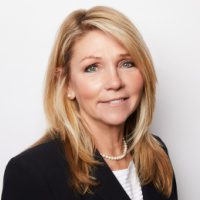
Michelle Moore leads GAF’s Supply Chain Planning and Operations, Procurement and Supply Chain Risk teams to drive process optimization, functional excellence and improve supply chain resiliency. Michelle has more than 30 years of supply chain and business transformation experience as well as extensive experience leading global cross-functional teams. Before joining GAF in 2022, Michelle held several positions at The Chemours Company, a global leader in industrial and specialty chemicals, including Chief Procurement Officer and Chief Transformation Officer. Previously, she spent over 25 years at DuPont in a variety of business and functional leadership roles, including Regulatory Affairs, Technical Marketing and Ore Ventures. Michelle earned a BS in Marine Science and Biology from East Stroudsburg University of Pennsylvania and a MS in Environmental Science from Drexel University. Connect with Michelle on LinkedIn.
Hosts
Additional Links & Resources
WEBINAR- How Collaboration, Tail Spend Management, and VMI Can Improve Up and Downstream Communications
